|
 Football Manager Football Manager! Man’ing those Foot Mans! Figuring out tactics. Signing players. Winning international trophies with some of the most athletically skilled and highly paid sports stars in the world, or, looking after a bunch of carpenters and barmen who spend their teens, twenties, thirties (and sometimes even forties) competing for the highest accolade of least hungover goalscorer in the 10th tier of English football — “We’re footballing geniuses, superstars! compared to those 11th tier losers! Get your round in, lad!” Football Manager is often considered, by those who play it, the pinnacle of spreadsheet games. Except, of course, they don’t call it spreadsheet gaming. Many who play Football Manager are doing so on a work laptop, their only other computer a PS4 to pour money into FIFA microtransactions, and they may never look at another game in their lives. It’s a lifestyle for many players, not necessarily “gamers” but people who’ve clocked up thousands of hours in each yearly release, making their “I know better than professional coaches” dreams come true. 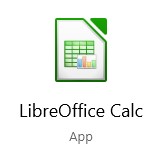 What is this LP? Like all true spreadsheet games, the story comes out of seeing the numbers you’re looking after interacting in the game engine. I will be telling the stats’ story. Players have stats, coaches have stats, the scouts finding you new players have stats, your physios have stats, you have stats. The stats can change, they can jump up, nosedive down (say, after an injury), the 16 year old with a stat that says he has the potential to be a world-beater might never develop because his attitude stat says he has the ambition and professionalism of a Monday morning. You look after these stats, then, once or twice a week, your looking-after-the-stats combine with your telling-the-stats-what-to-do in a football match, in various competitions rendered for your viewing where you can yell-instructions-at-those-stats and eventually see if these absolutely-useless-stats can pull out a win, although it’s more likely to be a loss or draw. Because, much like your useless-stats-players, you’re a useless-stats-manager, just without the excuse of having no free will or sentience. This is a narrative LP. I will be taking all those stats, looking after them (“Managing” the “Football”) putting them through the game’s engine, then using what pops out as the base for a story that will make sense of what those numbers are indicating.  Please excuse how Aine looks. FM has a problem where it randomly changes sliders on the create-a-character once you get in game. There'll be a proper picture of Aine in the first update. You will follow newly appointed manager, Aine Bruton, from her part time job working on a golf course, through the highs and lows of coaching Tunbridge Wells in the pits of the English footballing pyramid. Will she get Tunbridge Wells promoted? Will she stop her players from skipping training to go to the cinema with a bag of Maltesers and an ice-cream? Will she be fired after three games? Will her skeevy boss hang her out to dry after it turns out he bought the football club as a money laundering scam? All this will play out as I use my imagination to tell the story of grassroots football, where the concerns are less which wonderkid do we pay £100m for, and more, if we don’t find £100 the players aren’t getting paid.  Game/Save Details/Game Challenge This particular game features an expanded database. Sports Interactive (the developers of Football Manager) include leagues in the game down to a certain level. Modders and database editors create database edits that allow you manage in the leagues where even fielding a team might be a challenge. These are leagues with low pay, sometimes no pay, and with low and no pay as soon as anyone looks halfway competent they’ll be snatched up a team that can guarantee them things like changing rooms that get cleaned and showers that have hot running water. The league I will be managing is where the players who have real lives and jobs play. They train two afternoons a week, they take half days from their careers to play games, they convince themselves that they’re actually quite good and if they had the time as a sixteen year old to train a bit more often they’d be a superstar (or they just like kicking the ball around a pitch, and sometimes other people around the pitch, to counteract all the crisps they eat.) Aine Bruton will, maybe, be taking Tunbridge Wells all the way to the top, or, more likely, she’ll have to find a new pub to drink in because all her players seem to be staff in the place she went before. And now they’re bothering her about things like tactics, buying jerseys that fit them and don’t smell, and letting them start in a game. Let’s see how she fares, as we let’s play.
|
|
|
|

|
| # ¿ May 11, 2024 12:12 |
|
The Pub Part of this narrative LP (at least after a few days) has been Áine Bruton going to the pub, talking football with the patrons, and generally getting pished. The patrons in the pub have been posters in the thread. When people respond to the thread, reacting “in voice” to what’s happening with Tunbridge Wells, I’ve integrated that into dialogue and conversations that happen in The Other Shoe. It’s a bit of interaction, and a bit of fun. If you want to be featured in these scenes in the pub (and I can’t guarantee it’ll happen) could you let me know when you first post. I’ll try and keep track of it. Could you also let me know if you don’t want to be featured. I’d appreciate it if you let me know what name you’d like me to use for you (anything unwieldy is liable to be changed, including unwieldy forum names.) Finally, please let me know what pronouns you’d like me to use for you. I have no issue with someone choosing a “they” pronoun, but it’s not what everyone wants, and I can’t know unless you tell me. Mrenda fucked around with this message at 16:00 on Jan 13, 2021 |
|
|
|
It Begins I had to leave my boozer. Everyone was looking at me. Everyone was talking. Up until last weekend I was an assistant greenkeeper on a run down golf course. It was a fine job. I was up just after six to cycle to the course by 7.30am and I was finished by 3pm. Then I could cycle to The Sheep’s Head, get a few drinks, sometimes more, in a place no-one bothered me. I’d have my fill, watch the racing, and cycle home with chips in my basket. I’d make sandwiches for the next morning and have another few beers before bed. I’d pass out. The boss on the course was some red faced fat man who spent his time entertaining in the clubhouse when he was back from living in his second home in Florida. I don’t know where he made his money. Certainly not from green fees because I never saw anyone play a round outside of the few sunny days we got and the school breaks when kids would play for a reduced price. Me and Teddy were sitting in the shed, it was pouring outside, when Mr. Red Faced walked in. “Sir!” Teddy said, as he stood. I stayed sitting. The boss looked at me, not too welcomingly, back at Teddy, growled at Teddy in the way decades of cigars and brandy make throats and lungs, then looked at me. This time with a smile on his face. 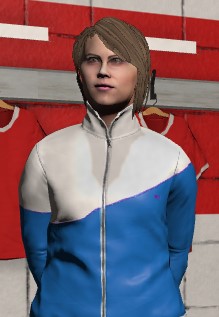 That’s me; Aine Bruton. “Business degree, right?” he said, still smiling perfectly straight, perfectly white, American style teeth at me from between fat porcine cheeks. “Eh...” “Head of clubs at University?!” “I don’t know—” “Father a footballer!” “He was a cu—” The fat man growled again at Teddy, although more a hack, then turned back to me. “How do you know—” I tried to say. He interrupted. “Your CV, and a memory. I remember everything! I know exactly who you are. I knew we were getting a star with big things in her future, but lacking confidence, when your CV came across my desk. Most championships from trampoline club, to table tennis, to football, to that senseless handling balls so-called Irish football while you were president.” “That was ten years—” “You’re going to do the same for me.” His voice had the crunching gravel of a quarry to it and he looked much like a dumptruck with a thick gold chain around its cab. “That football club, boss?” Teddy asked.  What I would soon learn was this was the club I was about to manage. The club my shady boss had bought, and decided, "We need a thirty-something year old washout who never used her business degree and instead cuts grass on a golf course to take charge of." “Signed and delivered. Got rid of the chaff, brought in some superstars. We’re sorted.” Teddy might as well have cheered so delighted was he looking. The fat boss man looked at me again. “£450.” “What?” “That’s £150 more than you make now.” “What’s going on?” “Fine, glad that’s sorted. You know I own The Sheep’s Head.” “You do?” I said. “Meet me there at 4pm. We’ll sign the papers. There’s a bottle of champagne waiting, to mark the occasion. Then to training.” And that’s how I learned my local boozer was owned by my gammon and gold boss, and how I was the new manager of Tunbridge Wells Football Club, in some Mickey Mouse division, all because I’d been the student rep in charge of sports for the most successful two years in my regional college’s sporting history. And I’d only signed up for that because there was an equestrian club who rode out of the local trainer’s yard giving me tips for the nearby track. I made a few quid from it, too. Which is why I knew, when I was shown into the football club buildings, into my office, and opening my desk, that this was all a giant tax scam, and I was the patsy.  With a wage budget of £311 a week, I was signing over £288 a week to just four players. The first thing the fat man did was make me sign the wage slips of the few star players he’d brought in. There was no evidence of accounts anywhere but I signed the wages for four semi-pro players and the entire team’s non-contract wages, and when I protested I was reminded I still needed my greenkeeping job during the day. “Make the best of it Aine,” he told me. “Top of the league is what I expect. Or near the top. We have the superstars. Good young lads. I know them well, or at least their Dads. Knew them since kids, really. Good lads,” he trailed off. “Good business,” he muttered. And then I was ushered out onto the training grounds to greet my team; most of whom were the young staff from The Sheep’s Head and their various hangers on. The serious players, unlike the young fellas in Aldi sweatpants and trainers, were decked out in the proper kit. “You’re the boss?” one of them asked. I didn’t want to say anything, but when Dim Trev, who’s only job in The Sheep’s Head seemed to be running to the bookies for people, stopped kicking the goalpost to clear mud off his shoes they all quietened and looked at me. “I guess I am.” I guess I had no choice. So I thought back to my Dad taking me to his clubs when I was a smallie and ran them through some drills. Watching them, lost in my own mind, it was only after ten or so minutes I heard my gammon boss’s voice penetrate through my foggy skull. He was screaming at the young fellas to look lively, and saying he’d throw two bottles of Glenmorangie behind the bar if they gave it their all. They all laughed while the guys earning somehow-dodgy money were doing sprints. That’s why I had to leave my boozer. They were all in on it. All those young fellas knew exactly what kind of pub it was, exactly who the owner was, exactly what was paying their wages (and the source of this I’m not sure myself) and I was the unwitting fool it was all being run through. I’d have to make the most of it. I’d not find another greenkeeping job if he blackballed me. I didn’t know what our “star players” were getting out of all this, even if they were only young lads, and I didn’t know precisely what type of scam this all was. 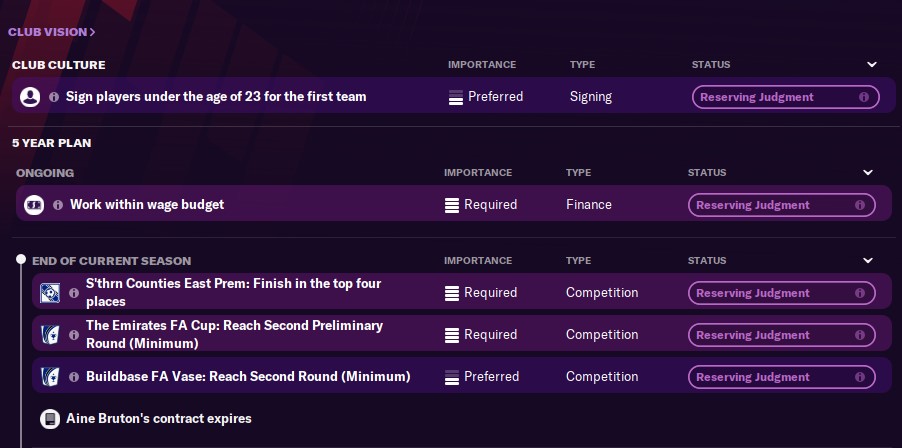 Sitting in my new pub, this was going through my head. What I was supposed to achieve, all with the help of a bunch of scam artists. All I knew was I was expected to bring this team, mostly of chancers sourced from my boss’s enterprises, with his few star players on big money, to the top of the league, or else face scrutiny of why, exactly, I was funneling unknown cash through an unknown bar to unknown players in a team run by me, an unknown manager, with nary a coaching qualification to my name. I was in at the deep end. So of course I had to find a new boozer where I could get some peace, one not run by a criminal boss, and my new spot didn’t even show the horse racing.
|
|
|
|
What The Hell Do I Do Here? Growing up there were always adults who had keyrings with what seemed like an entire hotel’s worth of keys attached to them. I never knew what they were for. At the golf course our tractors started with a screwdriver, I didn’t drive, and my bike lock had one of those spinning dial mechanisms; the only key I had was for my apartment. Being appointed manager of Tunbridge Wells changed my keyring status. It now boasted keys to get into the stadium, the training grounds, the changing rooms, the equipment room, the locks to the shipping containers that held god knows what, the office section, and my office. I had made it to the big time and it seemed the big time was very jangly. I thought that was the end to my metallic growth, sitting, as I was, in my new manager’s office when a young scrap of a girl stuck her head in. I’d seen her cleaning glasses in The Sheep’s Head before, but this time she introduced herself. “Hi, I’m your assistant!” she said. “I have an assistant?” I asked. “I’m Maria. Maria Farrell. You should set up a password.” I looked at my computer and on a post-it stuck to the screen were the words, “P/W: football1234.” “I’m not full time, but I pop in every so often. I can get my uni work done in here. Oh, and here’s the keys to the filing cabinets.” So, then, my keyring grew. It was now weighing me down with responsibility and access to files that would have to be destroyed should the tax man raid us during some rainy morning training session. I held back from asking Maria where the shredder was. “Do you know anything, about, eh, what I do?” I asked. “I was just told to help you find some staff.” “Staff! Great!” Staff would mean people around me who actually knew something about anything football shaped. And it made perfect sense to tell Maria we could hire staff, not me, the actual manager of the club. “There’s a database with people looking for jobs. I was looking through it, there’s some impressive CVs on it!” she said.  All the staff, some who want clubs, some who clubs want, all, pretty much, out of our reach. So that’s what I did. I looked through a database for an assistant manager who might know the first thing about coaching a football team. There were guys who listed their qualifications, their skills, what they focused their career on, former managers moving down the ladder, coaches who wanted to move up. And every single one of them was far too qualified for us. Eventually I found someone who‘d just started coaching, with some history of playing, and rang his number. It was a testing-of-the-waters. I’d never hired anyone before let alone someone in football. He picked up after a few bleeps of his phone. “Hi, I’m calling from Tunbridge Wells, I saw you were looking for a football job?” “Where?” he asked. “Kent,” I said. “Tunbridge Wells.” “Never heard of you. What division are you in?” “Eh, I’m not quite sure.” I heard him laugh. It was one of those nasal snort laughs. “And who are you?” “I’m the manager here,” I said. “And you don’t know what division you’re in?”  I checked after, we were in the English Southern Counties East Premier Division, something I doubted I would remember. “I’m new,” I said. “You’re Davie’s bird aren’t you? This is a wind up. What’s you’re name? Allie? Allison. Well tell Davie to gently caress off!” Then he hung up. I tried a few more people, this time with a little more success actually knowing what division we were in, but they all wanted more wages than we could offer, if they’d even hear me out once I mentioned who we were.  Alexander Crossley, the only candidate who’d even give me the time of day. Eventually I did find one person and when I phoned him we got to the point of discussing reasonable wages. Very reasonable. I think he wanted £5 a week, which wouldn’t even cover petrol costs, so I wasn’t sure what I was getting into, meaning I had to clarify things. “You are ready to be an assistant manger, are you?” Which were some deft interviewing skills from me, but really I’d take anyone. “Assistant manger?” I could hear the awe in his voice. “Then I want, mmm, £65 a week.” I can’t quite recall, but I’m fairly certain I shouted, “DONE!” down the phone to him. I could hear the smile behind his tone as he simply asked for a few days to consider things.  I guess interest breeds interest, now it seemed every club wanted Alexander Crossley. We both hung up and I thought at least I’d have someone with half a clue around me. When I looked at his profile on the database again, after spinning in my chair a few times, his views had skyrocketed. It seemed within minutes of me making an offer he’d made it known to half the country. There were a load of clubs interested in him. Which made sense, he might be useless at judging players, but he had a history of working with and developing youth players. He’d be great, as I was thinking, taking temporary charge of our juniors while he also helped me. It was then Maria popped her head in again. “I heard you yell,” she said. “I thought I’d signed an assistant manger. But I guess not. No-one wants to work with us, and anyone who does wants wages we can’t afford. I’m not even sure what wages we can pay, but I don’t think an assistant manager should be making more than me.” I left it unsaid between us that any assistant manager would probably be more qualified than I was. “The players’ contracts and wage structures are in the filing cabinets. That might help.”  What we’re supposed to have when it comes to staff, with a very lonely, “1” for what we actually have. Me. Which meant I had to do some digging. Me and Maria pulled out page after page of printouts and spreadsheets. We were supposed to have a lot more staff than I realised; assistant managers, coaches, physios, scouts, and we had none.  It was turning out my assistant was far more efficient than me. As soon as I’d asked her she had the ads placed for the new staff, and emailed me confirmation of the search within minutes. “I don’t think I’ll be able to find people to fill all these roles?” I said. “I can place ads for them. We might get local guys who actually want to work here.” “Do that,” I said, and Maria headed out to her little cubbie outside my office. Which is when I spotted our player contracts.  To my horror it turned out we weren’t paying four players £300 of our £310 budget, but only two players a split of the £300! Looking through the contracts it seemed only two of our star players were actually signed to us. The other two were playing week to week. Reading the details it looked as though any club could snatch them with absolutely zero compensation to us. I didn’t need players being poached. What I needed were more players; players who took our games seriously, unlike the guys hauled out of the pub, the clubhouse and The Fat Man’s quarry. The Fat Man who’d predicted our top position entirely based on these “Superstars.” I didn’t know what he was up to, but I expected it was something to do with showing them off in our team, then moving them onto other teams where they’d earn better cash purely on their promise, i.e. their playing-status, with us. We were middle-men doing favours for his pals. 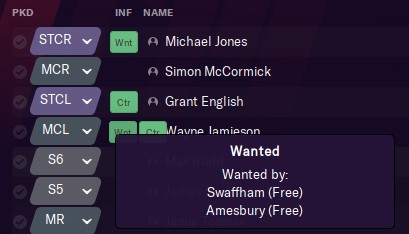 Wayne Jamieson, who the boss told me was one of our, “Star Players,” was a wanted man. I went back to the database and looked up our star players’ names, not knowing if they’d even be listed, but there they were. No indication of their skills or abilities, just their names, wages and contract status. And other teams were already checking them out. I’d gone from worrying about having no staff to help me, to maybe having no real players. I didn’t even have anyone to advise me on where I could find replacements; and not just the kind of temporary players the Fat Man pulled from his business-empire staff. Even then I didn’t have a wage budget to pay new players, new players who might, just, be loyal to me. Our first game was only a couple of weeks away, and I was already on a loser.
|
|
|
|
The Travelling Grifter Before I even began to think about tactics, I had to see what our players were made of. 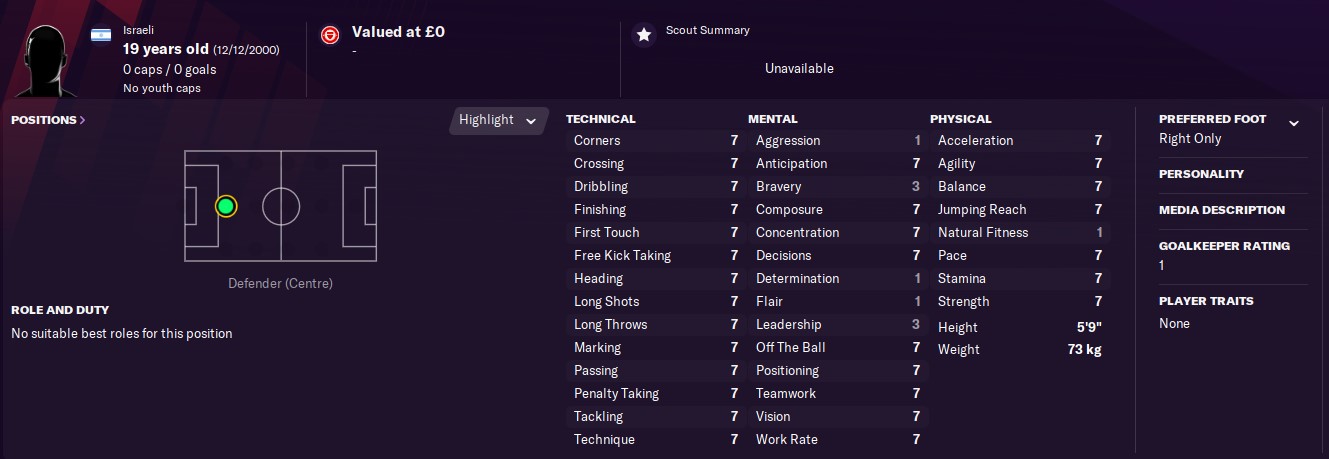 The guys the Fat Man pulled from his businesses were all like this, capable of kicking a ball but no stand out abilities. Cookie-cutter messers sourced from who knows where? The guys the Fat Man pulled in from his grifts mostly seemed to be made of chicken wings and Monster. It didn’t matter where you put them on the pitch, they all played pretty similarly, i.e. they were the packet sauce you had on your badly cooked £1.29 sinew and skin. They did have preferences of what positions they’d like to be in, so I just went with that. Why upset someone by playing him where he doesn’t want to be played when you might get an extra ten percent out of him by indulging him? It was the “Superstars,” as the Fat Man put it, I needed to pay attention to. Two were strikers, two were midfielders (I would have liked a goalkeeper who didn’t play with his shoelaces undone, but I guess that’s a lot to expect when football boots don’t come with velcro.) But what most surprised me about our superstars was they weren’t just kids. Michael Jones and Simon McCormick were young, 21 and 18, but the other two lads? Grant English was 29 and Wayne Jamieson was bloody 39! 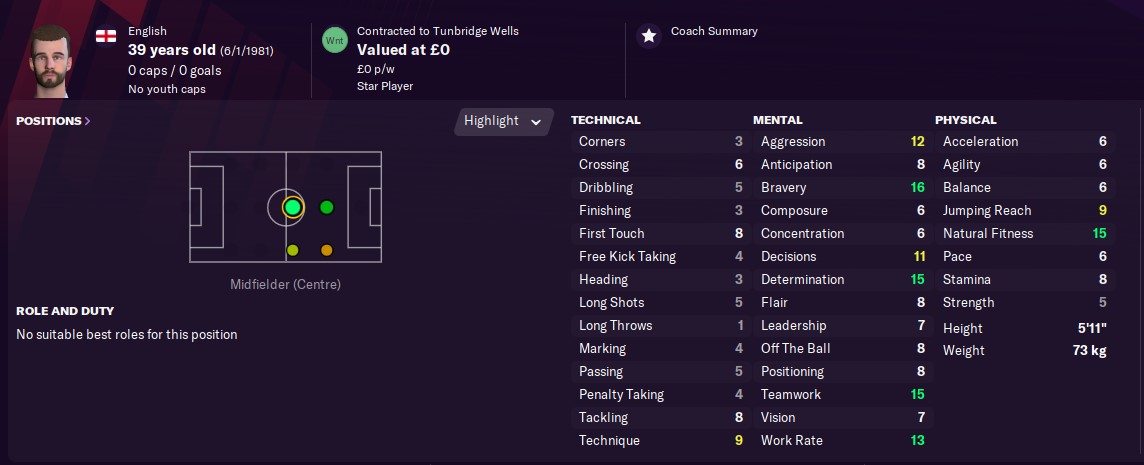 With the ball at his feet Wayne Jamieson wasn’t much better than the chancers from the pub, but he was constantly striving during training. I guess that played out in how they performed during training sessions. Jamieson wasn’t the most skilled, age will take a bit of ability away from you, but he had a solid head on his shoulders. It must have been the baby soft skin surrounding his beard that fooled me into thinking he was a young fella. 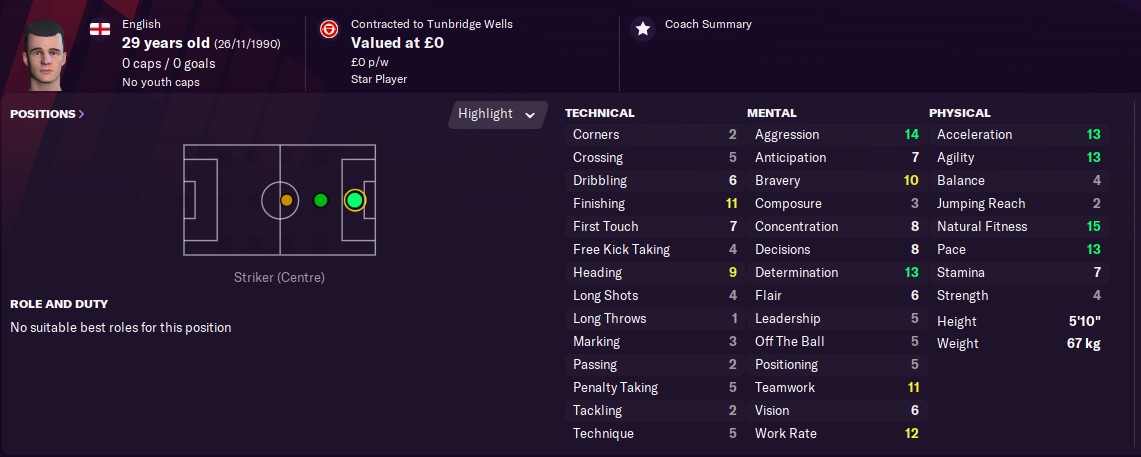 Grant English, at 29, was at his peak, the only problem was even at his peak he had some glaring holes in his game. Grant English could slot the ball into the net easily after sprinting behind a defence, but put any pressure on him and he tripped over his feet, he had absolutely no composure! Both English and Jamieson were on week-to-week contracts, Jamieson with interest from other sides, so if I wanted to keep them I’d have to tie them down, but how could I do that with no money left in my budget.  £190 a week for Michael Jones, plus appearance fee, plus goal bonus (although goals would be good.) Who negotiated all this!? There was also interest in the 21 year old, Michael Jones and he was tied to us, although we were paying a ridiculous £190 a week for him. Almost two thirds of our entire budget. The problem for me was I had no idea how much these guys should be getting? Was £190 an average wage for our league and our budget was just low, or was this another part of The Fat Man’s strange relationship with money? I thought about starting negotiations to keep English with us permanently but I was in two minds about it. If I started discussions, just to find out the attitude of our players, and it went south I might lose him faster than I anticipated; he’d be ready to leave. If he agreed then I’d be stuck with someone I wasn’t entirely sure I wanted. He was very fast on the pitch, and could head the ball almost exactly where you needed him to—a perfect tactic for hoofing it forward when you have useless players—but the lad could barely jump to get above the opposition. Everything had to be set up perfectly for him, especially as he wasn’t very tall. My contract negotiation problem was I couldn’t do anything until I had an idea of the state of our finances, or at least the basics of them. I knew I needed to dig into the accounts. I stepped outside my office door and looked to see Maria hunched over her laptop. “You busy?” I asked. “No,” she said. “I mean, ‘no with work,’ I’m deep in databases at the minute. My Open University course.” “Computer course?” “Kind of, Business Information Systems; business and computers.” “Do you think you can either business or computer your way into our money situation? Some spreadsheet or something?” “I’m afraid not,” she said. “It’s the accountant who deals with all that. I just hand out what he sends to us.” She slid open a drawer, pulled out a little black lockbox, and set it down in front of her. “And who have you been handing out money to?” “The players,” she said. “Petty cash. And money from the accountant for Mr. Laws.” I must have looked puzzled, he wasn’t one of our players, I wasn’t sure I’d ever met a Mr. Laws. “The boss?” she continued. “The chairman?” I didn’t mean to, but it was an instinctive response and the words, “Yes, The Fat Man...” snuck out of my mouth. “Aye! Peppa’s Dad. Daddy Pig,” she said. “Why are you giving him money?” I asked. “He says it’s for scouting,” she said. “He goes to look at players. The envelope is fairly thick when I hand it to him.” I nodded, went to walk to my office, then turned around again. “We’ve ads placed for scouts, don’t we?” I asked. “Yep, but no responses yet,” she said. “So this isn’t his money, it means we have a scouting budget?” Maria was already reaching for the phone on her desk with a sneaking smile on her face. “The accountant’s number is stored in here,” she said. And within minutes I was talking to a man with the most dull voice at Chorley, Chorley and Strunk that revealed at least one minor scam as part of the foundation of the whole football club.  A big chunk of cash set aside for our ‘Scouting Budget.’ I wasn’t certain I could do it, but after a rambling ten minutes from Mr. Strunk of the Dull Voice on financial responsibility in the Lower Leagues, season ticket sales, community outreach, and not over-stretching the core underlying cash flow of a bottom division club—which will always struggle for liquidity—I broached the subject; why exactly did we have such a large scouting budget. “To find players, of course,” he said, laughing at the foolishness of a first-time manager not even knowing about finding players. He had a simple enough answer when I asked him how we would pay these players we found if we had no wage budget. It began with a soft chuckle, then a few minutes explaining the double entry system in basic accounts, before finally he got to the point. “Our scouting budget is related to our transfer budget, which partially funds our wage budget. It’s very simple, one adds to the other, which takes from the next, especially if you make a transfer, not a cash transfer in the balance sheet,” he laughed again, an accounting joke I guess, “but a football transfer, where money comes in from another team for one of your players. I can’t believe you don’t know about transfers, you, the manger of Tunbridge Wells.” I could hear him sucking his teeth in disgust before he continued. “So we simply transfer a figure from the Scouting Budget into the Transfer Budget should you wish to buy a player from another team, but if you’re signing a free agent you can transfer your Transfer Budget to your Wage Budget.” 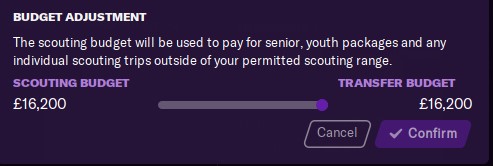 A bit of money from our Scouting Budget to our Transfer Budget. He rounded it off by saying Mr. Laws had been doing a fine job of scouting up until now, if the outgoings were anything to go by. But if I was to manage things he’d be happy to switch a few zeroes around for me, just as he did for Mr. Laws.  And that money from our Transfer Budget to our Wage Budget Not wanting to completely tap out Daddy Pig’s tax free travelling fund, and draw attention to me, I had Mr. Strunk transfer half the scouting budget to the transfer budget (we would still, sometimes, need to scout, I guessed.) Then money from the transfer budget to the wage budget. With that I had some wiggle room to pay players. It was getting on, and I’d spent most of the day pushing a lawnmower so I was tired, but now I had the ability to maybe sign our non-contract players, maybe bring in a few others instead, so all in all it was a good day’s work. I was going to wait until our next training session before broaching the idea of contracts with the two guys with some skill, but, most of all, I wanted to wait until we had some more coaches at the club who I could turn the football business over with before I made any permanent decisions. The question was would we have anyone come into coach with us before our first match; our first match which was rapidly approaching.
|
|
|
|
The Other Shoe – 6:11pm The Other Shoe was quiet, at 6pm. Bars with dark lighting except above the fag-burned pool table (when did the smoking ban come in?) weren’t the kind to attract the “Let’s go for one after work!” crowd, but it did do a beer and a shot for a reasonable price. Three of those combos must have been why I opened up about my new career, something I was making a habit of since I found my new haunt. “He’s not signed,” I rambled to the barman. “Just playing week to week. But other teams are interested in him. That must mean something!” “What about the other fella? He seems solid, good football head?”” the barman said, pouring himself a whiskey of his own. “The 29 year old or the 39 year old?” I asked. “The younger guy has a bit of skill, even if he does crumble when presented with a chance. It’s the 39 year old who’s a bit crap skills wise but can stay resolute when things aren’t going our way. That has to count for something?” The barman nodded, knocked back his whisky, then poured out some more; three shots; one for him, one for me, and the final one for the only other customer sitting at the bar. “It’s a toughie, isn’t it?” he said, as he placed the bottle down on the counter. “Get that down your neck, on the house!” I looked at the label on bottle. Don’t look a gift horse in the mouth, and all that, but this one caught my attention. Especially as The Famous Grouse isn’t noted in Scotland for being a top shelf blended whisky, the opposite in fact, so I wasn’t quite sure what The Famous Mouse would be like. “What do you think, Rarity?” the barman said, placing the shot in front of young lass sitting just a few seats up. “Kick the 39 year old to the curb imo, far too old to handle the rigours of seventh division semi-pro football,” Rarity said. “Aye. I think you’re right. Except it’s ninth tier semi-pro football, maybe? I’m not sure. Not that it changes much.” We all raised our whiskies and with disgusted faces knocked them back. “Fine drink, that,” Rarity said. "Up the Wells!"
|
|
|
|
The Biscuit Tin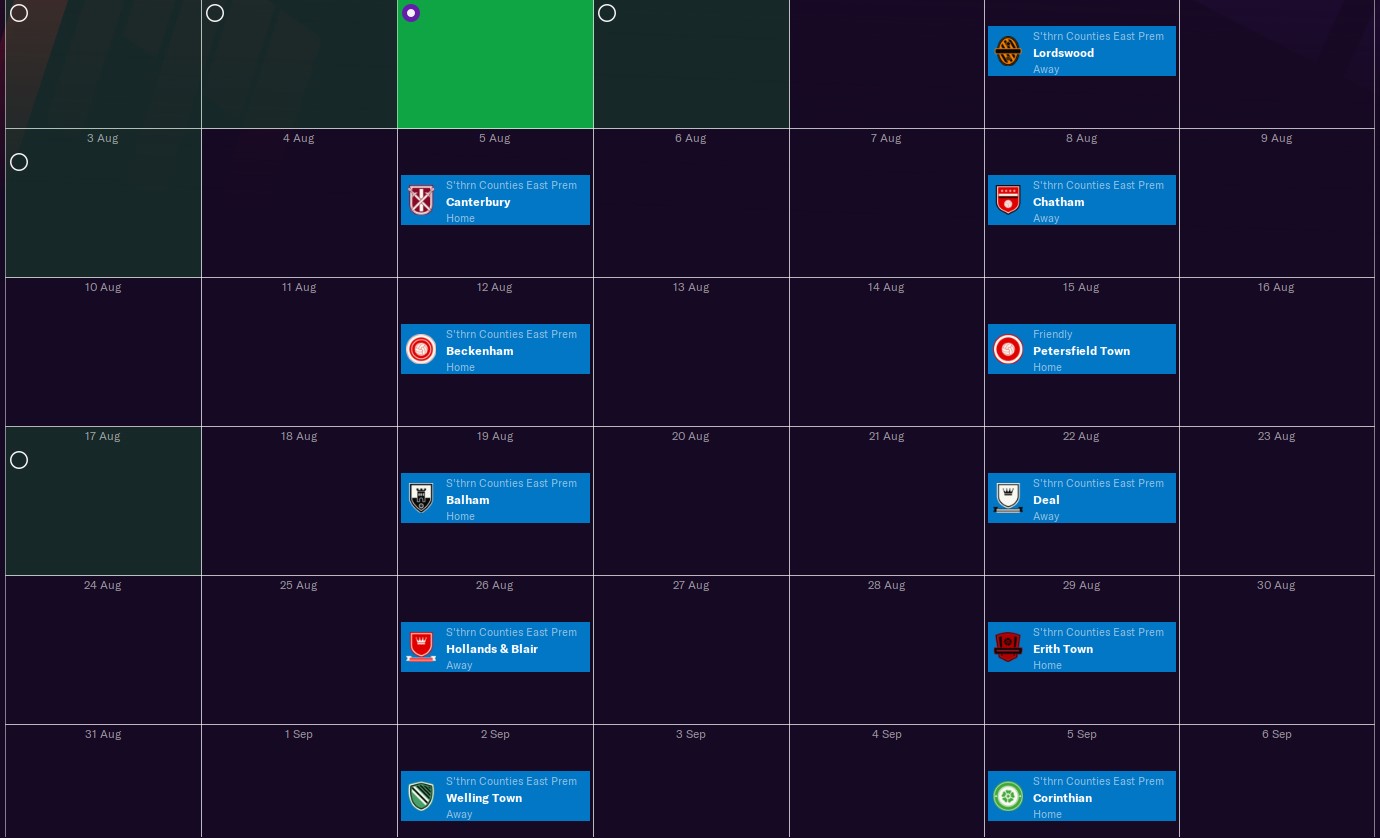 Me, staring at the calendar, with nothing really achieved in training, just six days to our first match, then two matches a week after that for more than a month. It was the Sunday evening before our first game and I was focused on the calendar. It was a strange feeling, looking at it. On the golf course we just pottered about. Sure, we had work to get done, cutting the greens six out of seven days was just how it went, at least during the summer, but other than the particulars of the weather and growth season we dealt with things as they came. With Tunbridge Wells we had a series of matches, two a week, stretching for over six weeks. The lads would be absolutely shagged, if they stuck with us, which was based on an assumption their ligaments didn’t snap from such a strenuous spell, and this was straight off a measly ten days of preparation before the league kicked off. With The Fat Man throwing me in at the deep end we’d really not had a pre-season. If he’d given me six weeks I would have had us playing friendlies out the wazoo, then given the players ten days off to recover before we headed into the twice-weekly matches, but it wasn’t to be. I was in pain thinking of the damage of no pre-season despite me not having to play in any of our upcoming games. I would only be crouched on the sideline—I didn’t know if we even had dugouts; our setup was less “semi-pro” and more “half-witted”—and I wasn’t to be the one running up and down the pitch. It was that pain-in-anticipation, sticking around in my joints—despite a few beers—that brought me to the biscuit tin in the cupboard high up in the kitchen. In the tin there was Deep Heat for my muscles, a selection of paracetamol for hangovers, and Ibuprofen and Solpadeine for when my body decided I was failing my maternal imperative. These were all helpful but they weren’t Teddy’s friends. Teddy’s “These Might Come In Handy!” pills were for his back, and from the few times I’d taken one I guessed the man saw a vet for his aches, not a doctor. 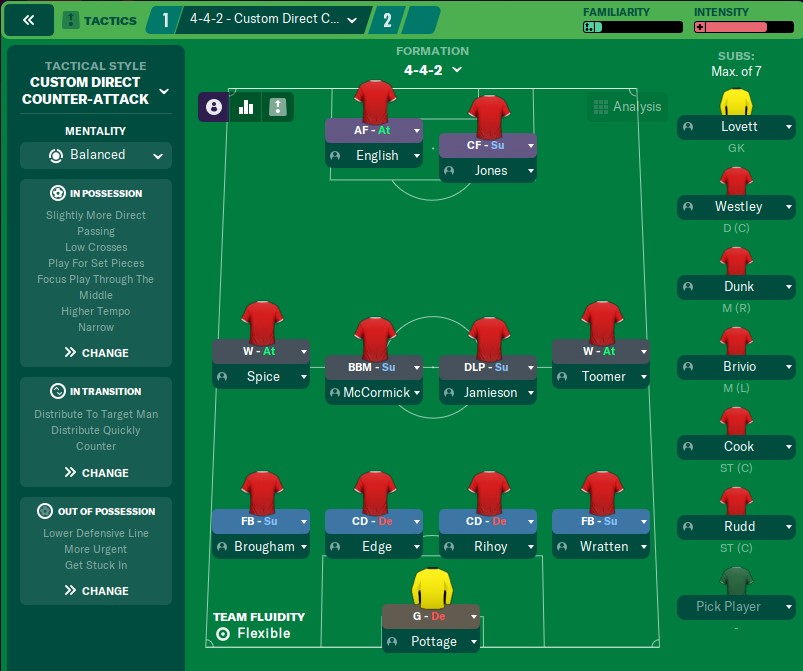 Our primary tactic. A bit of wing play with two forwards being hit low balls, and an instruction to get it forward. Fifteen minutes after chowing down a pill, with another beer, I was back looking at the tactical plans I’d drawn up as our main offensive drive. Whatever I’d done it was genius. Not quite, ‘lump it forward’ but definitely a bit of directness, low hit balls to our forwards’ feet—seeing as they were useless in the air—and high tempo, direct-ish counter-attack. I was in awe at my abilities; I wasn’t being completely negative; there was some ambition to it—seeing as we were predicted to do well in the league—and I was giving the team a chance to show their skills. That’s when Teddy’s elephant drugs hit. Or maybe when they hit fully. My stomach began to churn and I frantically flipped the page between our primary attack-focused system and our secondary defensive minded one.  The classic, ‘we have zero skill’ tactic or at least how I thought to recreate it. Both of our approaches were 442s, the most adventurous you should be with a bunch of plodders, but this one was even more direct than our main attacking one. Two lads standing up front, funt the ball up to them, hope for the best. And it was all hope, my lads could barely jump to compete. Still, the problem I was facing hadn’t changed with me horsing back tranquillisers; we had no pre-season; the team hadn’t played together; and it was six days before our first match with more matches coming thick and fast after. We were staring straight into failure. 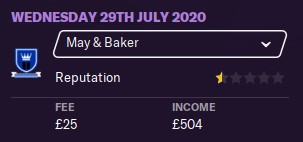 The last minute friendly I proposed, off my tits at 9pm on a Sunday night. Being the acutely minded high person I was, I did what could only be done after a six pack and a loving-huge-pill at 9pm on a Sunday; I rang around smaller clubs seeing if we could arrange a friendly for the Wednesday, three days before our opening league match. Things being the way they were (i.e. it was a Sunday evening), none of the calls were answered, and none of the mobile numbers I dialled were set up with answering machines. Except for one.  What was going to be our first match! Waking the next morning I had to scrape gooey spit off my lips as soon as I peeled my face back from my couch, but, ever the professional, Maria had emailed me to say May & Baker had accepted our Friendly Proposal, and, with a groggy head, I was thankful no-one was mentioning what must have been a rather slurred phone call.  No Fancy Dan strength and conditioning training for us, all match preparation, all the time. We had two training sessions before the friendly, and I had the lads focus on the only thing they should focus on, preparing for matches. With only four sessions in the week I couldn’t be building up their fitness—I’d have to rely on what they naturally had—nor could I work on improving their skills. I had to bed them together and get them playing like a unit. The sessions before our friendly were laughable. We even had less players than we had the week before. Whatever novelty there was in The Fat Man telling his barmen to play for his team must have worn off. We wouldn’t even have enough players for our bench in the mid-week practice game against May and Baker. Nor, it seemed, would we have an assistant manager, coach or even a physio. All in all, the floating feeling of Teddy’s back pills was more appealing than what I was facing into, even with the nausea they brought on and the general failure of proprioception.  I must be far more astute than I give myself credit for, signing the papers it looks like I’d negotiated my Assistant Manager down to only fifty quid a week, for which I felt a little guilty. I was gearing up for my first match in charge later on in the day I’d taken off from the golf course, when, to my surprise, Alexander ‘The Absolute Legend’ Crossley pulled up to the training grounds, beeping his horn. He looked exactly like he did from his profile in the big football manager database. “You’re here just in time,” I said, my smile big and wide. “Why’s that?” he asked. “We have a match today.” “When we talked you said we’d be kicking off straight into the season, no time for friendlies.” “Yeah, back pills are a strange lot,” I said. Then, changing the subject, “At least it’ll be good to have some support in the dugout.” “So, what’s the team like?” he asked. I must have had a pained look on my face as he said that because he just grimaced and continued, with a little cough, “Well, I’m sorry about your dodgy back. Maybe we can get you a bucket?” 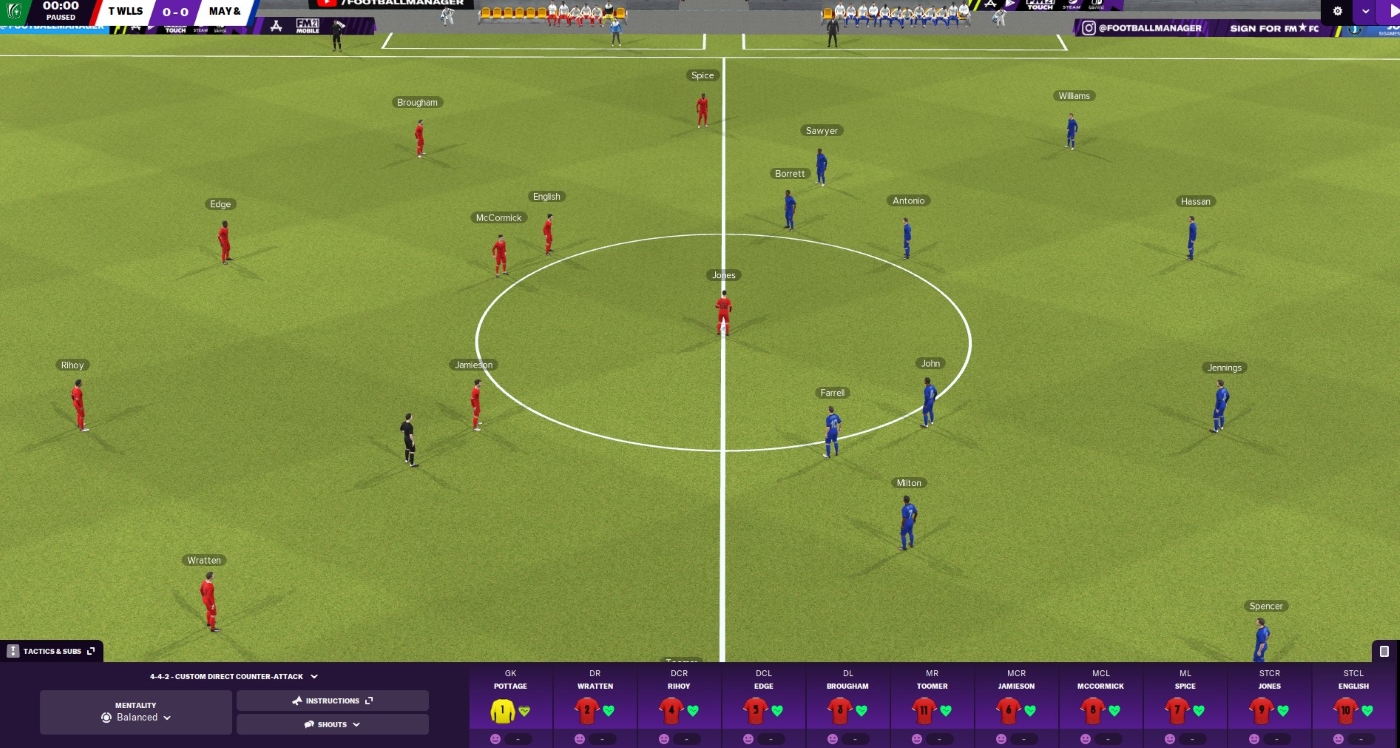 I didn’t get an upturned bucket to sit on in what seems like our Eastern-Bloc concrete stadium but I did get a strange sense of pride as my first match—even though a friendly—kicked off. As the game began the nerves I’d been feeling all day subsided. This seemed like exactly what I was meant to be doing. 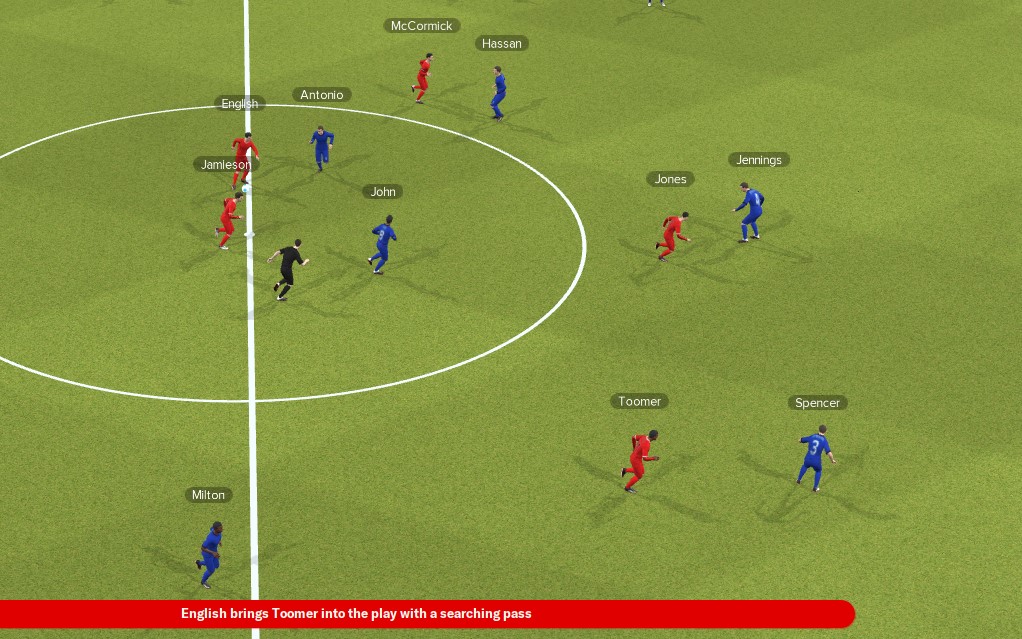 A great through ball from our striker Grant English to The Fat Man’s Toomer. The lack of nerves could only last a few minutes, though, with our attacks turning into mistakes and May & Baker coming at us; constantly at us. But when Grant English put a great through ball into the channel in front of one of The Fat Man’s lads, Toomer, I felt my chest fill with relief. My team actually had some ability, even if Toomer did hit it straight at the keeper. With twenty minutes gone we were finally showing something steady as Simon McCormick, one of our proper players, won the ball in the middle of the park, played it onto Michael Jones running forward, who then centred it for Grant English splitting the defenders. It was my ‘star players’ coming together, even if it ended with another straight-to-the-keeper shot; we were showing a bit of cohesion. 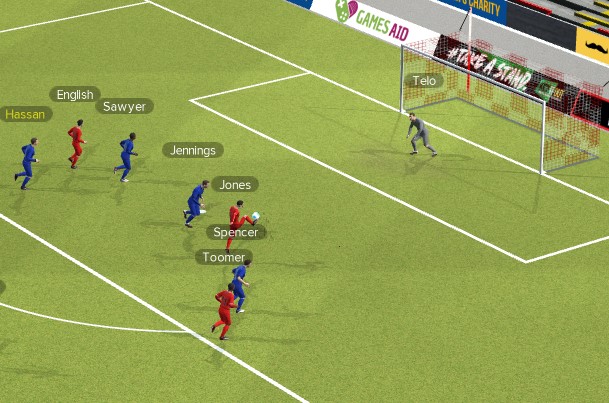 Our first goal and I had a relieved smile on my face. With 37 minutes gone we’d been dominating for the past twenty and were on for another attack. Wayne Jamieson, who hadn’t been playing great, sent the ball to the wing and Brougham put the ball crossways over the defenders to Michael Jones, our £190 earner, who placed it calmly past the reaching keeper and into the net. It was our first goal and my smile was as calm as the touch from Jones that finished the move off. We made it to the break one-nil up which made half time a simple affair; I just stood in the centre of the changing room and said a few simple words before leaving the players to their own thoughts, “I’m very pleased with your performance.” — I wasn’t, not fully, there was a lot of room for improvement, but they needed some confidence and I was, at the least, quite relieved at having scored. Simon McCormick, our young 18 year old midfielder bagged another in the second half, right on the hour mark, after English laid a square ball onto his toes for an easy tap in, but it was only ten minutes later when we conceded to a nicely struck free kick: our goalkeeper’s untied shoelaces proving a problem outside of training. 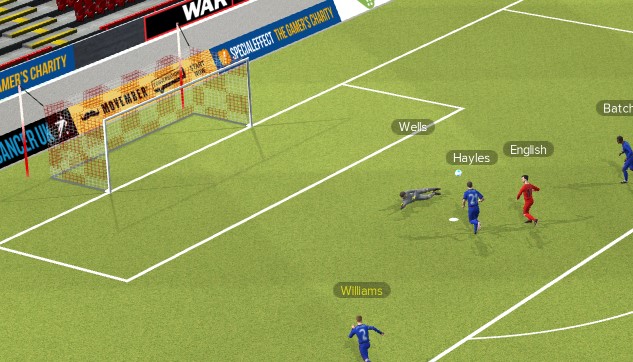 A deft touch from Grant English saw us 3-1 up coming to the end of the game. I was shaping up for a nervy last stretch until Grant English went clear ahead, coming up in front the keeper and subtly chipping him for us to be 3-1 up with ten minutes to go.  The final score in my first match, 4-2 to Tunbridge Wells. With three minutes left one of The Fat Man’s strikers scored a fourth, before we left a second in with one minute of normal time left, but it didn’t bother me a jot. I realised I hadn’t thought about money, scams or tax evasion. I had no concerns over contracts, wage budgets or releasing players all through the lead up to the match. Right up to the final whistle I’d been consumed by the football and never before had I been as focused on anything so steadfastly.  The player and match review I’d be facing when I next hit the office, but no matter, I had won my first ever game as a manager. Match reviews, player performancess and, probably, contract renewals awaited me the next day, but that night I slept soundly, and I didn’t even think of reaching for the biscuit tin.
|
|
|
|
Roaring Through Paperwork Waking after our 4-2 friendly win against May and Baker, my first match in charge, I was feeling a little unwell. I’d slept soundly, nodding off quickly—unlike my usual attempts—but I figured the morning after’s ill-ease must have been the natural high’s resultant come down. It didn’t help that in the lead up to and after the match I was so energised I didn’t eat or drink, not even a stout—rich in iron. 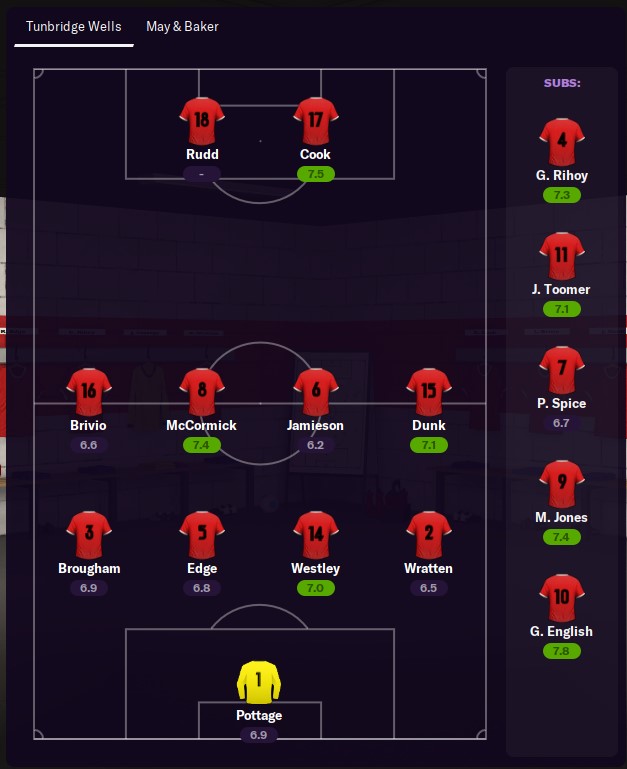 How I’d written up the performance of my players, with help from my assistant manager. And there was a lot to dwell on. I’d kept notes on the game, and in conjunction with my newly signed assistant manager, Alexander Crossley, I had some idea of the effectiveness and contribution the players made over the entirety of the match. Most striking was the performance of some of The Fat Man’s guys; the lads who’d only ever been messing about in football and spent training joking around.  The game was almost over, but James Cook’s goal certainly put a nice finish on the scoreline. James Cook had scored a goal, even if the match was already decided, and I recalled from his training he was working that little bit harder than some of the other guys.  Both me and Alexander agreed Graham Rihoy had tied together our defence particularly well. Similarly, Graham Rihoy had put in a fine shift; the bedrock of our defensive setup; a defence made entirely of The Fat Man’s messers. These two lads, despite being drafted in from random jobs around the The Fat Man’s nefarious concerns, were making me think. Was it worthwhile offering them a contract? They hadn’t taken football too seriously before, but after their showing in our first match, and feeling the excitement of giving your all in competition, they might kick on with a bit of faith and some money behind them. 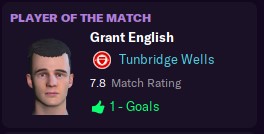 Player of the Match—with a goal to his name against May and Baker—Grant English Before any of that happened I realised I needed to tie down Grant English who’d put in a Player of the Match performance. It was my first venture into negotiating with a player, with my newly expanded wage budget, and I didn’t know what was in store for me. If English demanded a high sum all the room I had for improvements elsewhere disappeared in an instant. Calling Grant into my office I couldn’t tell if he knew what was coming; if he thought I was just calling him aside to praise his performance, or if he figured after scoring in our first game a contract was on the cards.  The opening negotiations with Grant English, with me promising him he’d be a regular starter in my team. I began, trying to show confidence, and came straight out with my proposal. I didn’t know if it was more than he was expecting, if I could have promised less and he’d have been as happy, but I was direct, to the point, and told him straight up, “I’d like you to be a regular starter for us.” And, that, at least, drew a positive response. Then it was onto the difficult part, the money. Grant English suggested a non-contract, appearance-fee based wage structure, but I knew I needed to tie him down for at least a year. A non-contract agreement meant he could be snatched up by anyone else, and although I wouldn’t stop him from retiring if his real life got busy, a semi-pro contract meant he’d probably take longer to throw in the towel if things got tough.  What I suggested to English, which was more-or-less what he wanted, but in the form of a permanent deal. I suggested more-or-less the same appearance and goal bonus terms as he wanted with his non-contract deal but in a part time agreement. He’d be tied down for a year and no club would be able to poach him, at least not without forking out. 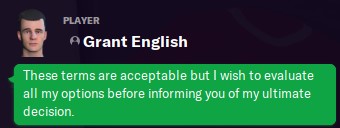 Grant English felt the terms I’d offered were acceptable and wanted a few days to consider things. After a few seconds to consider, as my heart pounded, he told me he was happy with what I offered, but, again, like Crossley when I offered him a contract, English asked for a few days to see if this was what he really wanted. With the negotiation going well I decided to strike while the iron was hot, i.e. in a head rush and without considering things, and prepared myself to tie down both Graham Rihoy and James Cook. I offered The Fat Lad’s guys—Rihoy and Cook—contracts but they were hesitant about things. They’d never considered a career in football, part time or not. They just wanted to play for their health (which was a little better than the other lads who just wanted to play for free pints.)  The Amateur Contract both Rihoy and Cook temporarily agreed to. Rihoy and Cook both felt amateur contracts were what they needed for the moment. It meant they were taking things a bit more seriously, but they weren’t ready to fully commit just yet. What this allowed was time for me to see how they’d perform on the pitch, and whether they’d keep their friendly game performance levels through the opening of the season, demanding a more ironclad deal. My concern was it also meant they were officially registered; other teams might become interested, and I doubted our contract was enough to hold them tight if someone came at them with a big wedge.  Jamieson’s age really showed in our friendly, however sound a footballing head he had on his shoulders. While spending two days dealing with all the paperwork a problem kept creeping up on me. Wayne Jamieson, our ageing midfielder, had put in a dire performance in the friendly. That wouldn’t normally concern me, players can have bad matches, but first impressions count. A spell in the subs might urge him on a bit but we had no midfielders to replace Jamieson if I benched him. However, there was an alternative. During all our squad sessions the younger teams had been training, much the same as us, in another half of the field; and I’d been keeping on an eye on them. With me offering contracts to some of our temporary players I was hoping a future superstar would come out of our youth squads, and midfield was my primary concern, especially with no scouts to find replacements. The problem was no-one was showing any real skill in those positions in the youth teams. 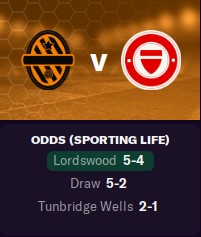 The bookies did not have confidence in us putting in an away performance. This, again, would all have been fine if I’d had a pre-season and time to put together a team, but not only was our first league match the next day, it was an opening day away game, and the bookies had made our opposition clear favourites to win.  The season preview from the press, predicting us to come third or fourth, and our opening day opposition, Lordswood, to be trailing behind us by a good few places. The bookies predicting a loss for us came as somewhat a surprise. I’d already accepted we’d be away for our opener, and when I looked at what the press had put together for a season preview I knew it’d be a tight game, but I didn’t think we’d be assumed-losers against a team predicted to come beneath us, even with them having home advantage. 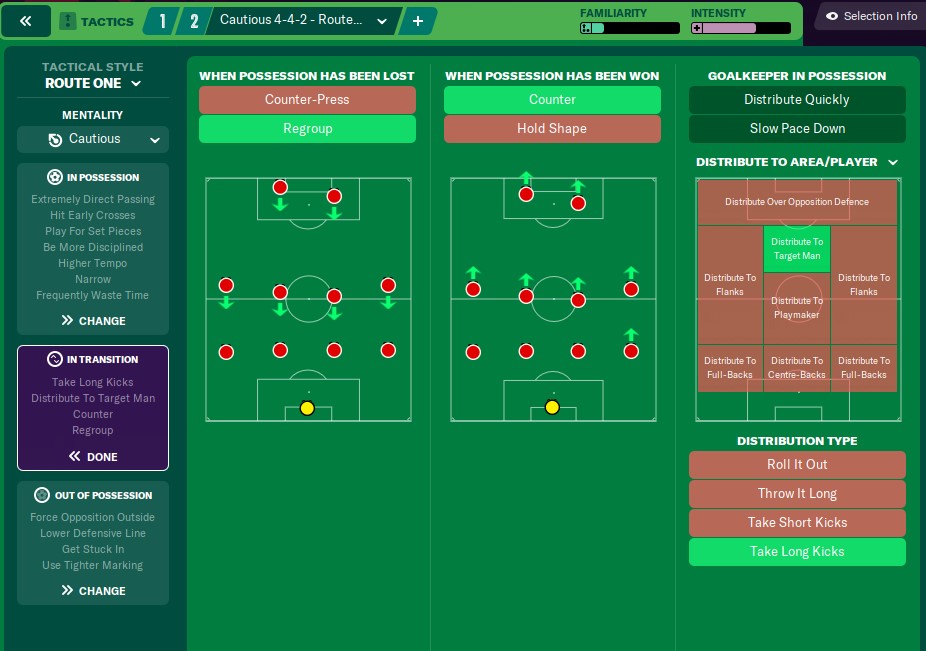 Staring at our tactics of what we were supposed to do when the chaos began. With twenty-four hours to go I’d been given another day off from the golf course by Teddy, who was fully behind The Fat Man’s football endeavours, but sitting in my office, with no training that day, no contracts to be negotiated or paperwork to fill out I was feeling empty. I didn’t know if I wanted something disastrous to happen in the lead up to our game, just to occupy me, but what I did decide was that we’d have to close up shop. We’d begin the game with our defensive approach, hope for the best, and without a doctor or physio to patch up the players, or an analyst telling me how at-risk-of-injury they were, I had to hope that not only would we come away with a result, but also with a team left intact at the end of the match. As I sat pouring over teamsheets and tactical plans at my desk I knew the offices, changing rooms and the entire training ground was empty but I could still hear a loudness in my ears. It wasn’t tinnitus, it was anxiety, and it was growing and growing as the day wore on and I became more and more tired. It was a building pressure from an absence of occupation and ample time to dwell on all the bad that could happen. Most of all it was the roar of a season of football, my first ever, about to be unleashed on my players, Tunbridge Wells football club, and me, a first time football manager facing into her first competitive match.
|
|
|
|
Sick as a Dog The evening before our game against Lordswood I went to The Other Shoe for one to settle me; there I ran into the barman’s pal, Rarity. She’d been thinking about our Jamieson situation and asked me how it was going with him. “Not too great,” I said. “He had a poor performance in our friendly, but, still, there’s a lot of knowledge in that ol’ noggin of his.”  Jamieson, at 39, was thinking about the long term, and had some plans to move into the backroom with a notion to end up in Youth Development. “Perhaps Jamieson can be,” she made a pair of those airquotes at this, “'persuaded,' to retire from active football for a coaching role.” From the corner of the bar came another voice, one sharing what I’d guess would be the sentiment of many of our fans should Jamieson keep playing as he did in the previous game, “Or we can take him out behind the nackers yard,” it said. But we were a bottom division club, and community values, whatever The Fat Man did for his money, had to be part of a setup like ours. Building our players up for a future beyond kicking a ball should be something we did. “I’ve been thinking about that,” I said. “He mentioned something about going into Youth Development, and I could, maybe, send him on a coaching course to get his coaching badges. The problem is I don’t have any badges myself! I was hoping to bring in some more staff in the short term, to spread the load, and then do a few seminars for myself.” I paused, for a second, and thought on the state of our team, “And even then we don’t have enough players to do without him if he’s busy with coaching.” Rarity nodded. Her thoughts seemed to be echoing my own thinking, at least on a coaching future for Jamieson. 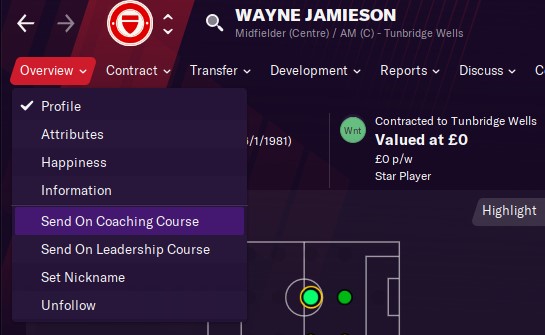 An email I’d probably be sending, putting Wayne Jamieson on a coaching course, once we’d signed a replacement and I had my own qualifications under my belt. “It’s something to think about in a few weeks,” I said. “But you’re right! And... I just wanted to say thanks for all the support... It’s good to see a friendly face in here after a day managing football.” Rarity smiled in acknowledgement. “And I was wondering, have you ever had a Fat Frog?” “What’s that?” Rarity asked. “I think, now, and it’s been almost fifteen years since I had one, but I think it’s a Bacardi Breezer, a Smirnoff Ice, and a Blue WKD all mixed together. And it comes to about two pints, so you have to share it. And I want to thank you for having my back.” One Fat Frog turned into many, including a few rounds for me, Rarity and the other Wells fan, who introduced themselves as ‘tithin’ but the drinks must have been deserved, because waking the next morning, and cycling to the training grounds to get a lift with Maria to the game I had no hint of a hangover. 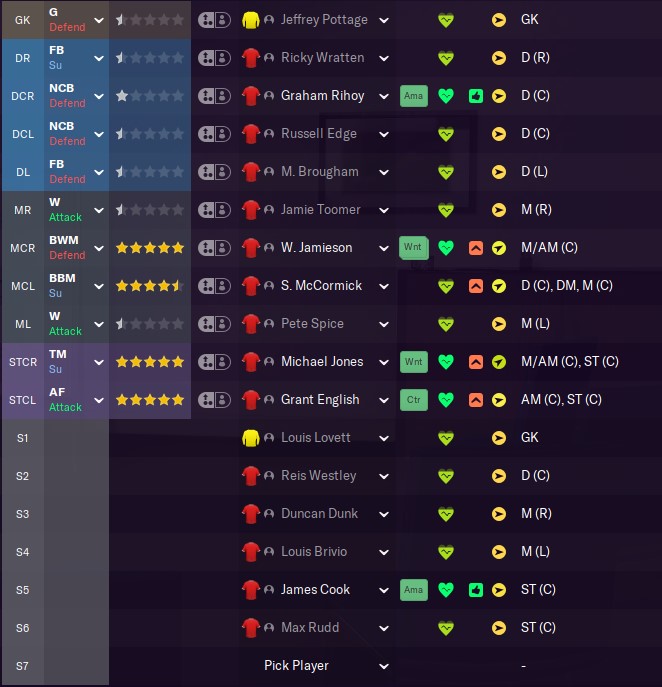 The team for the Lordswood match. The team to face Lordswood picked itself. I’d start all our players with contracts, except for Cook, who could come on if we needed some impact. The rest was made up of The Fat Man’s lads, which was the entire squad, where we didn’t even have enough players to fill out our sub allocation. 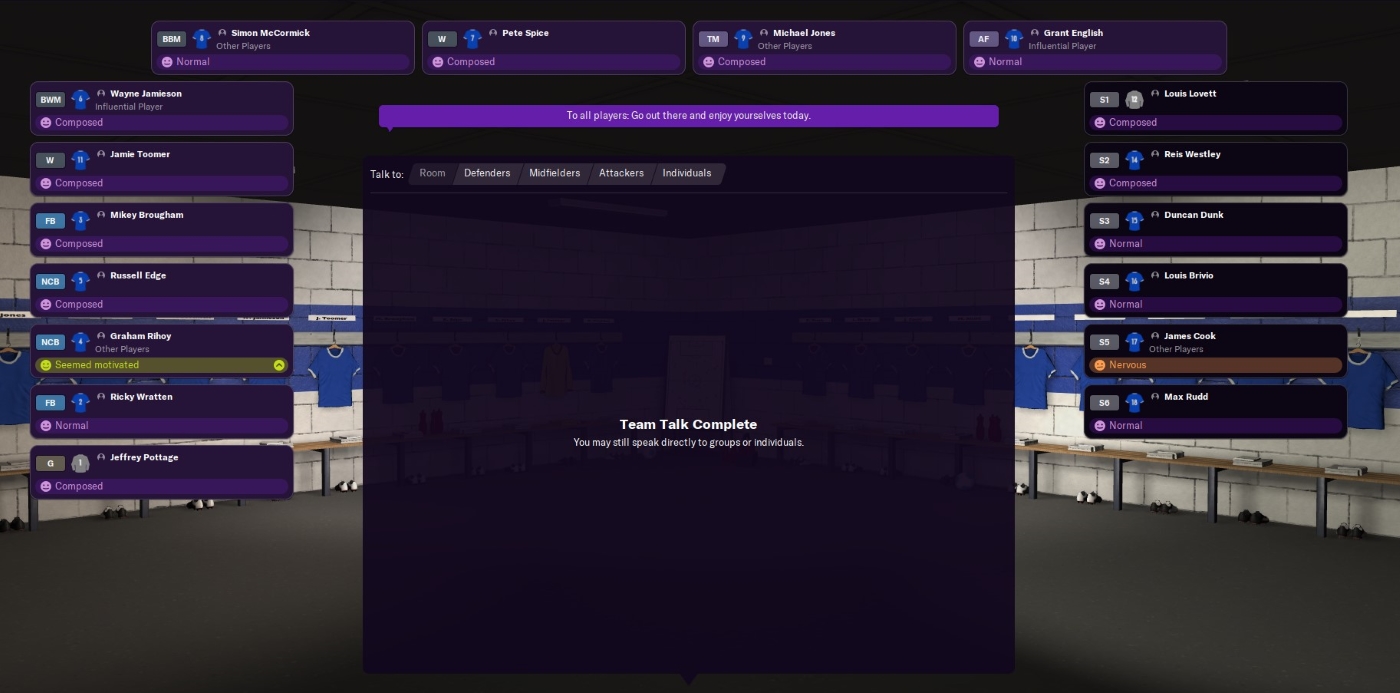 What could you say to a bunch of amateurs before the first match of a season? In the changing room I looked every player in the eye, told them to give it their all, then, standing in the middle of the room, with most of them staring at me, I offered a final a bit of advice, “Just enjoy yourselves, lads.” It didn’t seem to register for most of them, but Graham Rihoy did relax. He was looking nervous before but the effects of my words was he was now eager for the game. Then, it was a quick walk out to the dugout, and a long wait for the referee to ready himself. I sat in my appointed manager’s spot, and tried to calm myself in what seemed like a complete void, but unlike Rihoy there was no-one to soothe my nerves. To settle myself by sharing in the excitement of the crowd, in the few minutes while the ref checked everything was ready to go, I took a quick look at the social media posts Maria had collected from the fans. It was all anticipation for a new season with a new owner and a new manager. 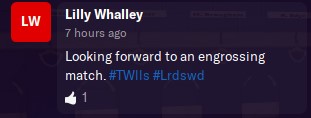 Lilly Whalley with some words of encouragement, or, maybe not. “‘Looking forward to an engrossing match?’ That’s a good sign, isn’t it?” Maria asked. “Maybe. She could be a bloody sarcastic goon as well,” I said. Maria looked up around the stadium, with about 130 people in it, and started picking out each of the thirty travelling Wells fans there. “I wonder which one Lilly Whalley is?” she said. As Maria pointed out someone in the stands decked out in the full Tunbridge Wells kit the match kicked off and who was being facetious or not didn’t matter. Our season had begun. 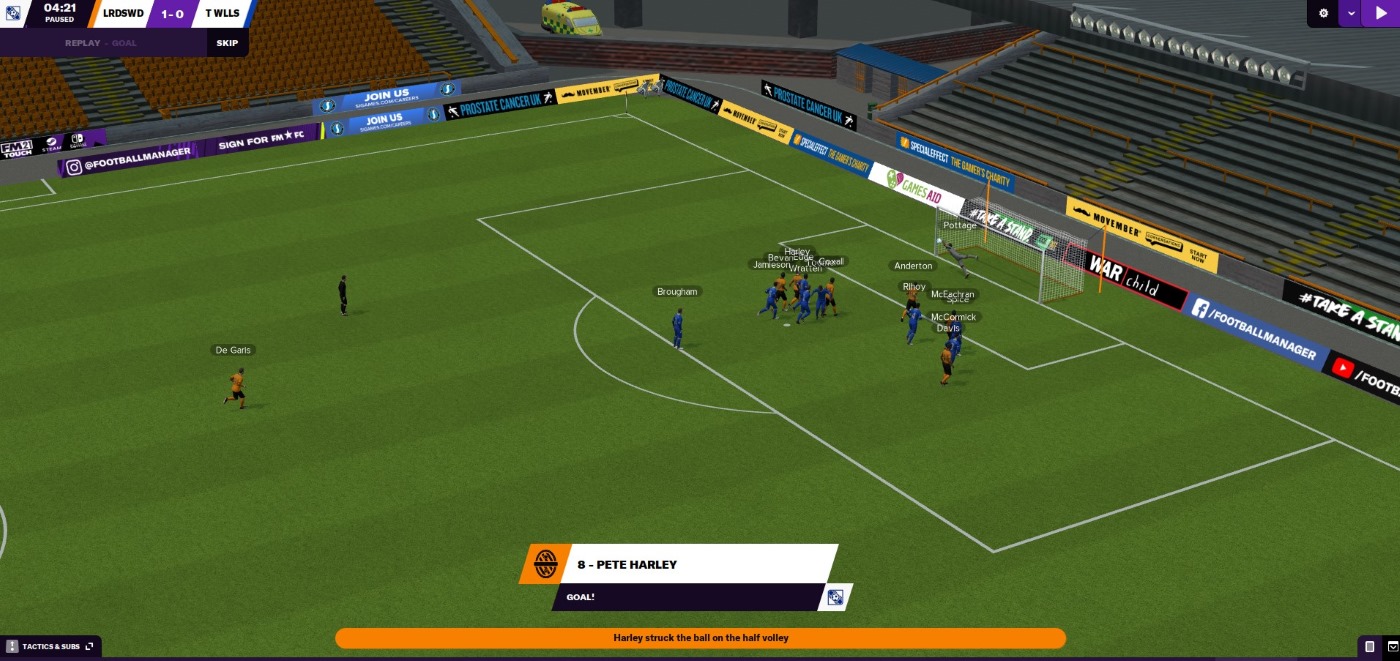 A goal down, and a disastrous start. I was still finding my bearings as we gave away a free kick ten yards or so outside our area. From the free the penalty box is an absolute scrum, with no-one picking up Lordswood’s Harley, and with not even five minutes gone we go a goal down. It’s too early to start making changes, but it feels like a gut punch before I even have time to appreciate my first few minutes as a real football manager. 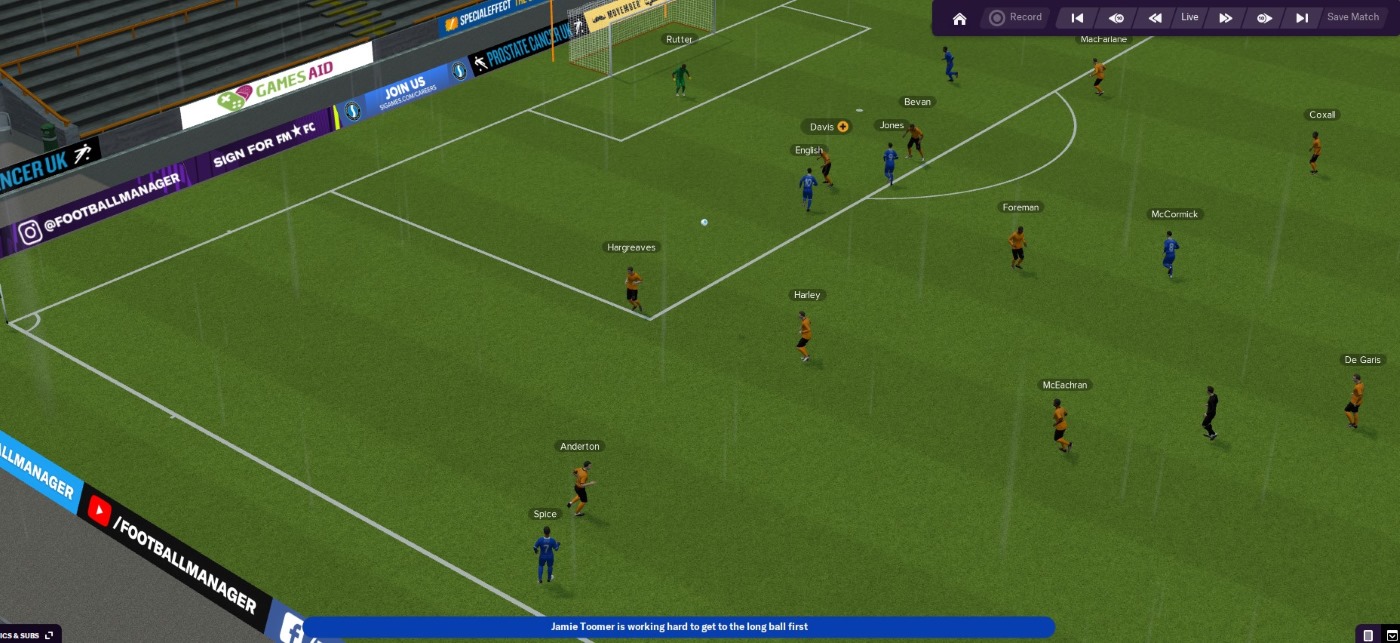 Toomer scores, but it’s ruled out for offside. The next ten minutes have a bit of back and forth, with it mostly being Lordswood in charge, but our few away fans begin to shout as Spice puts a ball in for Toomer who has some space. He hits it cleanly, with the goalkeeper diving to no avail, and it’s right in the back of the net, but I already knew it wouldn’t count. Toomer went before the defender and was offside.  English makes his contract worthwhile, scoring an equaliser on 32 minutes. With 32 minutes gone, Spice, who put the cross in for Toomer in the disallowed goal, is hanging out on the wing with the ball. Grant English is between two defenders and I scream at Spice to put the ball in to him. Instead he futzes around with some going-nowhere passes, before the ball eventually lands at Toomer’s feet. Grant English takes a great diagonal off his defender in the box, and Toomer spots him, puts the ball behind, and English makes his new contract worthwhile by scoring an equaliser to make it one-all. 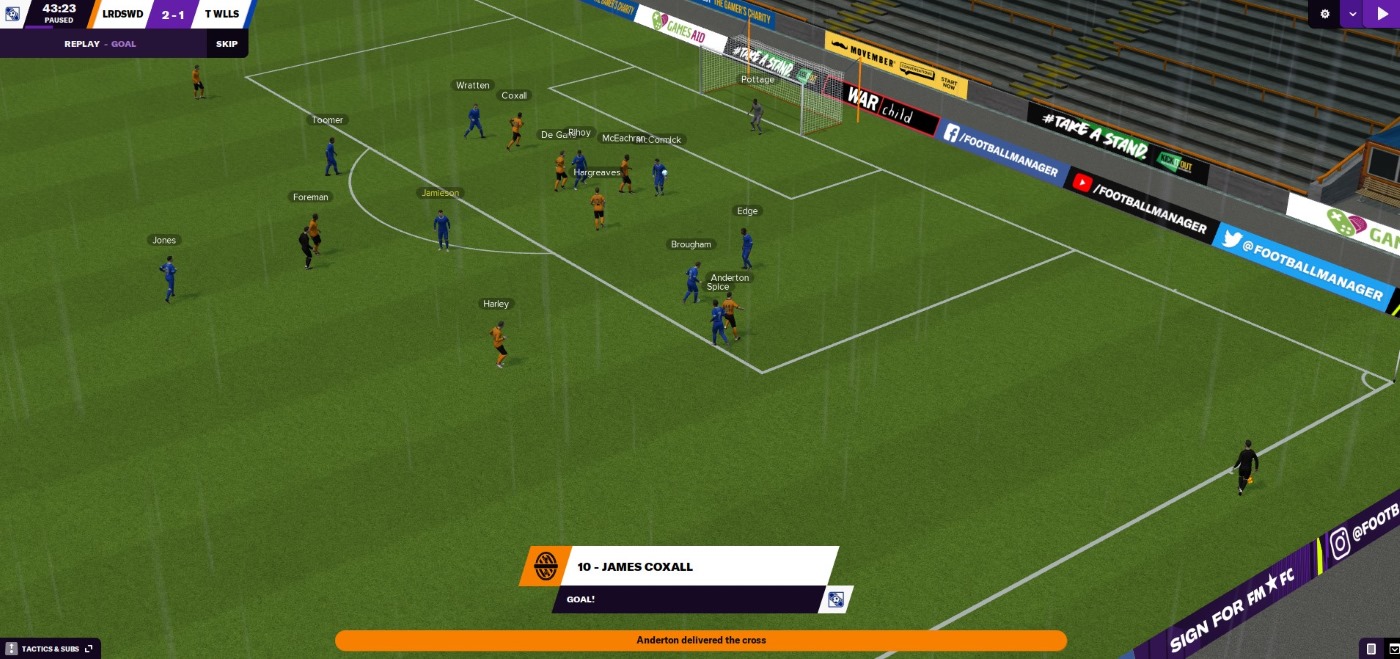 43 minutes gone and we’re down again. 2-1 to Lordswood. I’m just getting ready for half time, when, again, there’s a mess in our defence. No-one is doing any closing down and Anderton gets free. He puts a ball over our backline, and with no-one running with him Coxall has the space for an easy volley to make my half-time talk a lot angrier with us 2-1 down.  Disaster, it’s an injury. With just forty seconds left in the half a disaster happens. Jones suffers an injury and we have to make do with no physios on staff. I bring Cook on for the final few seconds left before the break but looking at Jones struggling as he walks down the tunnel to the changing rooms, after he was carried off the pitch, he seems absolutely distraught. All I can think of is maybe if we had an expert on staff I’d have spotted this earlier, seen the warning signs, but I tell myself it’s just the game, you can’t account for the opposition putting pressure on a lad. All I can hope for now is that Maria’s ads get responded to quickly, and we get him back on the road to recovery with some proper care, but for the meantime I’m just eager for the half time whistle; the team looks wrecked.  Our first half troubles aren’t over. In the last play of the first 45 minutes (or more 50 minutes) we go down 3-1. But this isn’t the end of our problems. With the injury and subsequent substitution there’s over five minutes of extra time. I’m screaming at the ref to blow it up, all the while the home fans jeer me as Lordswood attack, but the ref lets play run on and on, and with the final kick of the half Lordswood score another goal. We’re 3-1 down, and I know I have to change up our tactics, to set us up more attacking, to stand a chance in the second half, but I’m already feeling sick as a dog watching this—and I struggle to keep my hope from deserting me. 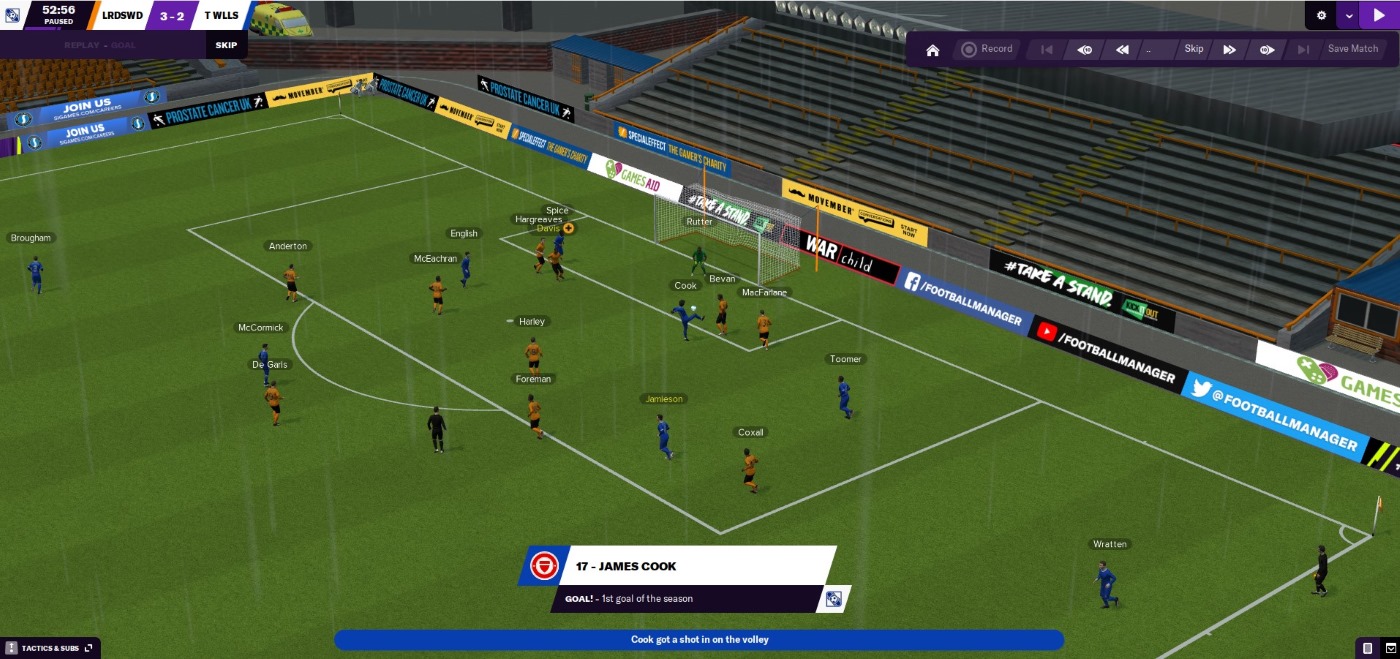 With the first significant play of the second half we get one back. The tactical changes don’t seem to do much, but with almost eight minutes of nothing the first significant play of the second half is ours. A cross goes into English who, smartly, spots Cook free just a few metres back in the ball’s direction. English nods the ball down to Cook, who rockets the ball into the goal to bring us back within a score. It’s 3-2 and I don’t know if a comeback is on or we’re just making the scoreline look respectable, but I have to dream. 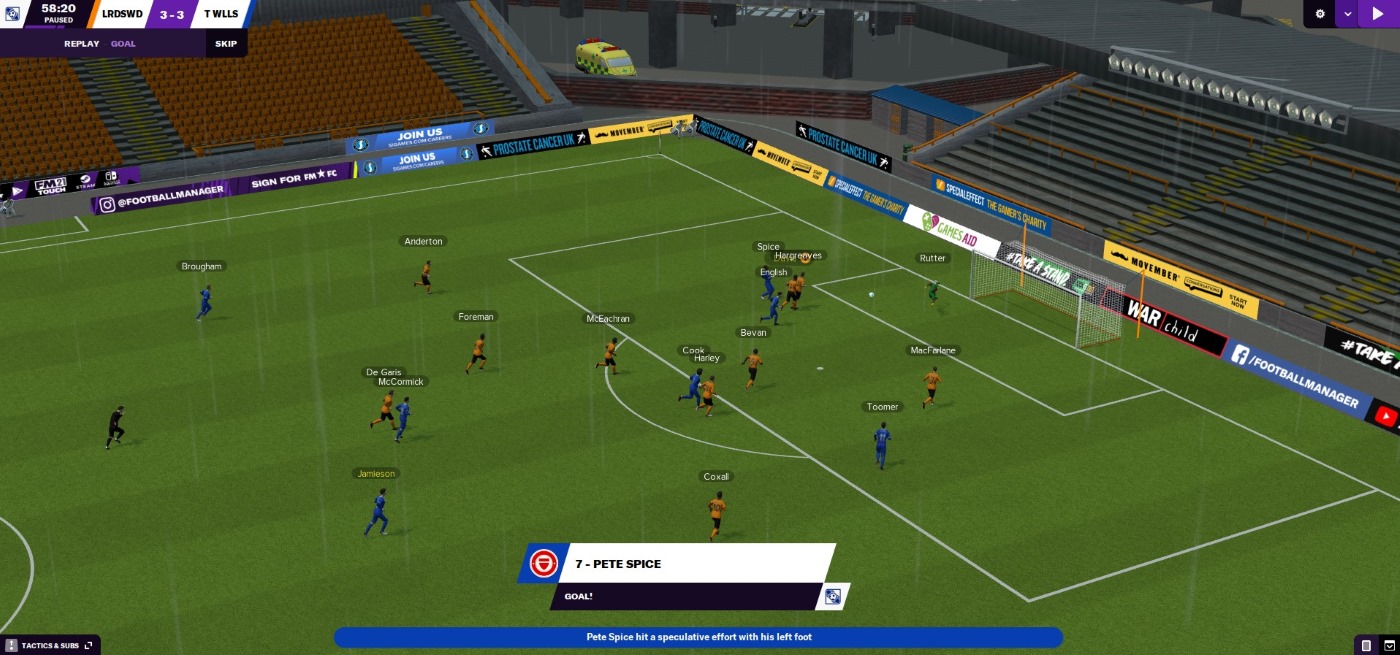 WE’RE DRAWING! Not even seven minutes later McCormick sends a ball over the defence, right to Spice, who brings us level. We’re drawing 3-3 with thirty minutes left. Is it too much to hope for? To go from two down to winning? We just need one snatched goal and to not let them back in—but that’s a huge ask.  Toomer looking only delighted with himself. In the space of eleven minutes we’ve scored three goals! After what’s some dire play down the left wing, albeit started by a great tackle from Brougham to stop a Lordswood attack, Brougham receives the ball again to complete what he began by sending the dodgiest looking short lobbed ball right onto Toomer’s bonce where Toomer magically nods it across the goal, and beyond the keeper. Their goalie stood no chance with a header like that! And now, for the first time, we’re ahead—it’s 3-4 to us. The question is can we hold on with Lordswood having proven they can score with ease? 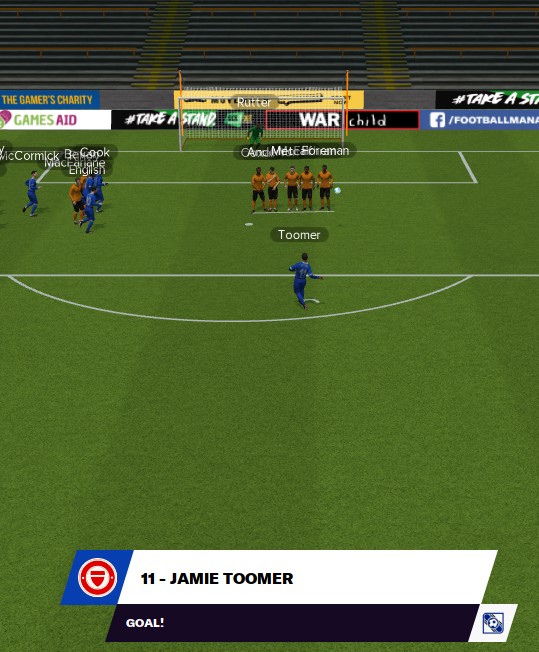 79 minutes gone and we score a superb free kick. With ten minutes left in the match, despite my nerves, I’m starting to believe. And I believe even more when on 79 minutes we secure a free kick straight in front of the Lordswood goal and Toomer bags another, sending a perfect ball curving around the wall to score a set piece deserving of the top flight. We’re 3-5 up after being 3-1 down at half time! I can’t believe what I’m seeing from my team who look absolutely shattered with the effort they’ve put in. 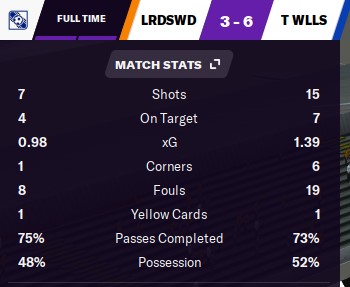 We win our first game 3-6 despite suffering a kicking in the final minutes of the first half. At the end of the match I was shocked, stuck firm in my seat. We’d won 3-6 after being down 3-1 at half time. I could barely move, but hearing the lads celebrating in the changing room I levered myself out of my chair, walked down the tunnel and into my team, and with all eyes on me told them, with absolute belief, "You did superbly to come back like that!" They all looked thrilled, talking about the next match, even. And just as things began to settle down, from outside the window a lone Tunbridge fan, obviously making use of the lower league’s allowance to serve beer screamed, “UP THE loving WELLS!” and the players, after a moment of quiet consideration, all broke out in a second round of mad celebration. It was nothing less than they deserved.
|
|
|
|
 Just a couple of things to check in on after our first competitive season game... Match Screenshots We’ve played two matches so far, and I’ve handled the screenshots in two different ways. It’s difficult to get the sight of the ball in the back of the net while also showing some of where the players were and how the goal was setup, so that’s out, but I’ve tried screenshots differently in each match post. The first way is where I take a snip of the small part of the screen, and show the “action.” The second is where I take a screenshot of all the pitch the game is showing me, including the graphics the game overlays, hoping to give some idea of how the team is arranged and where balls are coming from and going to, while showing some of Football Manager’s graphical touches. My preference, at this point (and I could still change things up later,) is for the tighter action shots, they’re a bit more dramatic, but I’ll leave it to up to you. Would you prefer the tighter, dramatic action shot, or the wider game-banners and players-on-the-pitch screenshot for important moments? The Pub/The Other Shoe So far I’ve featured two posters in my regular trips to the pub, taking their posts and integrating them into the narrative. I know Rarity, so pronouns weren’t a problem for her. I don’t know tithin, so I had to refer to their “voice” rather than them themselves, and I didn’t know their pronouns (so, as you can see, “Theys” abound.) Also, I’ve been using forum names for these people. If you have a really unwieldy name I reserve the right to change it up (along with changing the quote a bit for the narrative and putting in some other dialogue.) If you have a preference for a name you’d like to be used, and pronouns you’d like to be used, in The Other Shoe/The Pub scenes, could you make it known at least once when you post? Also, if you’d not like to be featured let me know that too. I will, in time honoured goon tradition, try and keep a GoonsInFootballPubs.ods spreadsheet. I can’t guarantee you’ll be featured, nor can I guarantee what you say won’t be changed or added to a bit. Most of all, thanks for reading along so far. It’s been a blast.
|
|
|
|
The screenshot coming before is for a few reasons. First off, it follows what newspapers/online articles do. Secondly, if someone is only skimming the post they can see what the important element is, then choose to read about it if they want. Finally, it's to avoid having two screenshots in a row with little text between them. I can change things up so the match screenshots come after the text, that's not an issue. Would you want the same for the more "manager" screenshots? When I'm signing players, or discussing tactics, i.e. not the during-match screenshots? So would you want me to describe, say, negotiating with a player, then show the screenshot after? (So I can do the screenshots "after" for just the match, or the match and the more textual/menu-based parts of the game.)
|
|
|
|
All Action the Morning After There were a few drinks for me and the team in The Sheep’s Head after our win, but I gave up on the night once it looked like the boyos were in for the long haul with The Fat Man firing out tequilas. I didn’t want to invade their space, and, anyway, a second night tearing it up wasn’t for me now I was heading into my mid-thirties. Fresh-headed, unlike my team, I guessed, I walked to the training grounds the next morning to pick up my bicycle. Maria had given me a lift to the pub the evening before and my hybrid was still locked against a fence next to the shipping containers in the grounds. Arriving, early enough, I was shocked to see both Graham Rihoy and James Cook doing sprints across the width of the pitch. I left them at it for a few minutes, just watching in stunned silence, when Cook spotted me having a sneaky fag while gawping at them. They both jogged up to me. “How’d we do yesterday, boss?” Cook asked, as he wiped some sweat from his forehead. “We won 3-6,” I said. “You were there. You picked up the Player of the Match award!” 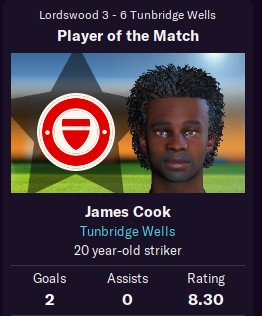 James Cook, with two goals and a deserved Player of the Match award, even after only playing one half. “I mean in those reviews you keep of us?” “Why do you want to know that?” I asked. Neither Rihoy or Cook had shown this type of interest before. Rihoy started to fidget until Cook tapped him on the arm to show him some stretches to keep warm as they talked to me. After a few seconds Rihoy began to mirror him. Rihoy stretched out his quads, looked up at me from the bottom of a dip and said, “I wasn’t the best, I know that. I just want to prove myself. This is all so new for me.” “You were solid. A good performance.” I could see him grimace as he worked out a little tightness from his efforts, but I continued, “The whole team was solid, and it showed something real to fight back like you did.” 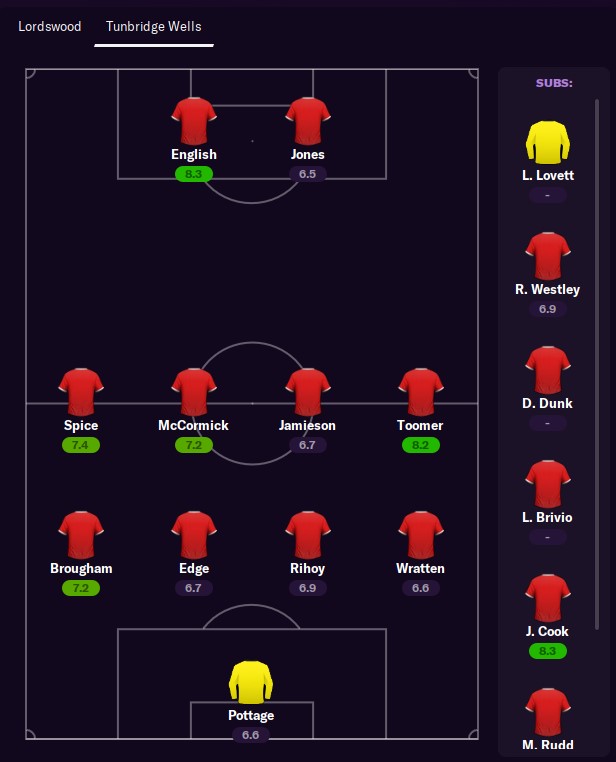 The whole team, apart from Jones, who came off injured during our bad first half, had put in decent, or at least average efforts on the pitch. Both Cook and Rihoy nodded. “We’ve never done anything like this,” Cook said. “I’ve never had anyone take me seriously when it came to kicking a ball. Mr. Laws just hands out free stuff, but signing that amateur contract showed me someone believed.” “You did good. You all did. But we need to keep it up, and manage that every match. It won’t always be possible, you’ll have downs as well as ups, but that’s the game,” I said. Both Rihoy and Cook seemed to accept this, then smiled at me, “Thanks for the advice boss,” Cook said. And Rihoy continued, “I couldn’t have imagined myself doing this at the beginning of the summer. It’s like nothing I’ve done before.” And with that they went back to their Sunday morning session of self imposed, extra training. Wheeling my bike through the car park, as Rihoy and Cook worked on their heading, nodding a ball back and forth, I texted my assistant manager and asked if he was free for breakfast. Within an hour I was locking up my little blue hunk of hill-pain next to Tunbridge Wells finest brunch spot, filled with tourists. Me and Alexander were given a spot next to the toilets, at our own request, to have a bit of quiet to discuss things. “It seems those amateur contracts make a huge difference,” I said to Alexander. “Yeah, both lads that’ve been put on them seem to be taking things more seriously. Their performances might not be better, but they’re lasting out the match with a bit more energy.” Alexander took a bite of his yoghurt and fruit, making me feel bad, for a split second, about my bacon sandwich. “It’s like they’re better rested the night before, better fuelled, just talking it all more seriously,” I said. “You’re thinking about offering those contracts to a few more players, aren’t you?” he asked. “Brougham’s done well in both matches,” I said, and I paused to find the right way to say what I was going to say, “But I think he’s playing above himself. He’s not shown much skill, or anything really standout in ability.” 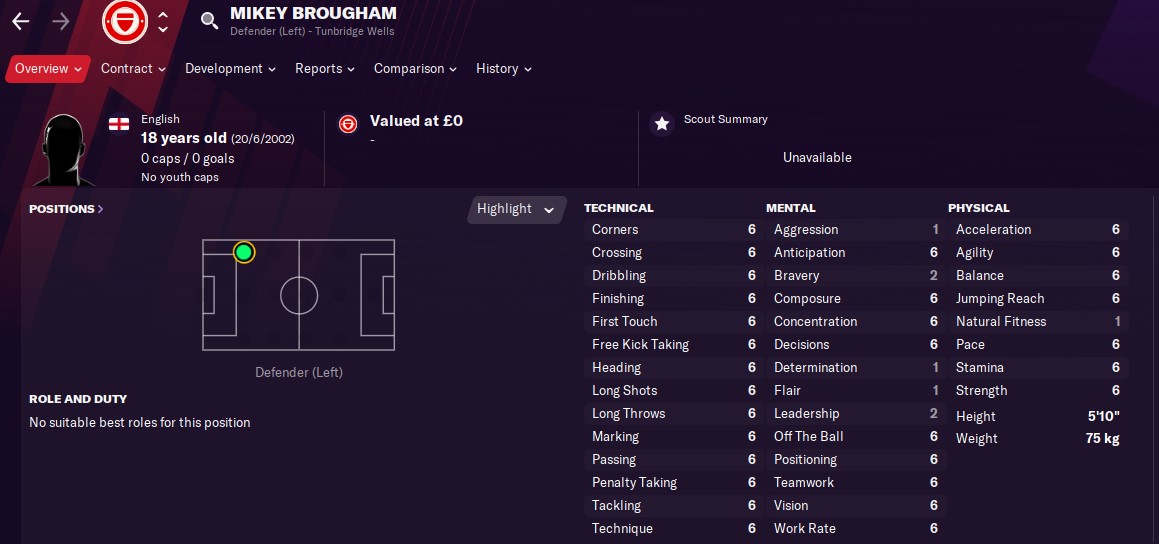 An analysis of Mikey Brougham’s technicals, which were a bit below average for most of the team, despite his good performances. “I think he’s one to watch,” Crossley said. “What about Spice?” I watched Alexander put a giant strawberry in his mouth and began to think about Prosecco but forced my thoughts back on football. “He’s decent, even in his skills, but with one good match and one only alright match I think it’s a case of whether we sign him for that boost in attitude now, or wait to see how he continues to shape up.” 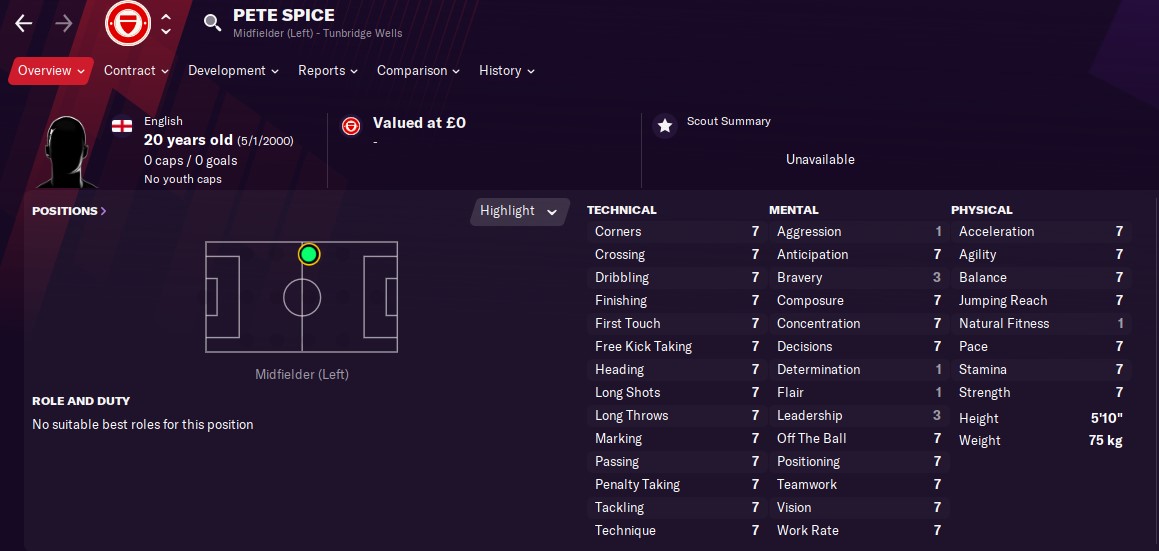 Spice had OK skills, a little above average for our casual players, but with a 6.7 and then a 7.4 in our ratings, for the two matches so far, I was in two minds about signing him. “Toomer is the one we need to snatch up,” Crossley said. “He’s the best of the lads we’ve roped into play for us.” “Yeah, he’s a quality player. Nothing stand-out; just that bit better. Definitely one to have with us for the long haul.”  Toomer’s skills, the pick of the guys who were along for the ride with us, especially after that free kick he scored against Lordswood. Crossley put his spoon back in the bowl after scraping out and eating the last of his yoghurt, catching a stray blueberry between his fingers and munching down on it. “I’ll leave it to you to deal with Spice, but I’m guessing you’ll be talking to Toomer soon enough.” “Absolutely. And Spice is the one I’ll ruminate on.” “How’s Jones?” Alexander asked, a look of real concern coming over his face. “I’m not sure. We brought him to his local GP. They’re not an expert on sports injuries, or what’s needed in competitive games, and they've referred him to a local physio for sprained ankle ligaments, but the jobbing physio mostly deals with occupational stuff and people doing their back in trying yoga off youtube.” “It happens,” Alexander said. I wasn't sure if he was referring to youtube yoga or professional footballers getting injured. “They reckon he’s out anywhere from three to six weeks. I just have to hope our ads for medical staff get answered soon.”  The GP’s report on Michael Jones’s sprained ankle ligaments. They couldn’t put an exact timeframe on his return which could be anywhere from three to six weeks. Alexander nodded, then, as he headed off he put in an order for a coffee for me at the counter and I texted Toomer to see if he’d come on board with us. Before the plates had been cleared away, or my coffee had arrived, Toomer was back to me on Whatsapp. “What took so long?” he asked. “I’ve been waiting for this since last night!”  Toomer’s excited head appearing in Whatsapp as he texted me back to confirm he’d sign with us. From the café I headed back to the training grounds, letting myself into the office, to prepare the contract for Toomer. I checked in on my emails, and, waiting for me, arriving right after our come-back win over Lordswood, were a few messages from players offering their services; word must have gotten out that we were a team to be with, at least based on one match.  Players messaging me asking me to consider signing them for our team. I’d had four players come to me, David Hodges, John Smith, Geoff Cairns, and Ben McGarry. I offered trials to all of them, so at the least I’d see what they were about in training, even if we couldn’t play them in games. They all agreed to spend two weeks with us.  John Smith accepts the deal to come on trial with us for two weeks. The big problem with that was how The Fat Man wanted the club set up. He’d instructed me to sign players that could last with us for a few years, guys at or under the age of 23, and apart from John Smith, the other trialists were all in their thirties. Depending on how they performed they might be able to make a short term difference for us—even ageing players left go from more competitive leagues could do well at our level with their experience and natural ability—and we desperately needed players, but was it worth going against the very nature of the club, how it was setting itself up for the future, just for some short term success? It might piss off The Fat Man, and I was certain he’d have no bones about replacing me if I stood against his demands. Whatever happened I’d at least see how they were in training, which could take a couple of weeks to fully understand how they’d fit in. By then I was in dedicated manager mode, despite it being two-thirty on a Sunday afternoon, and my mind turned to our failure in the first half the previous day. Maybe the bookies’ odds were just wrong, our players were better and I shouldn’t have told them to be so cautious from the off, but whatever the rights and wrongs of a careful approach there would definitely be games where we’d need to defend; either from kick off or to close out a match. I ran scenarios over and over in my thoughts, contemplating more traditional setups versus where I maybe had the team more expansive, and made a few changes to our “park the bus" tactic. 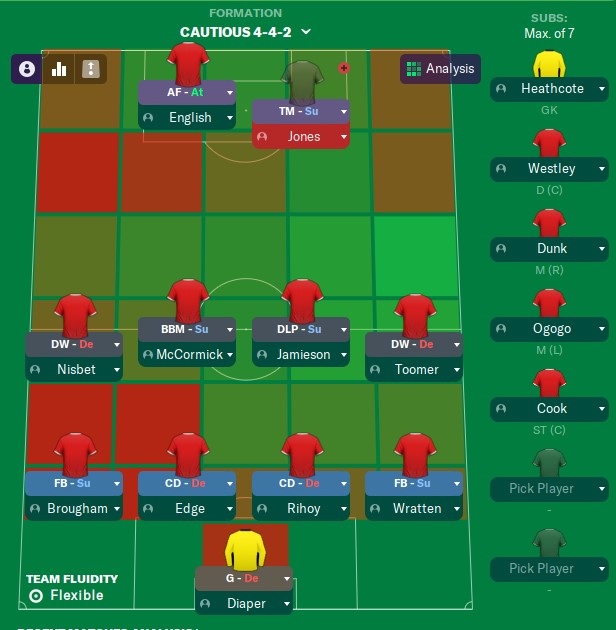 Some more traditional defending for our centre backs, along with strengthening up the wide areas, and some playmaking in the middle to feed our strikers balls. We had Chatham coming up in two games time, who were predicted to be above us in the league, and who had won their opening game 4-0. I’d need to have a defensive tactic sorted by then. It wasn’t quite back to the drawing board, but slight adjustments were definitely needed, even if we were sitting in fourth on goal difference after our first match. The league looked like madness with one round done, and we’d definitely do better with options ready for whatever was thrown at us. 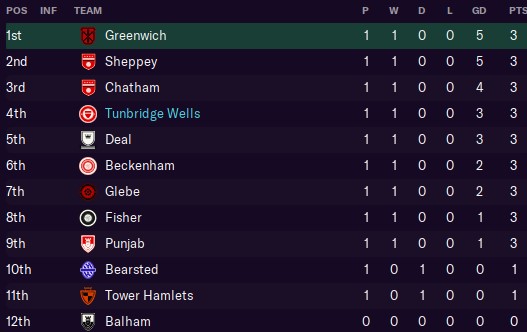 There were a lot of goals in all the games in the first round, meaning it was shaping up to be a wild season.
|
|
|
|
Team Bonding Facing into a match just four days after our season opener, and another match just three days after that, the problem we were presented with was we had no time for training. We had a half-day session scheduled on the Monday morning, then, no more training again until the next Monday. Whatever about signing players up to amateur contracts, to give them that little boost of dedication, without training sessions we’d have to deal with some problems. I’d never be able to drill the players on their roles or bring them up to the fullness of their potential meaning the players could stagnate. This was the nature of a semi-pro team; the players have real jobs and real lives and would never be able to dedicate themselves wholly to football. The money, no matter The Fat Man’s predilection for gold jewellery, simply wasn’t there for the team to go professional. I don’t think any team at our level was fully professional, unless some Saudi Sheikh bought a club as a present for his eight year old nephew. With that in mind I focused our scant training sessions on what little we could do. Our one week pre-season gave me a little room, so I allowed the players to have some team bonding after our first game to show them there was more to football than free shots of tequila from the chairman. What I didn’t realise, as I planned the training sessions, was they had already figured this out. 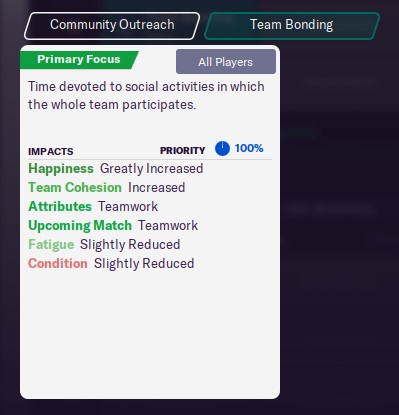 I planned some team bonding to show the players there was more to their teammates than drinking with them. Once we were done with our first week’s regular-season training—with some team bonding—the only thing I would be able to do, having only one day open to me, was to get the players drilled on our match tactics then put them in a situation where they were implementing that tactical session in a match practice situation. I just had to hope it paid dividends in the games we were playing.  This setup, of one half-day training, drilling the team on match situations, I hoped would prepare them for the real games they had to play once we were into the meat of the full season. The team would have to do what little they could in our sessions, but I was at least glad to see Grant English had taken the time to consider his permanent offer, and had signed up with us for the year at about £40 a week.  Grant English informing me he’d accepted our contract offer. With all that done it was time to set the team for our match against Canterbury City. I went out to watch the training, to see if any of the subs I’d had in our first matches should be brought in to start, but, in reality, I was screwed for actually filling out the team. I just didn’t have the players to put out a complete squad, the bench allocation wouldn’t even be fully used, and I could barely manage much rotation. Even worse, with Michael Jones injured I had no replacement striker on the bench. I just had to hope with our two front lads on contracts they’d have the determination to see out our upcoming second-game-of-the-season. Then, absolute-loving-disaster struck. The lads who The Fat Man roped in for the short term got the hump when they heard real footballers were coming in to train with us. Before the training session began, Russell Edge, at the point of a mob of The Fat Man’s lads, came at me with a big angry face on him. “You’re not taking us seriously!” he said. I had no clue what he was talking about, other than he looked like he’d throw a brick through my windshield if I'd had a car. “What do you mean?” I asked. “Those contracts, why don’t we have them?” “Isn’t The Fat Ma... Isn’t Mr. Laws sorting you out for filling out the team?” I said. “We won our first game six loving three! And you only offered permanent places to a few guys, the ones scoring goals. Now you’re bringing in lads to replace us.” “That was always the plan,” I said. “You never said you wanted to stick around for the whole season.” “We won SIX loving THREE! We came back after being down three one at half time. Now you’re talking about throwing us on the scrapheap." He paused to draw a deep breath. "If you're planning on replacing us, we’re loving off before you get the chance!” At that statement there was a chorus of ‘Mhmmhmms’ and ‘drat RIGHT!” from the cohort of players standing behind Edge. “They’re only trialists,” I said. “They’re here to train with us. They’re not even able to play in the game against Canterbury. That’s for you. You did well. You’ll all be playing” “And after you see thirty minutes of those lads training you’ll be rid of us, the people who've already put in the graft.” “Not necessarily—” I began, but I felt like I was being backed into a corner when Russell Edge interrupted me. “Either we play on the same terms as Cook and Rihoy or we’re off!” I was hosed. They had me over a barrel with no wiggle room in any of this. Either I gave them amateur contracts or I’d have a training session with a bunch of trialists who weren’t allowed to play in any of our games. “OK,” I said. “I didn’t realise you were all so serious about the team now.” “Was coming back from certain defeat not serious enough for you?” Ricky Wratten, now finding his voice as I backed down, demanded to know. “You’re right, you’re right. It was wrong of me to think you weren’t dedicated. I’ll have amateur contracts for all of you drawn up!” Repeating my words back to me, Russell Edge simply said, “We are right!” then seemed at a loss with what to do. “You know there’s no money in this,” I said. “At least that’s what I think from looking over the contracts.” “It’s not about the money!” Wratten said, getting red in the face again. “No, no, I appreciate it’s not about money. I should have faith in you. I’ll go to the office straight away and prepare the contracts. Alexander will run training and then after it’s finished you can all sign.” And with that, the team were placated. I had every one of The Fat Man’s lads on amateur contracts while the trialists looked on wondering what madness they’d gotten themselves into. 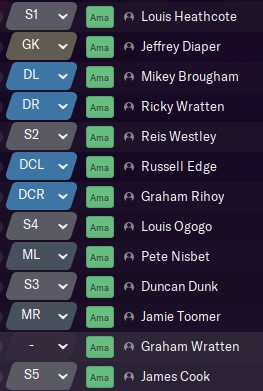 What would be the new status of my team, with every hanger-on on some form of deal. With a few glances from my window, looking over the training grounds, it was obvious my guys were fired up. They were giving all the trialists a right kicking, and I was worried the lads here for just two weeks might not survive their time with The Wells. Despite all that, the 23 year old, John Smith, who’d come in to us supposedly did well. Alexander came up to me after and said the young fella could make a difference. He wasn’t ready to make any appraisal of Smith’s skills, not fully, but from what he saw in just one session the lad was looking decent. 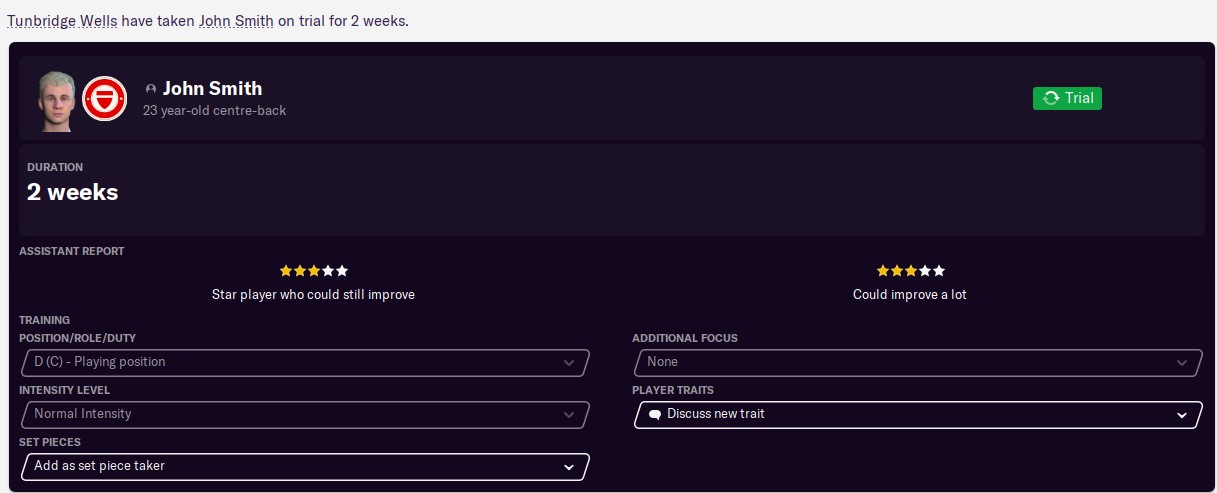 John Smith, the only trialist in our target age bracket, could, maybe, do a job for us. When all the contracts were signed, and with the players heading home talking about being, ‘fully professional amateur footballers,’ I set out picking our team. Nothing had changed. The starting eleven had no unenforced changes, we were going with more attacking football from the off, but who I picked was more-or-less the same as last time, barring injuries. What I had done, with some swift back-pedalling, was avoid a mutiny that would end up with Tunbridge Wells unable to field a side. 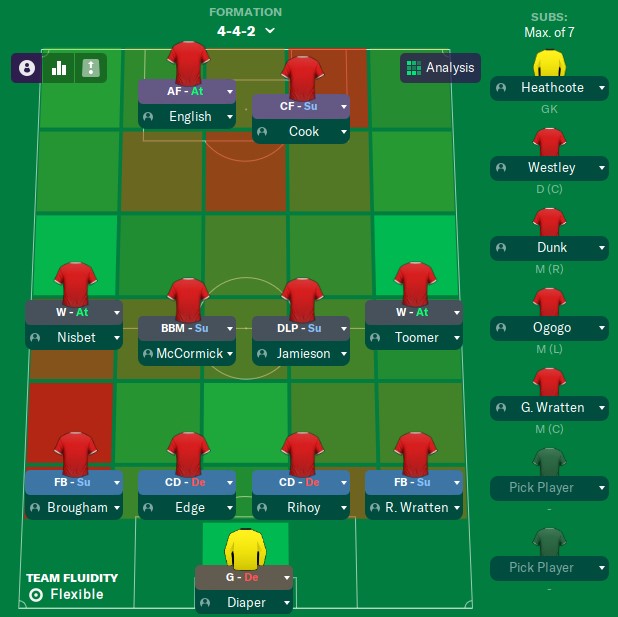 A team of mutineers to face Canterbury City. The same team as the last time, but now fired up and angry. I just had to hope the lads could continue how they began the season now their demands to be taken seriously were recognised. Maybe it would all, maybe, just maybe, work out for the best?
|
|
|
|
Recalculation Walking into The Other Shoe the topic of Tunbridge Wells’ fully professional amateur players had gotten around. It seemed the lads, high on the allure of a future in the Premiership now they were registered with the football authorities, had been telling everyone their plans to buy a white Land Rover, DJ at Tunbridge Wells exclusive night spots, and establish a social media presence where they insulted kids and generally got to be offensive. My entrance went unnoticed, seeing as Ken the barman (Ken from Kent), along with a few others, were in the full flow of conversation. At the very least I was glad The Wells were a hot-button conversation topic in our pensionable Kent town, but as the conversation got more and more heated I did a quick about face. The signing of players, on the basis of an ultimatum, seemed to have incited passions. I would have been happy to explain my reasoning, that I had no choice, we had to be able to field a team or deal with ten lads disappearing, but sticking my oar into a wholehearted debate among fans might not be the best thing for a manager to do. Whatever about my choices, the press, with all the nuance the press holds, viewed this fully professional amateur team as a poorer squad than when we just had a few lads signed. Despite no-one changing in our actual team, just being contracted, we’d fallen way off in the predictions for how our season would shape up, dropping from fourth to tenth. 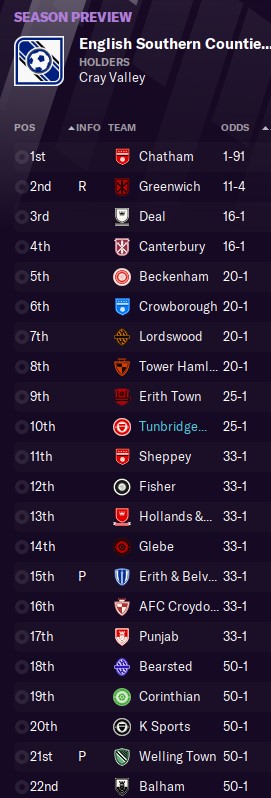 Our new season predictions, having a full team on board. Even walking into our stadium before our second game, checking the odds with the local bookmaker, they were not looking at us favourably. Canterbury had risen up in the oddsmakers esteem. And with transfers happening left, right and centre, teams strengthening and weakening, no-one had any real clue about how everything would shake out by the end of the league. 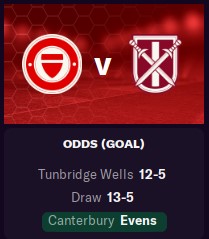 We were not well favoured in our home match. Most of all I was concerned The Fat Man, who liked winning and didn’t like losing (a very simple mind, he had,) would not appreciate the upsets in what was happening with me having no real chance to build a team. He wanted fourth or better, and the gambling sites and media did not think this was possible. With the new predictions for the team worry took over, or maybe more anticipation, facing into the match. With less than a minute gone, fifty seconds, in fact, anxiety was obvious from the team as well. We’d given away a free kick 15 or so yards outside our box. The Canterbury player sends the free in, and my worst fears are confirmed, everything is going to slip away from me. Two Canterbury players get clear of our defensive line and in their charge manage to head the ball beyond our keeper, Diaper, and score a goal with less than a minute gone. I’m fearing the worst for the rest of the game when the ref blows his whistle, and instead of pointing at the centre circle raises his hand for an indirect free kick. Canterbury were offside, but it’s still not the best portent for what may play out. 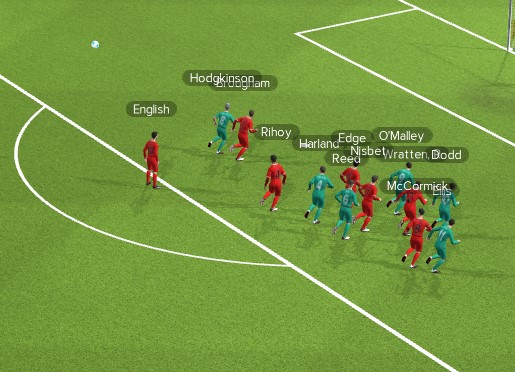 The ball in flight from a free kick, with Canterbury clear ahead scoring a goal, but they were offside. Immediately I change our approach to be more cautious, and things settle down for a few minutes until Toomer receives the ball on the wing. Excited after seeing what he did in the previous match I stand out of my seat. Toomer lays it off to Cook who spots English breaking off his defender. English controls the ball brilliantly, bringing it into the box, but the rushing defenders are closing down. English shoots, but the Canterbury keeper parries it away.  A harried kicked shot means no goal for English. With thirty-seven minutes gone there’s not a lot to show for our efforts. We don’t have control of possession, Canterbury look dominant, but we get an attack. The ball is sent wide by Jamieson but a Canterbury player intercepts, heads the ball to his midfield and a long ball is sent to the sprinting Canterbury striker O’Malley. He gets ahead of our defenders, and is charging down on goal with a free shot. I’m expecting the worst, but, luckily, he blares it over the bar. If it was on target Diaper wouldn’t have stood a chance. 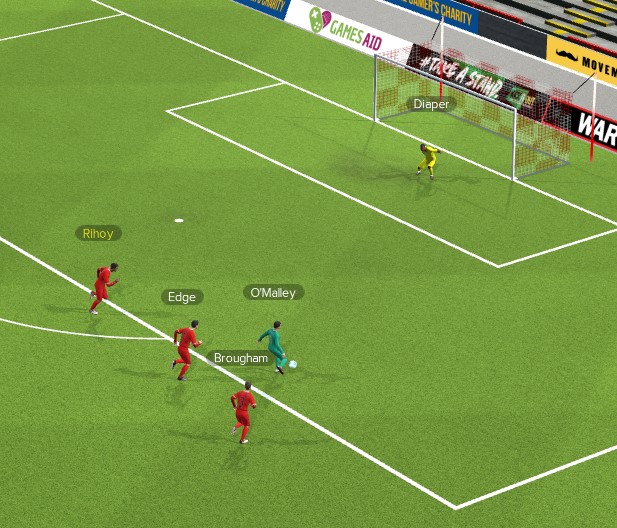 O’Malley skies his shot. Half time comes and McCormick looks absolutely wrecked, meaning I’m forced into some changes. I bring Wratten on for McCormick, but before that I bring out the hair drier. It’s not the most subtle of motivational methods, but I tell the team I am not happy with their performance. A few lads look nervous, but others are looking a bit more motivated. I have to hope they pick things up in the second half. 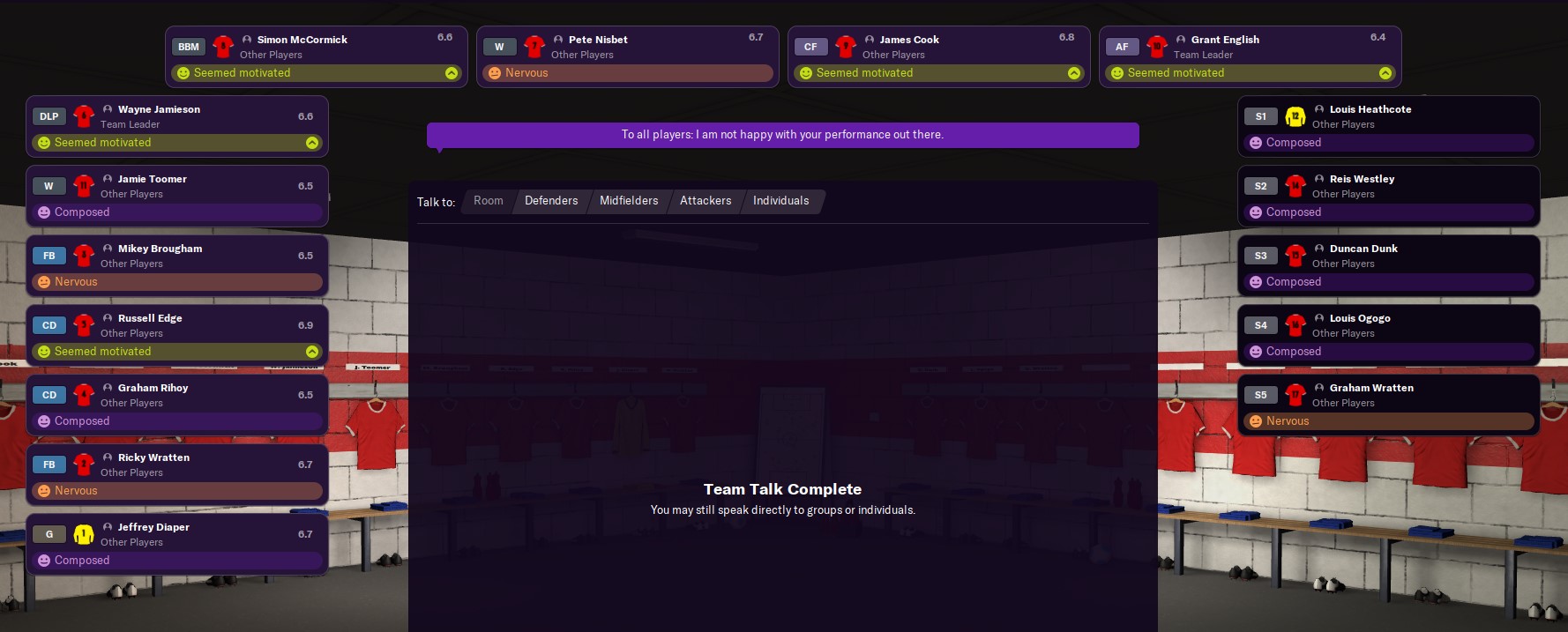 The lads’ reaction is all over the shop when I tell them I’m not happy with how things are going. The second half passes in boredom. I’m looking at the performances of the lads, and what I have left on the bench, which is not much. Brougham, Toomer and English, our performers from previous matches are all doing poorly. To make myself doubt, in the 68th minute, a ball is lobbed into an attacking midfield position, where Toomer heads it onto English. Toomer has done will with that one and I begin to wonder. English is running free and I’m certain he’s going to score. He gets into prime position for a shot, just beyond and to the right of the penalty spot, and hits it straight at the Canterbury keeper. 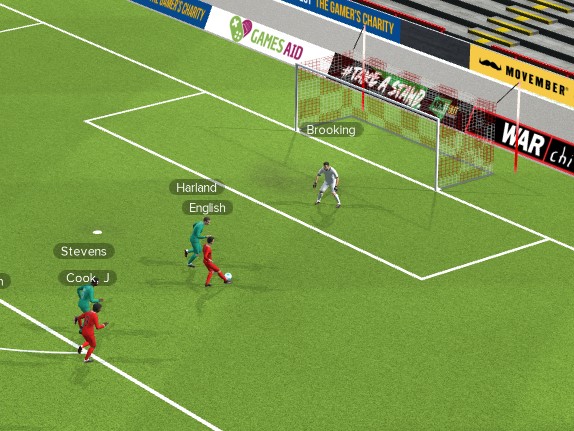 English proving he’s not having a great game, by knocking the ball right at the Canterbury keeper. I don’t have any attacking subs on my bench, not with our injuries, although Toomer is showing something on the right, where all our attacks are coming from. The problem is English has fluffed the chances he’s got. I do the only thing I can, and switch around Cook and English in their roles up front, hoping Cook gets an opportunity and bags us the one goal I think will be needed to win the game. Even with limited options, on 75 minutes Jamieson is showing his age, looking absolutely shagged, and I bring Westley on as a replacement. I’m hoping to see some effect from my changes, but my worst fears are confirmed. We are not putting in a performance. Canterbury get a cross in from the corner, and O’Malley, despite having three defenders in front of him, has a clear header on goal. The ball is seeking the net, beyond our keeper, but the post keeps it out. Despite this I want a win. I think our team is deserving of a win and has the skills to achieve it, but keeping it to a draw could be a good result from where I’m sitting with fifteen minutes left, as our strikers miss every opportunity, and the woodwork is saving us from O’Malley. 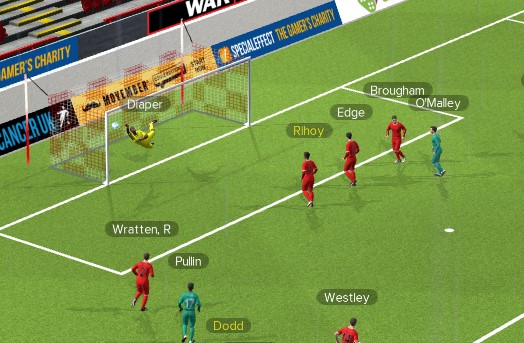 The post saves us. With less than eight minutes left Ricky Wratten follows my tactical instructions and sends a long ball through to Cook, now in a striker’s position following his switch to the right, with English on the left, and I’m thinking, “This IS IT!” Cook’s played OK, but the same thing as the entire match plays out. Cook hooks the ball wide and to the left, when either corner would have had us a goal. Our strikers are just not doing the business in front of the sticks, despite the chances being created! 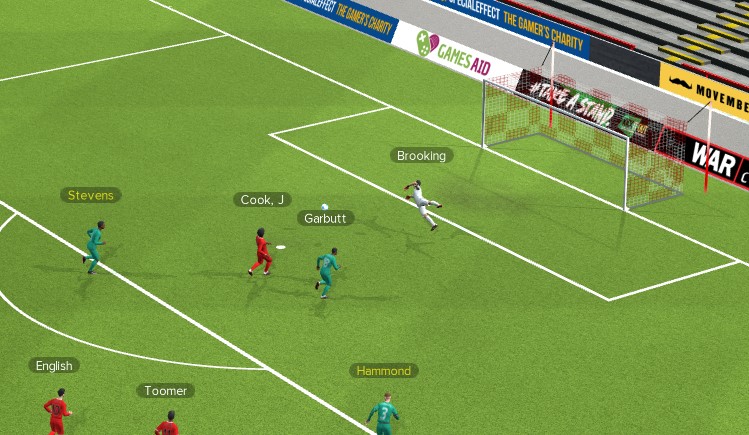 Cook hooking the ball wide as both our strikers prove they couldn’t hit a barn door. In the battle of the long balls Canterbury finally wins out. From nowhere a searcher is put through, and I look for O’Malley, who’s been on the cards for scoring the whole match. I see him get ahead of our defence. It looks like an easy save for our keeper, but that’s not the way the game is going. Diaper goes to his knees, and just off his right the ball passes by and into our net. I don’t know what I’m going to say to the lads at full time. It wasn’t a good enough performance, we had the chances, but they just didn’t convert. 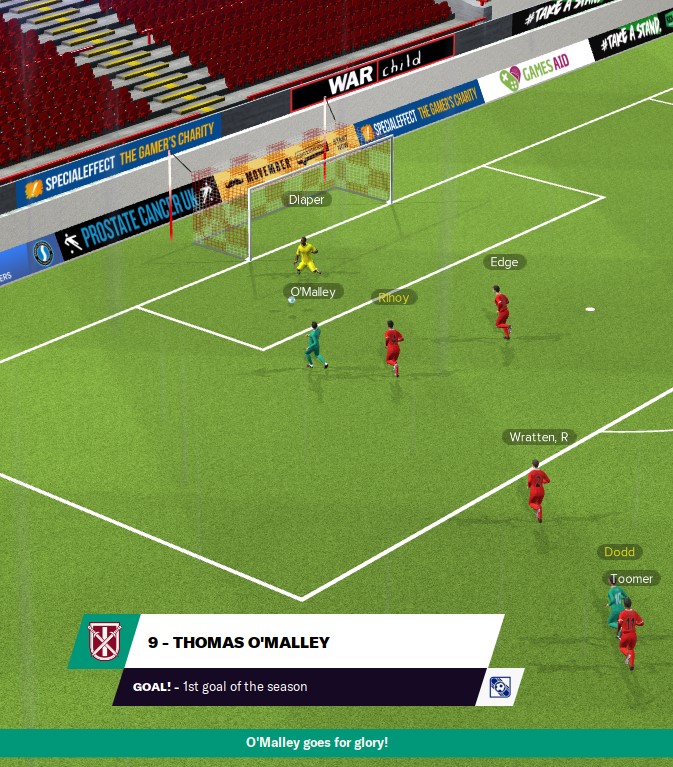 O’Malley scoring as he’d been threatening to do all game. Sam Dicicco sums it up after the end of the game where we lose one nil. What a load of rubbish.  Sam Dicicco giving voice to what we’re all thinking. What was most galling, watching the replay of the game in my office after, was we had the chances. Sure, Canterbury had them too, but we just couldn’t convert. I was at a complete loss with what we were going to do, attacking tactics and defensive tactics are one thing, but I was given a choice, forfeit the game because we wouldn’t have the players, or sign them and let them rest on their scant laurels; big ball lads now with contracts. I wasn’t sure which was the better option falling asleep that night, accept the inevitable, or prove we were shite. What I did know was that we had only a few games before the trials of the guys training with us were over, and whatever about signing young players—as I’d been instructed—I’d do anything to have a solid, quality team who didn’t vacillate between useless and coming back from seemingly nothing. 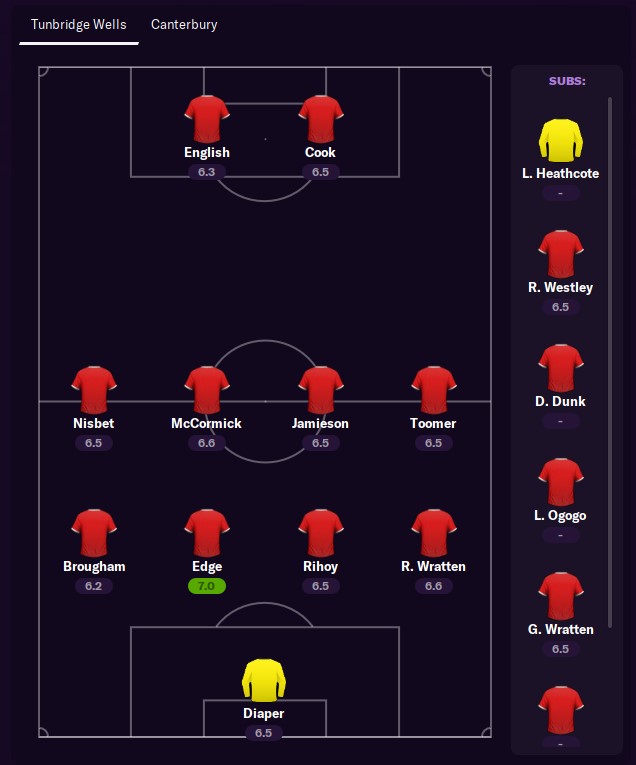 What was going through my mind as I fell asleep, how our lads failed to perform against Canterbury, despite the Billy Big Balls contracts they all demanded. Most of all, haunting my dreams, was my concern for our upcoming games. We had Chatham up next, who’d won their opening fixture 4-0 and scored three in their last game while being predicted to top the league, then it was onto Beckenham Town, who’d started strongly, winning 4-2 at home and 6-1 away. A series of losses would mean I’d be back to being just a greenkeeper, if The Fat Man even allowed me that.  Our next two games, against two sides who’d started very strongly.
|
|
|
|
Horoscopes, Odds and Chance It was a fit of pique, I knew it was, but there was some truth to it as well, especially for a guy who was on a money contract: I got onto Grant English intending to have a quiet chat and let him know he needed to be a bit more focused, his performance simply wasn’t good enough, but I actually went a little hard on him. I knew I’d end up doing this many times throughout the season, but this was the first time I was to chastise a player, and I was driven by emotion. Regret too—to a degree—that we’d lost, and I was placing my bitterness on English seeing as I could focus on him having been the one who missed the shots. I wasn’t sure how what I said would work out—as I said it—and that’s not a good thing for a manager. I wasn’t quite the level-headed boss making the informed decisions for a team of naive kids I should have been, at least not in my frame of mind. English had the opportunities, he was on goal quite a few times, and despite his team providing for him he’d wasted their hard work. I told him, plain-faced, he’d squandered a lot of chances and it wasn’t good enough: a risk not knowing how he’d react; whether it’d crush him, or he could, maybe, get even further flustered. In fairness to him, he took it on the chin, agreeing it was unacceptable and saying he’d do better. Whether his stoicism in the face of my criticism was the sign of a strong will, or that he was paying no attention to me I couldn’t tell.  Grant English agreeing he wasn’t good enough in front of goal in the last match. With that in mind, along with English’s low composure in front of goal, I swapped around our two front men. Cook switched with English, at least while Michael Jones was out, so I was playing English in more of a creators role, receiving long balls, where he’d them lay off to Cook who’d be ready to pounce. Cook would be around the goal face, ready to poach a score with whatever came his way, something that could work out with his more steadfast approach. 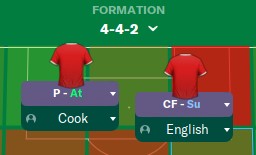 A change up front, swapping Cook and English, and getting Cook to pounce on whatever chances the team created, including those played through via English where composure should matter for less. With the match against Chatham coming up the bookies had their say, again, and they did not favour us. Chatham were ninety-one to one odds-on favourites to top the league, so for all impartial onlookers it was a seemingly unwinnable match for us, especially considering we were now firmly in the middle of the outsiders pack at a long-shot 25/1. The pre-game match odds also reflected this, with the media even saying we were facing the impossible.  What an impossible match looks like to the press. I saw the headline of the article that was forwarded to me, but refused to read the rest. That didn’t stop me, as the game drew closer and closer, from getting pissed off that we seemingly had a difficult start to our campaign, coming up against the main league contenders. Of course, after a few seconds of anger, it occurred to me that we were simply in a hole, even though we’d only lost one match, but I knew it would take a lot to bring this team through the next few games to where the chairman expected us to be. I was feeling the pressure, and I’d never been so in-the-public-eye before. Even if only 200 fans came to our matches it still seemed like a lot more than just two hundred people were talking about the team, and even me, in our small Kent town. Everyone I ran into in fact. 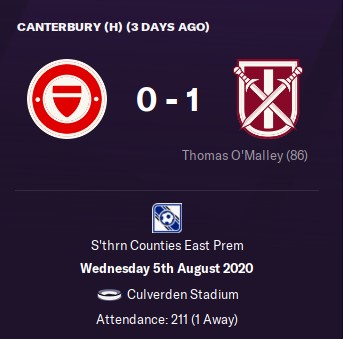 A reasonable 200 or so people at our opening home game, and one away fan happier than everyone else at the final whistle. Talking to Alexander I expressed my fears of what we’d face against Chatham. I couldn’t unload on a newly hired assistant manager how I was feeling the stress, but I could talk about the cause of the stress. “I’m not sure how to approach this game,” I said. “You’ve revamped our defensive tactic, haven’t you?” he asked, but I was fairly sure he already knew the answer. “Yeah, a good few changes since our opener, it’s less extreme now, maybe trying something with our full backs and wingers. But attacking we came back from being 3-1 down, then against similar opposition, with the attacking option from the off, we lost 1-0. If I was looking at any other game I’d say give our front-foot tactic another shout for a ‘best-of-three.’ But Chatham? How they’re positioned? I just don’t know.” 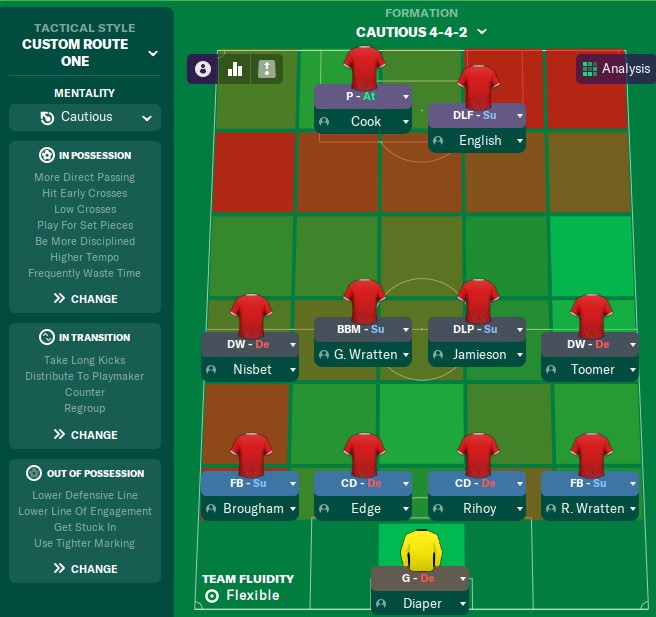 An innovative wide setup, hoping to stop balls coming in at our defense, who were useless in the air, as could be seen with O'Malley's quietener against us late in the game against Canterbury. “You’re intimidated, aren’t you boss? It’s natural,” Alexander said. “I’m not looking forward to it when I’m in charge because I can already feel it from where I am now.” I wasn’t sure if knowing other people were feeling the same anxiety soothed me, but I did know getting fully prepared for the match would help, and my big concern was how we might not have the reaction time with any of my on-the-fly changes to effect the outcome. “It’s more that I’m not sure adjustments can do much for us against a team like that,” I said. “You mean with the players we have? A lack of quality?” Alexander rubbed down his arms, as though he was looking for protection from something, or trying to shed something clinging to his skin. “I wasn’t thinking that, but now I am... I meant that with a side predicted to win the league easily I won’t have much room to claw back a win if things aren’t going our way. But as you say, without quality any change I make is going to have less of an impact.” “What’s your inkling? With how to play, I mean,” he asked. “I haven’t a clue. Do we hold out for a draw? To keep it tight and gain a valuable point against a team that are looking to lead the league, especially with us away from home? Or do we go attacking, knowing they’re going to score goals no matter how we go and we’ll need to beat them at their own game?” Alexander just nodded, not offering any advice. Eventually he spoke up and asked, “How are the staff signings coming along?” “We’ve had a head physio sign, or at least agree terms, so we should avoid what happened with Jones and actually have someone to look after the players from the dugout.”  £50 a week for Justin Williamson to look after our players as head physio was money well spent. “That’s great news!” Alexander said. “Aye, sort of, I suppose. The guy just finished his course. He spent some time as a youth worker, but found he hated kids. He can’t motivate worth crap, but boy can he lay down the law. It’s a gamble, I suppose, and the best we can manage at our level. Not the greatest medically, but some people-skills elsewhere? I’ll take that.” “That’s what you have in me,” Alexander said, fully aware we were all being given a chance we might not get a repeat of. 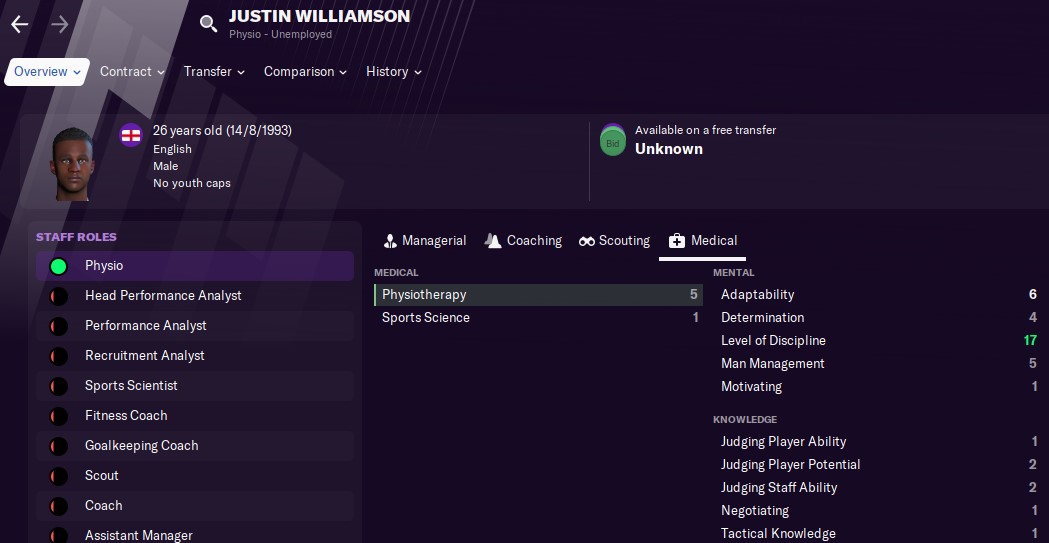 Justin Williamson, our new physio, and his qualifications. “We’ve also got a head of youth development coming in, John Shannon. Brilliant with kids, can spot someone with the ability for our level, but couldn’t tell you what a young fella will be like in five days time let alone five years.” 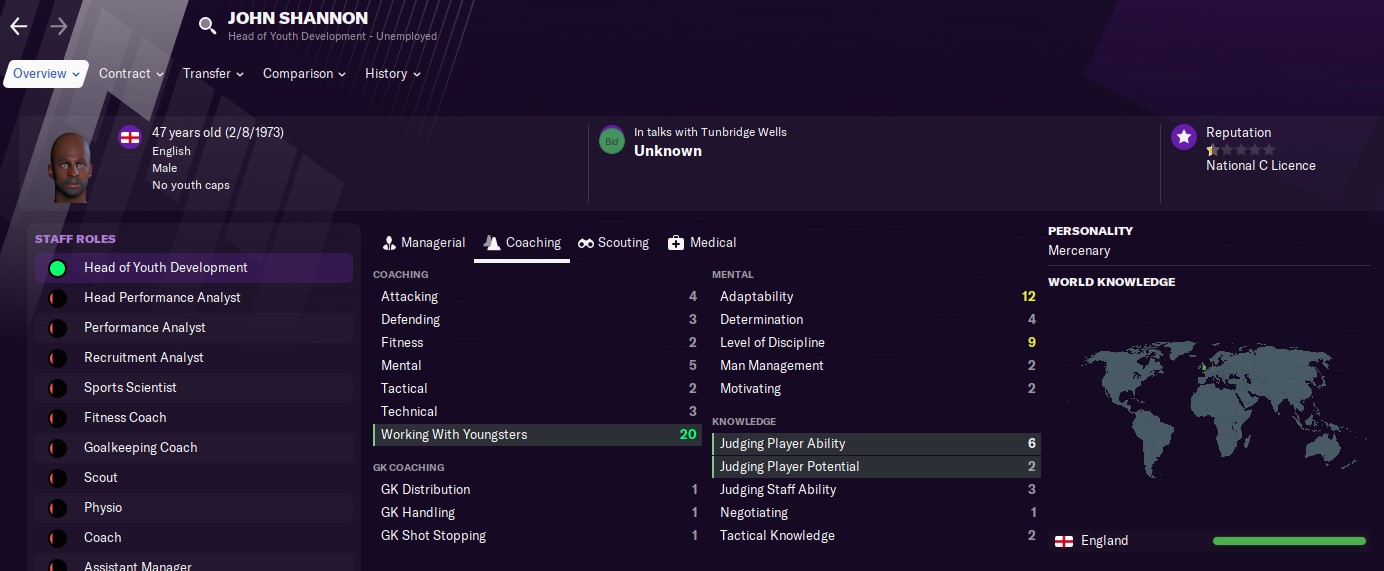 John Shannon, our new Head of Youth Development did will with the young squads, but couldn’t predict their future worth a drat. “That’s what we need, isn’t it? Someone who can bring in some sixteen year old to rip up trees.” I could see Alexander’s eyes light up at the prospect of bringing in some young blood, but I had to talk down the prospects. “Yeah, but we’ll have to give him time with our juniors. I figure we’ll be heading towards the end of the season before he has anyone he can show to us. And even then they might only be good enough for the reserves.” Whether either of us made it to that point of the season neither of us knew. We both met each other in silence, for a few moments, then I said what we really needed in the short term. “Whether our trialists work out or not—strengthening the team— what we have to get is someone to analyse our opposition. At the least show us what we’re likely facing into. Then we can see how we’re faring against whatever tactics.” “Yeah, an analyst would be good, and some scouts to watch our opponents, but now you’re thinking about the match... Offensive or defensive? Beat them at their own game, or absorb their pressure.” “That’s it, isn’t it? That’s the choice.” And we both knew it was my choice. I had my team picked out, although how they were to play I hadn’t yet decided. 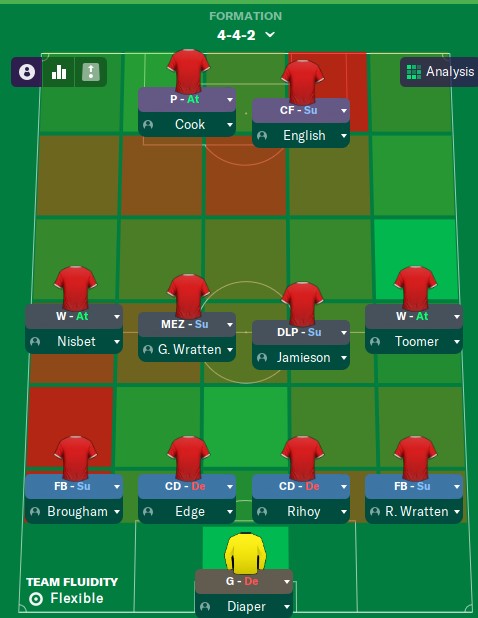 The basic team I’d decided on for the match. With Cook and English swapped, and McCormick in need of a rest, but maybe able to impact off the bench. But I was the boss and it was up to me. All I knew was in that moment I’d appreciate some sign of how the team should approach the game. As Alexander and me went our separate ways, to get a night’s rest before our game against Chatham, I thought I might even take to looking at my horoscope in the morning papers for tactical advice. Mystic Meg might not reveal a lot, but the game against Chatham should show how we could perform against the best in our league, and I knew the fans were eager for us to bounce back. More than eager. I just didn’t know if we could manage it, not in this match, maybe not even in our next.  Our record so far and our upcoming, next two matches. A win against Chatham meant we were on track to do well against Beckenham Town, the league leaders after two games. Losing could mean we end up in a cascade, maybe even three losses in a row after our week played out. And all this was before I even looked at at the matches coming up beyond the next, tense, seven days.
|
|
|
|
Clarity of Intention Waking on the morning before the Chatham game my head was clear, for about an hour, and I did what I never did; I went to the golf course clubhouse. Whatever sleep did for me I couldn’t say it provided me with an answer for my tactical worries, but it did offer me some distance and so some peace. I wanted that feeling to continue, and that brought me to a long walk around the back nine. After a pleasant Summer’s morning stroll, where I batted away thoughts of football, I went into the clubhouse thinking there’d be little Southern Counties East Premier Division chat, but, in a way, I was wrong. Huddled over a big mug of coffee was someone in a textured purple hoodie. I sat a few seats down from them and watched them savour each sip of their Americano. I was tempted to buy one for them so enjoyable was it watching them dedicate so much to aromas and taste. Then they caught me staring. “I was just enjoying you enjoying your coffee,” I said. “Strangely, it’s the best in town, here,” they said. “That’s Roy’s doing, isn’t it? The bar manager?” I asked. “He’s been trying to get the place on the gourmands’ map.” “Are you trying to get some peace before the game?” they asked, and the look on my face must have told all, because they quickly continued, “I don’t mean anything by it. This place is just out of the way, and I know I’d want some quiet time before a big game.” “Yeah, I guess. I work here part time, but cutting grass is zero stress, football management less-so.” They nodded. “Chatham?” “Yeah,” I said. “No one's gonna give you guff for losing to them, no one worth listening to at any rate. Go out there, have a good time, do your best...” “That’s the thing,” I said. The bar was empty, none of the old golfers were in from their rounds, and this person was a complete stranger. I didn’t feel like I was revealing a secret inner turmoil, rather just confirming what most would already know. “I’m enjoying what I’m doing. I’m enjoying managing a team, figuring stuff out, watching the game, instructing the team, as well as winning.” “Do that then,” they said. ”Score some goals, why the hell not?” And it was that simple. Matches were about scoring goals, at least if you wanted to win. But not all games were winnable, and that’s what being a manager was about : picking your battles. Sometimes not losing 3-0 was a victory, sometimes a draw was a victory—no matter what the fans said—and sometimes a 1-0 win was a poor performance that demanded extra work. Seeing as I needed time to think the person who I’d found out was called DCB focused again on rejoicing in arabica beans, and, after a few minutes of a completely empty head, a fully enjoyable experience, I left the clubhouse to cycle to the training grounds with a bit more clarity. I wasn’t a football manager, I told myself. I was just someone doing their best, in a new situation. And you can’t blame someone who’s doing their best, so I shouldn’t put the pressure of the town on myself. Freewheeling down a hill I thought on how it was a fair-old cycle between the golf course and our grounds; there was distance. That’s what I felt when I woke up that morning, a distance between me and the football, and there was physical distance between the golf course and where I was going. People talk about perspective changes, but from far away your perspective is naturally going to be altered. As I hit the turn from down the small hill to a little rise in the road I vowed to myself I wouldn’t let anyone keep me trapped—fan, chairman or opposition—into all football, all the time. At least not while I managed a semi-pro, part time club. And with that, the cycle to our pitches was over without me realising, even if I still hadn’t settled on a tactic to go with. My ambition, however, was telling me to send them out with a somewhat forward approach, and see if it could achieve against a big time team. We’d never have a better chance at testing that setup than early in the season against a big club with all the odds against us. And with that I was decided. Following a lift to our game with Maria there was the usual preparations. Checking the pitch, meeting the ref, the warm ups, then, without time seeming to have passed, I was standing in front of a team of players all in their kits, fired up, and looking at me for guidance. I told the players that I understood we were underdogs and to go out and give the travelling fans something to cheer for, but from their reactions it seems they weren’t thinking very much of the crowd who’d be attending just to watch them. Then I went around the room, to each unit, and told them I had faith in their ability to make a difference. Thankfully, at least a few of the players seemed to perk up at that. 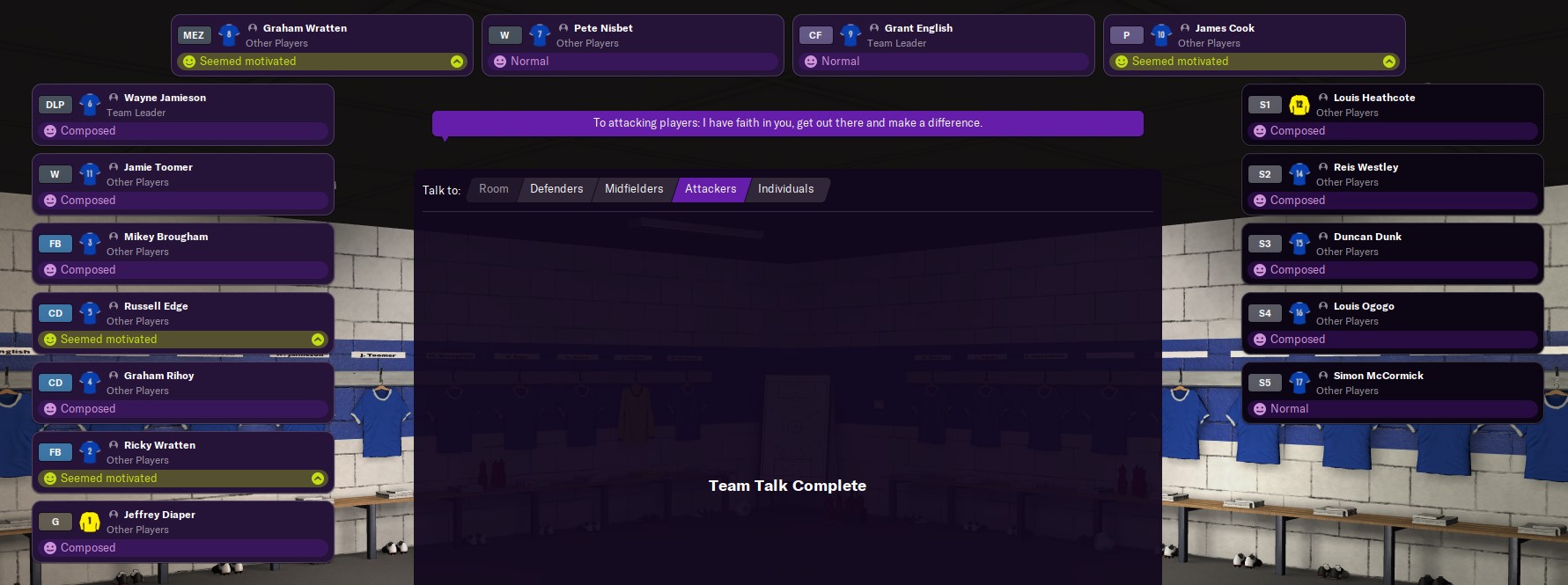 At least saying I had faith in them made some difference with a few players. After that it was out to the dugout and onto trying for an upset. From the off we drive forward, but immediately Chatham dispossess us. That leads to seven minutes of tactical sounding each other out, with neither side making any inroads, when Brougham gets the ball deep in our half. He takes a few touches then sends a long ball down the pitch to Cook who’s facing a strong defensive line. He controls the ball, and immediately goes to strike it from a distance due to his sparse moving space, but it’s straight at the Chatham keeper. 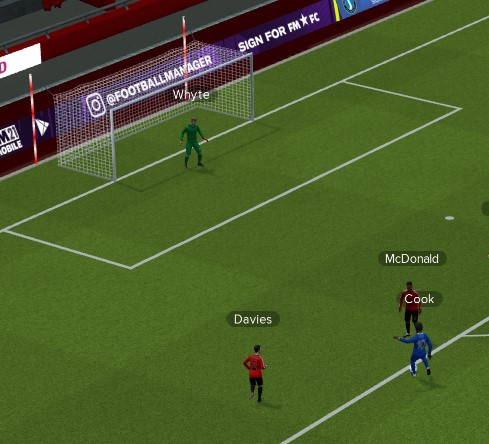 A long ball to Cook’s feet where he takes a quick shot due to the defensive pressure but the keeper knocks it behind. On 22 minutes we give away a corner, and I regret that we haven’t had the time to drill some defensive (or offensive) set piece routines into the team. Despite that, with a bit of knock-about from head to head in our box, the ball goes free to English who’s now in the more passing-forward role, and he sends the ball up to Cook who I’m hoping will do better with our chances. Cook has some space but he doesn’t have the pace. The Chatham defence close him down as he trudges forward, and he’s left hooking the ball so wide it almost hits the corner flag. 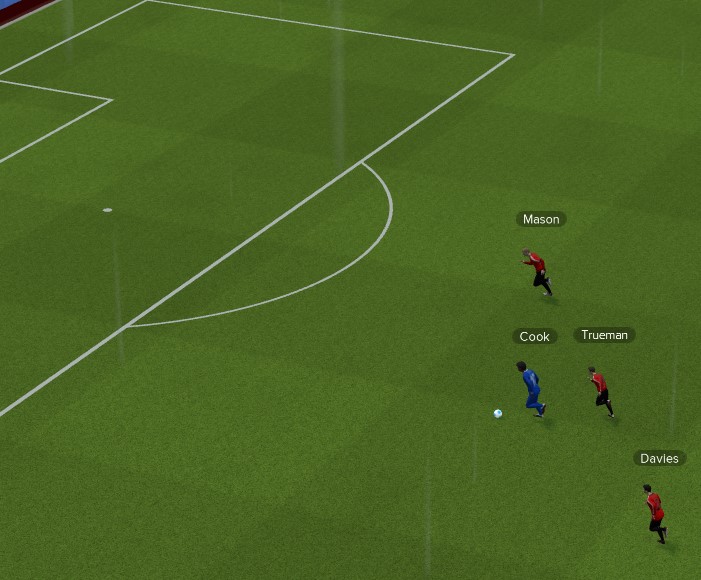 Cook gets the ball but he just doesn’t have the pace to get clear and turn it into a real opportunity. We're showing some promise in these moments, even if the previous attack came from a Chatham corner. The lads are doing well, even if it was only a half chance sent miles wide, but they're showing they can make an effort. Then, straight from the kick out from Cook's wide miss, Chatham’s keeper, Whyte, loses his own man and sends the ball to Edge. Edge knocks it down to Nisbet who finds Cook off a defender’s shoulder. This time Cook has a start and is clear on goal. Whyte comes out to meet Cook, and Cook lobs a ball over him. We’re about to get the reward for our early efforts but Cook's strike is too heavy clearing the ball over the bar, and I’m left worrying if it’s going to be another case of ruing our missed chances for the second time in a row. 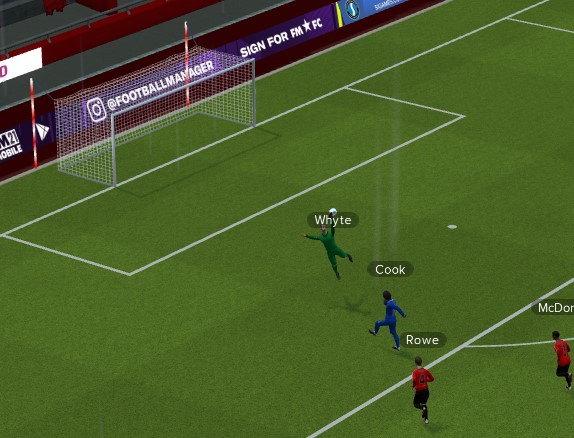 Cook getting the ball over the keeper, but also over the bar. Our lack of training turns out to be a problem after 30 minutes. We give away another corner and show no ability to clear the ball. We get it to the edge of the box and Chatham send it again, we clear it wide of the box, and Chatham send it in yet another time, and now the numbers are showing through with Rowe finally getting Chatham’s opportunity, scoring a free header, and putting us 1-0 down after half an hour. 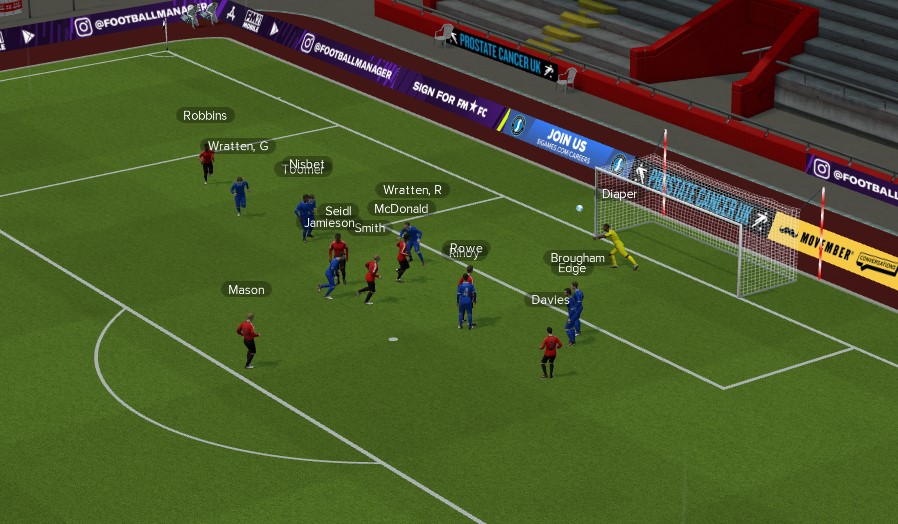 Our lack of drilling on corners lets us down with Chatham applying pressure from a set piece and scoring a goal. We’re on the attack, and I’m thinking we’re ready to bag a goal back and tie up this game as Nisbet tries to get a cross in but it’s blocked. It falls to Brougham who also gets a cross blocked, and now Chatham are on the attack. With a quick retreat we shepherd them down the wing, with all their runners far behind. The Chatham midfielder pulls a cross back to Hibbs, who, somehow, manages to bang one in from god knows how many yards out. It’s a screamer and our attacking experiment seems to be over. 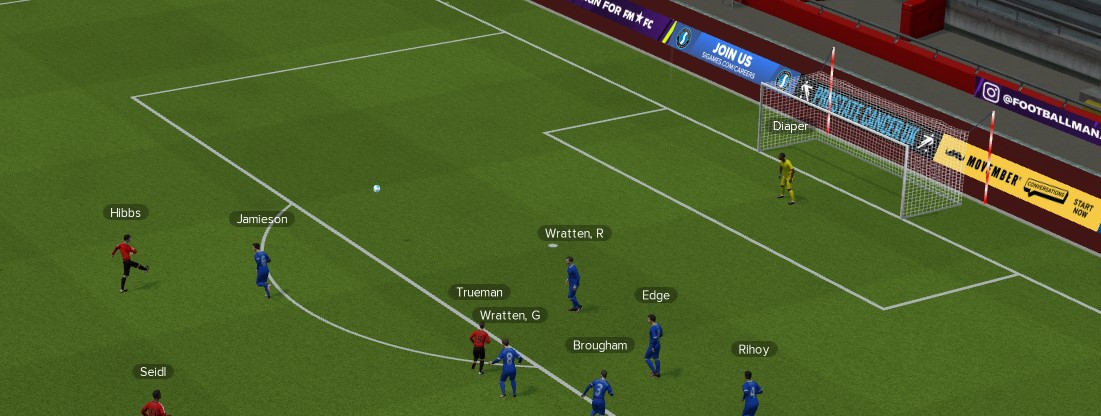 Hibbs humbling our keeper from 20, 30? yards out and putting Chatham 2-0 up. Just before half time we get two chances, Cook with a snatched shot from just inside the box, and a second where he tries to chip the keeper, but Chatham’s Whyte is solid behind both. Yet again we’re getting chances, but just not doing anything with them. This time, though, I have to give credit to the opposition keeper. Anyone else and we’d be drawing two all. At half time I take Jamieson off. He’s not had a good game, and bring McCormick on who looks eager to prove himself. The half time talk is a lie, I tell the team they’re not playing well enough, but really we’ve just not had the breaks. The team takes it well, as I intended, and look fired up going into the second half.  I bring a fired up McCormick on for Jamieson who’s not had a good match. The second half is a quiet affair, especially as I get us playing with a bit more caution—but the same tactic—to keep it to just 2-0. Chatham are playing with the confidence of a winning team, relaxed and sparing themselves, and it’s only on the 72nd minute when there’s anything to talk about. Unfortunately it’s for Chatham, who put a long ball over our defence. Thankfully, despite the advantage from breaking free, the angle is tight, with Diaper cutting off the shot and Brougham's last second tackle diverting the ball behind for a corner. We've stopped a chance, but Chatham will get another go. 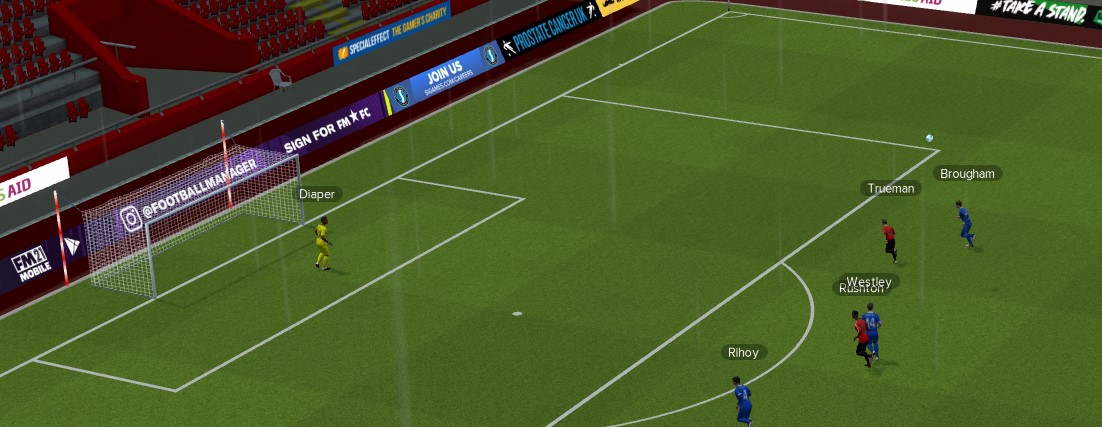 Our defence getting skinned, but Brougham recovers for a fantastic sliding tackle. From the resultant corner the ball breaks free for our advanced man, Cook. He lays the ball forward for English who gets ahead of his defender. I’m wondering if English has the pace to go on, and the composure to finish, when the defender brings him down from behind. I’m screaming at the referee for a red, he was the last man back and if it wasn’t for the foul English would have had a clear goal scoring opportunity but the coward only shows a yellow. From there Toomer has the free kick, and knowing what he’s capable of I’m thinking if we score here we’re in with a shout. Toomer curves the ball around the wall but there’s not enough bend on it and he sends it wide of the post. 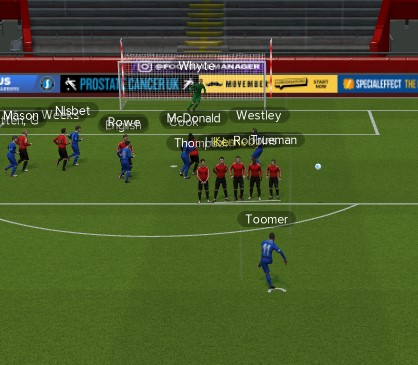 Toomer can’t repeat his magic and bring us back to just one down with a free kick outside the box. Not a minute later, from the goal kick, Gary Wratten heads the ball down to Cook, who sees English ready to take the ball forward. Cook puts the ball in front of English, who takes it to the goal and scores. I’m still thinking on the missed free kick and barely had a chance to worry that English would miss his opportunity, but the lad made good on his promise and delivered us a goal. I’m just worried that it’ll only be a consolation. 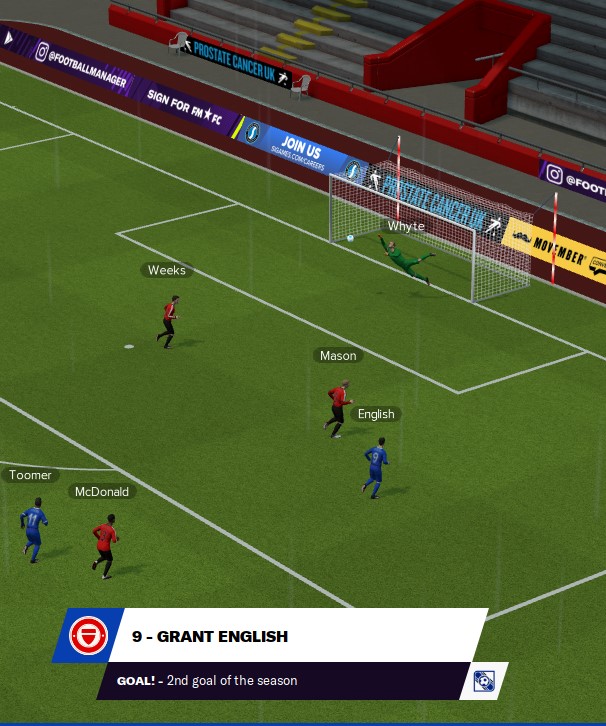 English making good on his assurance he’d do better after our last conversation. I’ve already brought Westley on, but a few minutes after our goal I take Toomer off. His head has dropped since we scored, he just doesn’t seem right, especially as Chatham have reacted and put a few balls into our box in the minutes after. Thankfully none of them have been too good, and with thirteen minutes left we might still have a chance at snatching a draw. Chatham’s reaction continues onto 80 minutes, with them knocking the ball around like superstars while our defence can’t pick them up. The ball goes wide, Chatham’s Kennedy brings the ball into our box and Brougham slides to take the ball off him. It’s a brilliant tackle! The referee disagrees, however, saying it was Kennedy knocking the ball ahead and Brougham taking him down. As he blows his whistle and awards a penalty I’m thinking, “BULLSHIT!” and can even hear a few Chatham fans in the stands saying they lucked out with that decision but I know the match is over now with Chatham going 3-1 up. 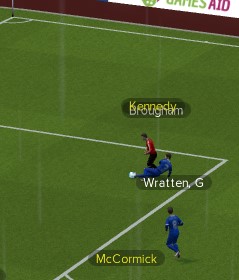 A penalty for Chatham. We certainly haven’t had the ref with us this game. With the match over, I looked at the lads and told them they were unlucky. This didn’t go down too well, even though I felt it was honest, and they look devastated with my comments. It seems they were looking for someone to scream at them, and tell them it wasn’t good enough. Someone to show them they were capable of better, but I’m just not sure they are capable of more. Our defence is leaky, we leave the opposition get the jump on us far too often, and no matter how we score—even with a bit of luck—a team giving away cheap goals cannot do well. I just have to hope some of the defenders we have on trial are willing to come in with us. But with only one training session a week I still haven’t seen enough of them to know how they’ll fare. I'm banking on luck, both that the team will come together in our games, that they'll not give away too many opportunities, and that the players we might bring in can step us up a level. We're not assured enough to dominate games to a win, and relying on luck to bring things together for a lesser side is never going to work out. The next match we’re facing is Beckenham, who were leading the league before today’s games—games I haven’t seen the results of—and I know it’ll either be changing things up with our defensive tactic, zero points from nine would not be good enough, or I’ll be getting them to play the style that did get us one goal, just with a bit more of a hesitant approach. My big hope, however, is that maybe one or two hastily signed players in defence could be enough to give us the edge and stop our net from rippling with regularity. Whatever I end up doing, I just know I need to stop this slide now; a hard ask given who we have up next.
|
|
|
|
Not Doing Much It was dawning on me I was actually doing very little managing. We only had a certain amount of players, not enough to rotate the squad, pick who was in form, or find a guy eager from the bench who was rearing to be given a shot and make a difference. When it came to tactics a 442 was our only real option. A system with wing backs piling forward in attack and screaming back on defence wasn’t an option because we had no wing backs. A patient, control possession system, with three attacking midfielders wasn’t an option because we had no attacking midfielders. Thinking about the Monday training session I feared I was simply a signature on the team sheets. I had no tactical nous to be able to grind out wins, or even take a surprise lead against better teams, and against weaker teams it was a question of whether the team performed as they were capable. I had very little control over anything. With that in mind I knew I had to increase my ability to make a difference. Straight after our match against Chatham I sent in a request to the board asking for me to do a coaching course. It would only be the very basic level, National C level, but it should give me a better view of what I was doing, and allow me to prepare the lads with a bit more insight. At the back of my mind was that if everything went south with The Wells, it might even open up options with other teams.  Me requesting to be sent on a coaching course, with the board having to get back to me. We took a few more lads in on trial, with the confirmation they’d be coming in happening while we were losing to Chatham. And it was straight after the match the press were onto me. I was expecting a local newspaper wondering why we were quite so awful, but it was actually some young fella from Sky Sports asking about a lad, Bevan, who was training with us. I had no clue what he was like. No clue who he was, even. I just accepted anyone who wanted to train with us in hope they’d prove useful and would be willing to sign a contract for not much money. The Sky Sports lad wanted to know how interested we were in him and I said the only thing I could at that point—the whole purpose of bringing him in was to see how things would work out. 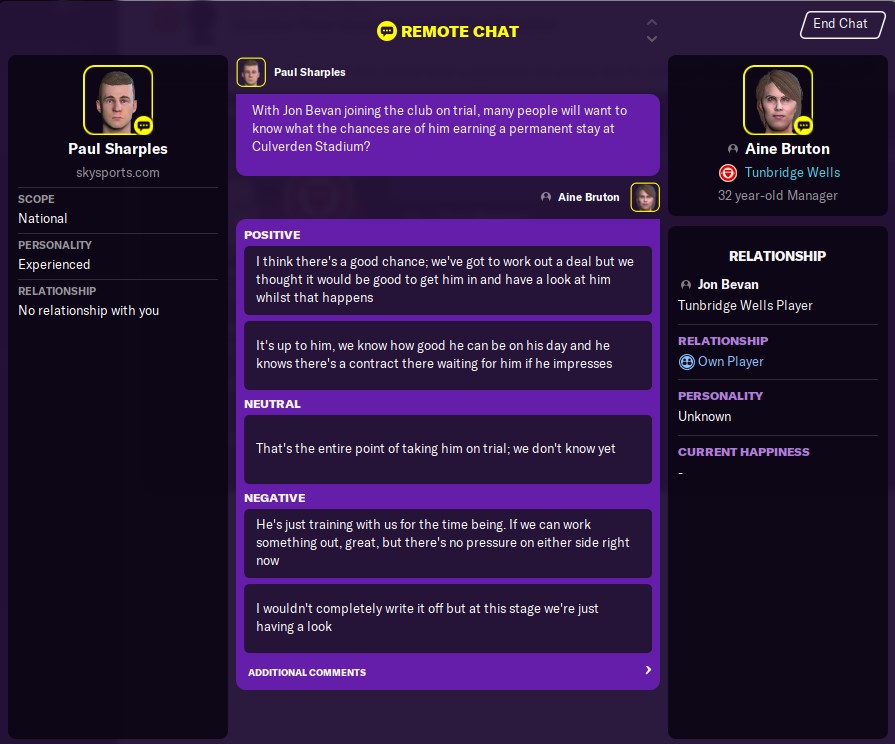 I didn’t want to get anyone worked up about deals, or not, and told the press we were just looking at the lad coming in to train with us and we couldn’t know anything yet. Even with the trials we had, and although both our fullbacks were the weakest positions we had on the pitch, the lad in with us, Ben McGarry, showed no ability there. I hadn’t even seen all of what he was capable of, but I knew he wouldn’t work out. I didn’t want to lead him on, so ended his trial. 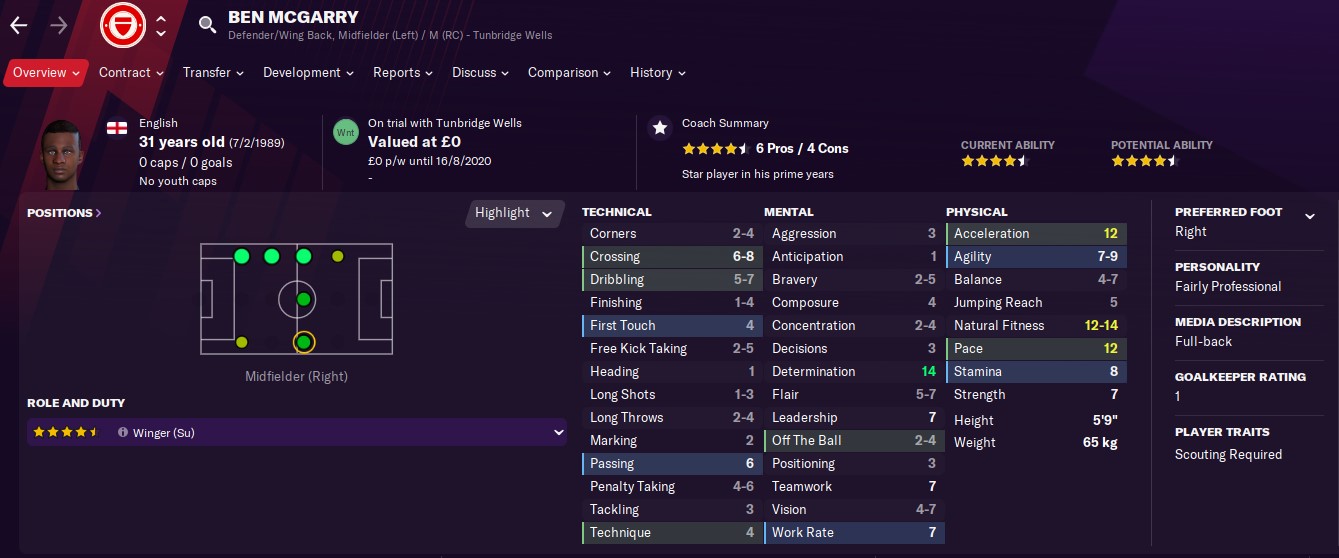 The fella, Ben McGarry, who we told we wouldn’t have a spot for. John Smith, the central defender, was a different case. He was absolutely rubbish when it came to playing football, but at stopping the opposition he wasn’t half bad. He had as good as, if not better skills when it came to shutting down attacks in comparison to the lads we had on our books already. Beyond that, it looked like, at an in-our-age-bracket twenty-three years old, he was willing to work his arse off on the pitch. 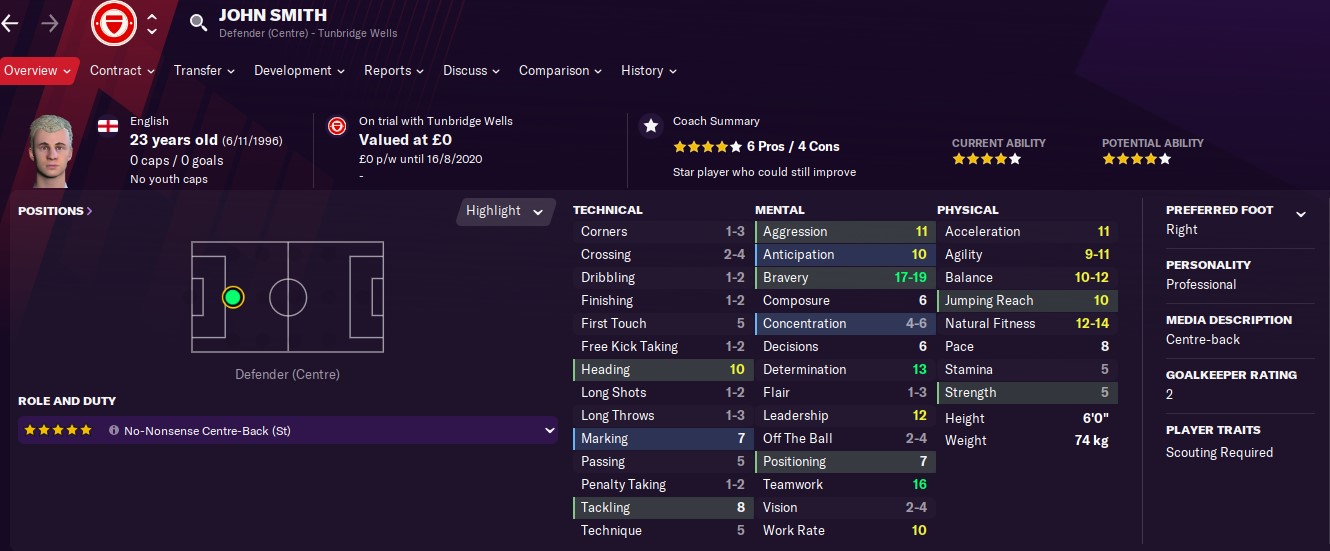 John Smith had a lot of holes in his ability, but where it mattered he might be able to make a difference for us. With that in mind, and knowing we had other lads on trial with us, I tried a low-ball offer. I proposed an amateur contract with him, just to get him on our books and into the team, and I’d see what he was like before, maybe, offering him some cash.  I offered John Smith an amateur contract, and it seemed that was all he wanted. I just had to see if he was using this to gain interest from other clubs. While that was happening I had word back from the board that they were happy to pay for me to do my National C coaching course. Now it was a case of seeing how far I’d be able to ride their willingness to train me up.  Confirmation from the club that they’d be happy for me to do my first coaching badge. One thing I did notice, going through my paperwork after hearing about my coaching course, was that the game after our Beckenham match was actually a friendly? It must have been a hangover from when The Fat Man was trying to pack as many fans into the stadium as possible, with the speakers in the grounds blaring ads for The Sheep’s Head. That was an easy decision for me, something I could actually make a difference with, and it was cancelled so we might actually get an extra training session or two under our belts. 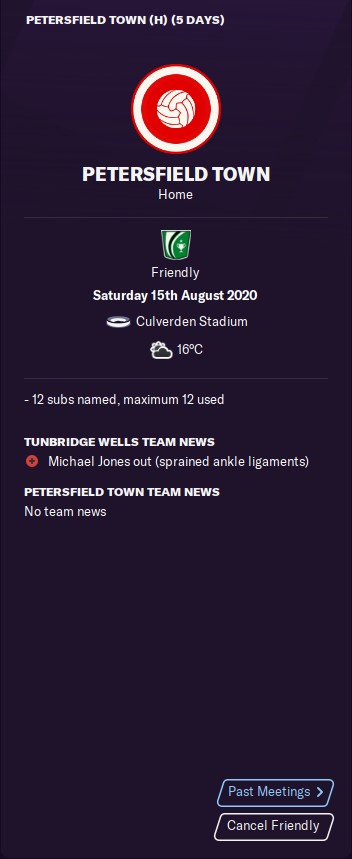 Cancelling our friendly against Petersfield that was only a tool to get punters through the gates. Then it was onto the Beckenham Town game. Yet again the press said we were, “Facing the Impossible.” I made a few changes to the team. Nisbet hadn’t done too much in the previous match-ups, and there wasn’t much difference in ability between him and Ogogo, so that was an easy swap to make, just to feel like I was doing something. Apart from that, after his rest, I brought McCormick back in to play in the supporting Mezzala role in midfield. I thought we were in for another round of rearranging deckchairs, with me not doing much to affect the outcome, when I had news that Smith had signed, and the fans were ecstatic about it. 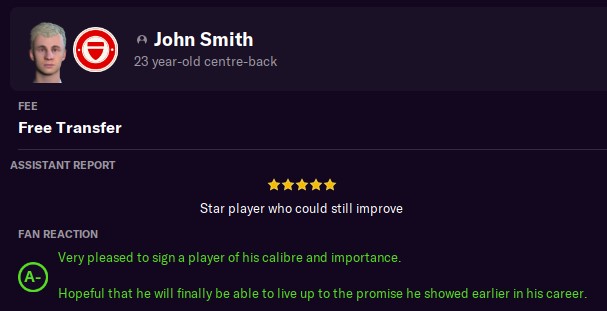 The fans are delighted that we brought John Smith in, even if he hadn’t proven himself anywhere quite yet. With one day to go our match I was gearing up for another battle on the pitch, when Maria let me know there was absolutely zero response to our ad for a chief scout. Instead of a night relaxing it meant, for me, it was back to trawling through the database to see if anyone would come in. We desperately needed someone who could take stock of what the teams we were due to play against were shaping up like.  No-one wants to sign up to scout for Tunbridge Wells in the ninth tier of football. My initial forays through the Chief Scout database brought about a relatively poor response. And by relatively poor I mean no-one wanted to work with us. It was either a case of people not being willing to move to Kent, which was fair, or they simply didn’t see Tunbridge Wells as the best move for their careers; they thought they were better than us. And they were probably correct. 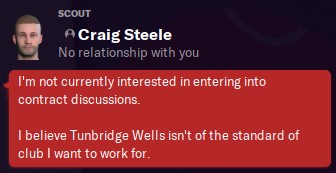 The seemingly practiced response that Tunbridge Wells isn’t of the standard of club a scout wants to work for. I had to try something different. I set the search in the database to find any staff member, for any role, coaching, managing, assistant manager, scout, physio, whatever, and looked through guys with no experience under their belt. I was hoping that someone, someone local, would be desperate to get that first job post that could lead to better things in the future and be willing to sign up with us to get a start. That inkling turned out to be correct. A lad called Callum Batt, nominally an assistant manager, was happy to come on board with us. He could be of a bit of use when it came to looking at players, but really I needed him to watch video (phone video, we were very advanced, and, of course, extremely well funded,) of our opposition and see how they generally set up. Callum hadn’t a tactical bone in his body, but like all our staff, I guessed, he’d have to be one for the future. At the very least he’d be able to see what formation the opposition preferred, which is what I needed. 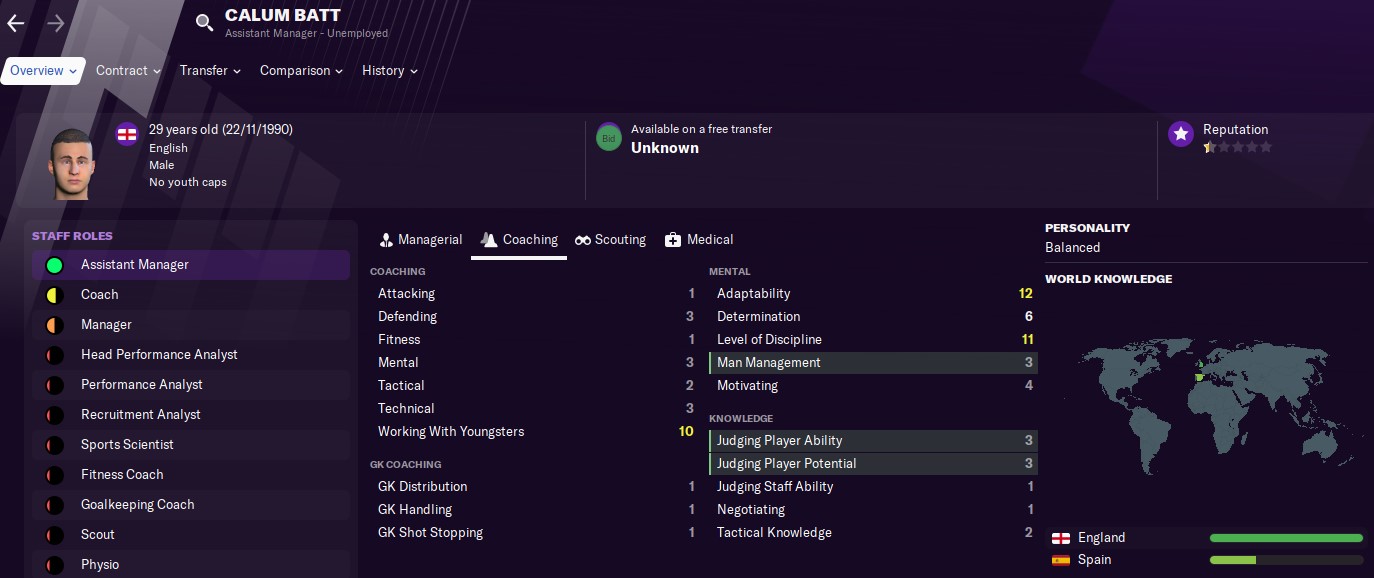 Callum Batt had absolutely nothing to his resume, which was about right for the level of staff we could attract. Figuring out my little off-brand approach to the database I signed another coach, as well. We’d have to do without goalkeeping coaches or fitness coaches, we just weren’t deep enough in our staff allocation to manage that, but approaching Steve Chambers to sign with us I had one thing in mind. We’d have to be able to train up all our staff as the team also developed, and so we’d need an excess in coaches to manage the extra load while another member of staff worked on their badges. Steve Chambers (and Alexander) would fill in for me while I took my National C course. And I’d do the same for them, presuming they didn’t disappear off as soon as they had some experience. 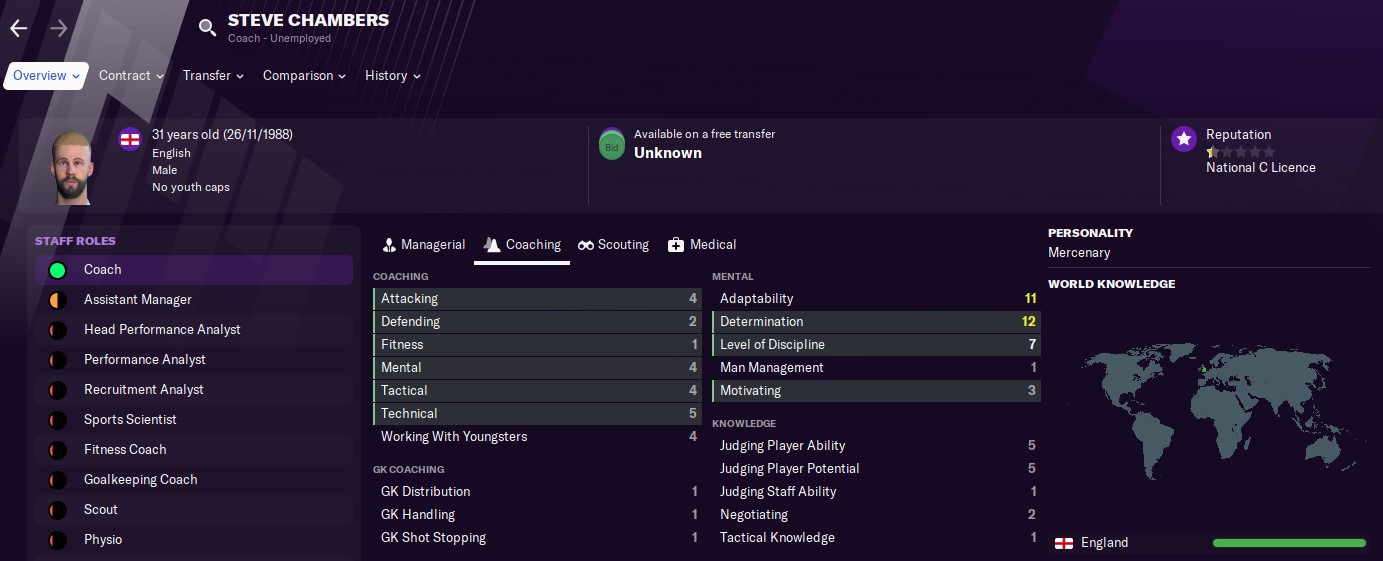 Steve Chambers’ CV And that was how what I expected to be a quick few days with not much to do before our Beckenham match actually turned into a mad few evenings where I was scouring databases, signing players, and bringing in coaches. Whatever about having a team that could adjust to on-field situations, we were now almost set up in a way that the backroom was the best it could be—at our level—for whatever was thrown at us. The final thing for me to do was to pick the team to face Beckenham.  Who’d be lining out against Beckenham, and, finally, we were getting close to having a full squad, even if there was no room for rotation quite yet. With just hours to go, and the team picked—including John Smith's debut, which I hoped would delight the fans—I had to decide how we’d set up for the match. Thinking back to the second half against Chatham, I knew we’d only let one goal in with our cautious approach in an attacking tactic. And that was a penalty. Whether it was a case of Chatham sitting back having already gotten the win or our team performing I didn’t know. I did know I’d have to give these instructions a chance; especially with our new signing, John Smith, coming in to shore up our defensive line. I just had to tell them not to give away another penalty.
|
|
|
|
Kick It Up Having gone from feeling like I was doing nothing to prepare the team for their games after our Chatham loss, things took a drastic turn afterwards. Sure, it was a lot of backroom work. I signed a player, signed staff, started a coaching course and generally stayed locked in my office, but it was that busy-ness that brought me to our stadium without time seeming to have passed. The players had done their warm ups, and were generally looking nervous, and it was time to rouse them to action. Ogogo was sitting looking the same as he did every other match despite starting his first game, while Smith showed no emotion in what would be his debut for us. 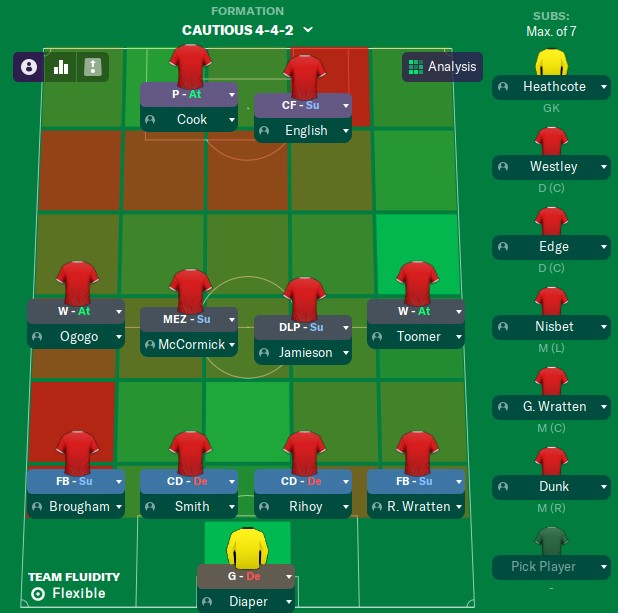 The team, including new starters Ogogo on the left and Smith slotting into defence, while McCormick was back after his rest. I told the players it was time to put an end to our poor run of form, but they must have looked at the odds beforehand and been thinking the worst because it garnered no reaction from any of them, even from the few guys looking a little nervous.  My team talk had no effect on any of our lads. Instead I went around the room, following my old trick of telling each unit I had faith in them to make a difference. At the least both English and McCormick perked up a bit, but it seemed the team had little confidence in what I was saying to them.  Only McCormick and English took support from my encouragement, but at least English was one of our strikers in front of goal—even if it was our defence that was leaky. As the team walked out Alexander expressed some doubts about our cautious approach, not that I should encourage the lads forward a bit more, rather the opposite. He was daunted by what we were facing into and thought I should drag everyone back and get them to park the bus. I wasn’t ready for extremes, not this early in the season, so I just ushered him to the dugout where we waited for the match to kick off. And a few seconds later, we had the ball. The game had begun. Immediately Smith is marking his debut, intercepting a badly placed long ball from Beckenham. After some to-and-fro in the middle the ball is out wide to Toomer. I think he’s going to be tackled—putting Beckenham on for the counter— but he does well to send the ball into Cook—who’s not in the best position—who nods it back to English coming into the box for a strike. It goes over the bar, but it’s a nice start to calm the nerves. Beckenham may still come firing back at us, but at the least we’ve shown—in the opening minute—they won’t have it all their own way. 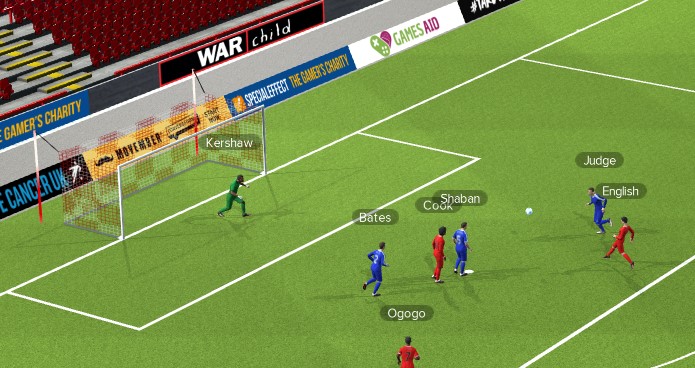 English hits a nodded back ball over the bar with a little over a minute gone. Two minutes later Beckenham look to get their revenge. Hession-Harris takes the ball in midfield, running forward, while McEachran darts ahead. He splits our defenders, taking off from Rihoy but Smith gets back on McEachran’s run and blocks his shot. 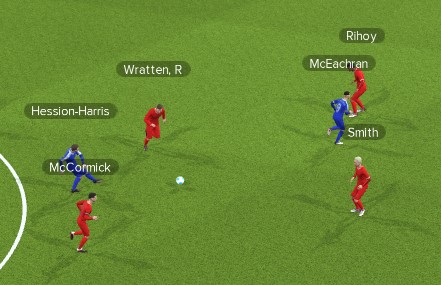 Beckenham’s McEachran splitting Smith and Rihoy. Nine minutes have passed and we show in attack again. From a throw in Ricky Wratten gets the ball back and chips ahead for Toomer. Toomer runs on, closing on goal the whole time. I see two, then three of our lads attacking the goal mouth and am praying for Toomer to square the ball, but he has a go himself instead. I can’t blame a lad for taking responsibility, but English had a clear line on the net, and Toomer wastes our opportunity. 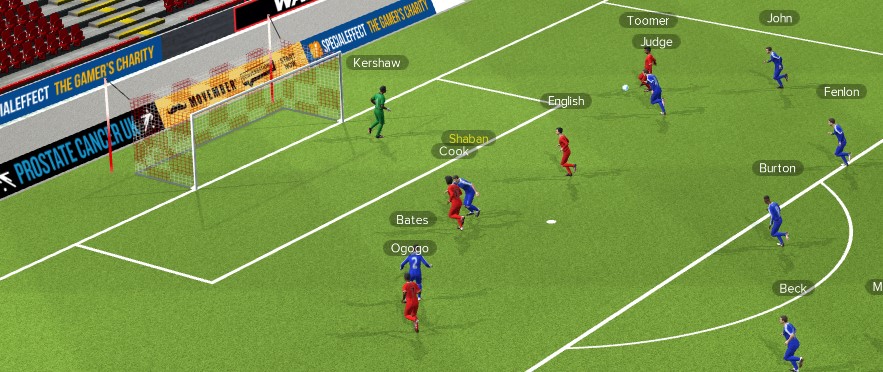 Toomer going for goal himself instead of squaring the Ball to English. The game runs on for nearly twenty minutes when Beckenham’s town aptly named Beck appears on the wing with the ball. He sends it in to McEachran, who’s clear free in the box, but McEachran heads the ball straight at Diaper. I was fearing the worst, but so far it’s been evenly matched between us. I just worry Beckenham have proven they can take their chances in their previous matches, whereas we have not. 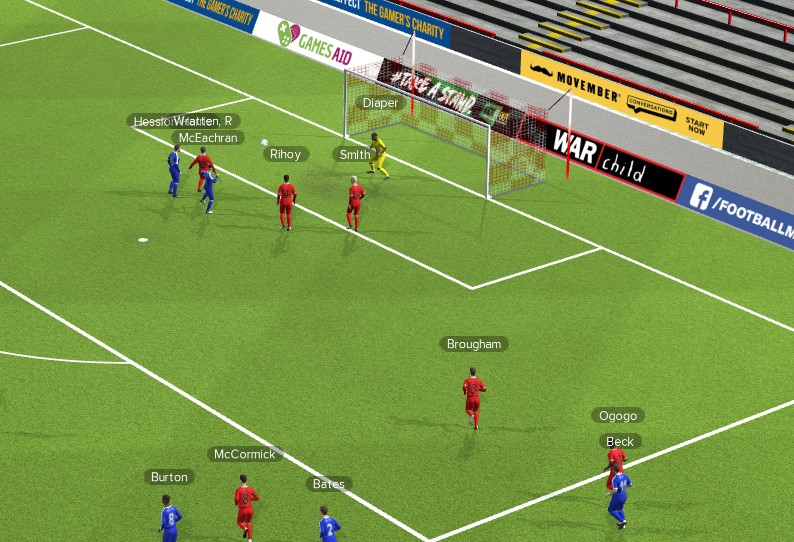 Diaper having an easy ball nodded straight into his hands. Straight from the kick out we win the ball in midfield. We follow it up with some forward passing, that gets us around the box. Beckenham have four men back, and another five midfielders crowding the space, but we do well in retaining the ball even if they’re pushing us back; for once we have some possession. Toomer plays a nice one-two with English, who somehow gets the return pass past Toomer’s defender where Toomer sends the ball over the defence, via a headed flick from Cook, to Ogogo who hits it on the half volley, past the Beckenham keeper who’s struggling to get across his goalmouth, and it sets the net rippling. It’s a brilliant pass from English, a great change of side from Toomer, an unselfish flick from Cook, and a magnificent finish from Ogogo on his first team start. We’re one nil up, for the first time this season we’re the first team to score, and it’s from a brilliant team play. The press said we were, “Facing the impossible,” so it’s going to be a real test—with over an hour to play—for the lads to hold out. But already my excitement is rising. 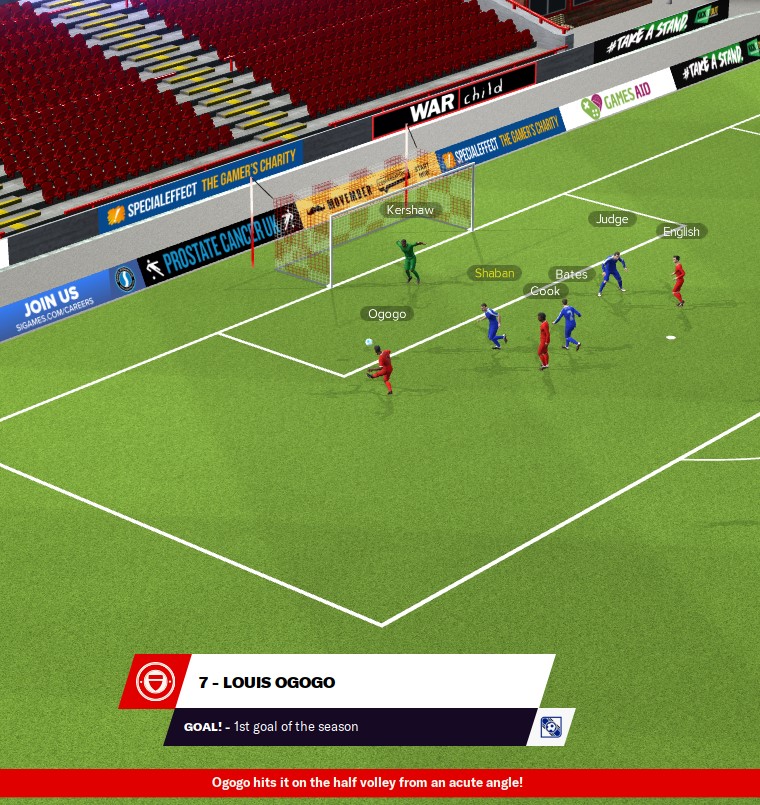 Ogogo, with his first start, showing why he deserves a place in the first eleven. There’s ten minutes left in the half and I’m wondering what to shout at a team a goal ahead. Beckenham get the ball down the left wing, with men piling into the box. The ball comes in and is nodded down, but breaks to Ricky Wratten who hits the ball as far away as he can. Beckenham are threatening, but for once our defence are putting in overtime to secure the ball. I don’t know if we can keep this up for a whole game, but at the least they’re making an effort. 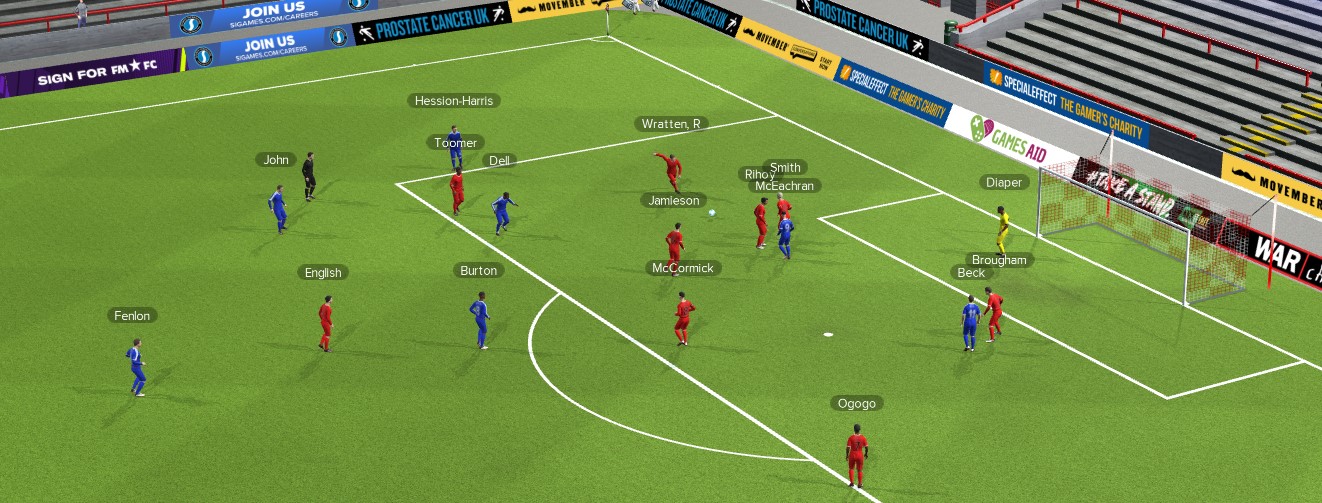 Ricky Wratten hoofing the ball up the pitch to clear the threat in our area. From some muddling about in midfield the ball comes forward to Brougham who spots Ogogo running ahead. Brougham puts the ball in front of Ogogo who only has one thing on his mind. He takes the ball a few steps and snaps off a shot, sending the keeper diving, but the crossbar denies him. Ogogo is trying everything from anywhere and I have to think at least one of these chances will give him a second. 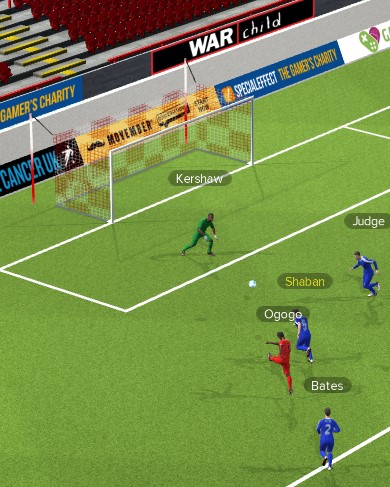 Ogogo beating the keeper but not the crossbar. The last few minutes of the first half have Beckenham on the march. They’re firing everything at us not to go in one down at half time, but we manage to hold out. My half time talk is a concern. Some of the new lads have put in a performance, as well as our attack, but the midfield is having a poor showing. I don’t know whether to applaud the team or tell them it’s not good enough. To have them composed or to fire them up. I’m planning on demanding more from them, but just as I’m about to open up I realise we’re ahead at half time, something we haven’t been before, and realise I can only tell them we’ve done well. We are doing well, and the team appreciates my comments. I’m just hoping that lasts the next forty-five minutes. 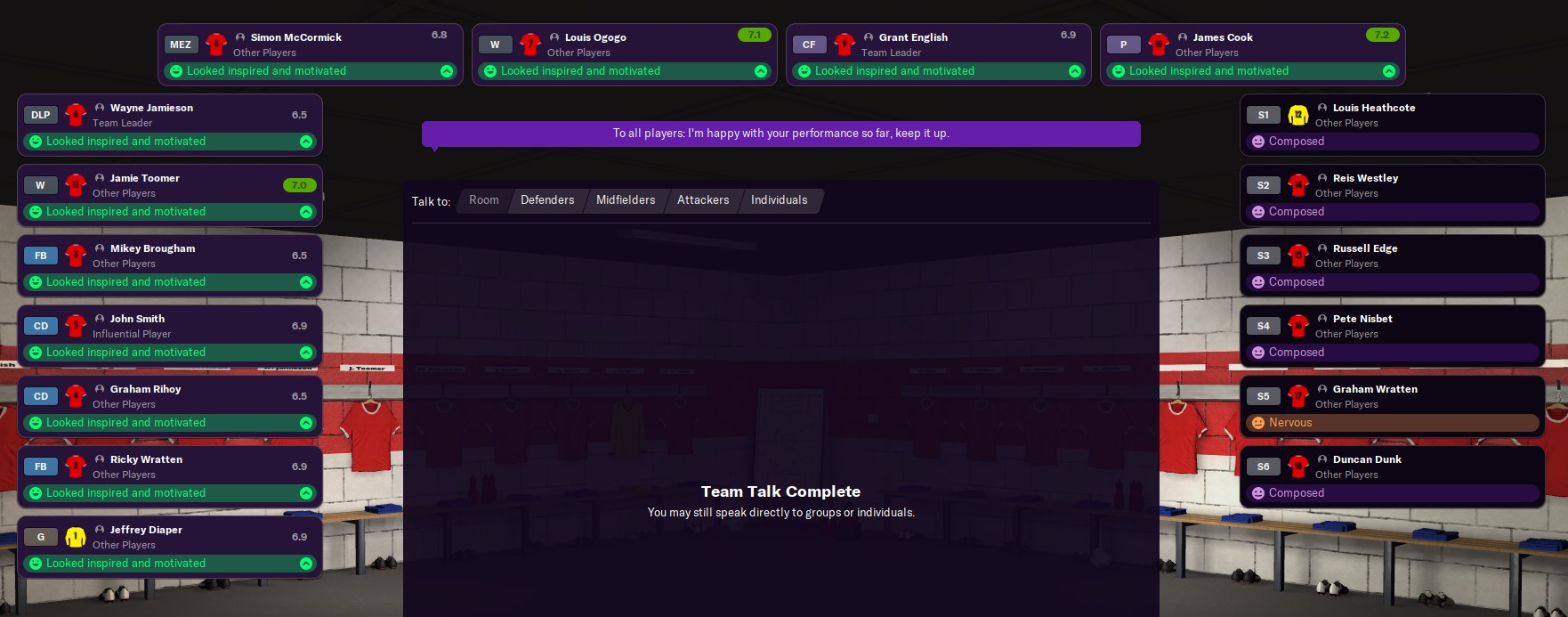 The team looking thrilled to be told they’re doing well. Ten minutes into the second half McCormick plays the ball to Toomer, who dances it around with English before getting the ball back from him and having a shot on goal. It’s straight at the keeper, but it’s not a bad effort with a crowding defence around him, the problem is McCormick. He’s been playing a decent game but is looking absolutely shagged. If I bring him off I won’t have anyone to replace Jamieson with, who’s not having the worst game he’s played for us, but that’s not saying a lot. I decide I’ll see if I can get another five, maybe even ten minutes out of McCormick. 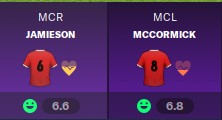 McCormick looking wrecked with just 55 minutes gone, but I only have one central midfielder on the bench. My fear over the loss of McCormick comes up again just three minutes later. Brougham, who’s finally showing his value, puts a nigh on impossible ball into Cook. Cook reads it perfectly, takes one step, and unleashes on goal. The ball flies to the opposite corner, past the Beckenham keeper, and into the net. We’re two nil up; Smith seems to have united our defence, we’re taking at least some of our chances, and I won’t feel too bad about taking McCormick off in the next few minutes.  Cook adding to his season’s goal tally with a powerful shot to bring us two nil up. Five minute later Jamieson shows some of the football knowledge he has locked up in his 39 year old brain. He spots Ogogo on the edge of the box, lofting a ball over for him. Ogogo runs forward, and again the angle is closing. This time, however, instead of taking the slight shot like Toomer he lays it straight across the keeper to English who has a simple tap in. We’re three nil up and the fans are finally cheering. 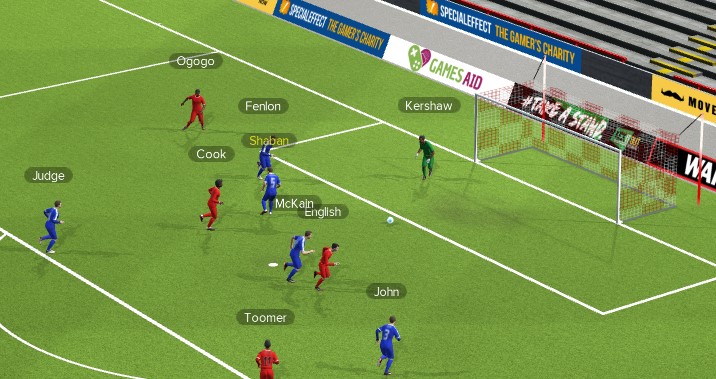 English with a simple tap in after Ogogo learns from Toomer’s mistake and squares the ball for a runner. With 57 minutes gone I’m looking at my bench. English is out on his feet in attack but we have literally no-one on the bench for him, while for my central defenders I’m unsure who’ll begin to flag first. Smith and Rihoy are both looking like that have a bit in the tank, but it’s a case of do I bring Smith off, who’s shored up our defence, and save him for another day, potentially losing that stability, or do I bring Rihoy off who’s only having an OK game but potentially flog Smith. This all means I’m not paying attention when I hear a roar from the crowd. Jamieson has proven his worth by sending a ball through the defence for Toomer, who’s bagged us another, and settled his debt for not creating one with his chance in the first half. Over twenty minutes left and we’re up four nil. 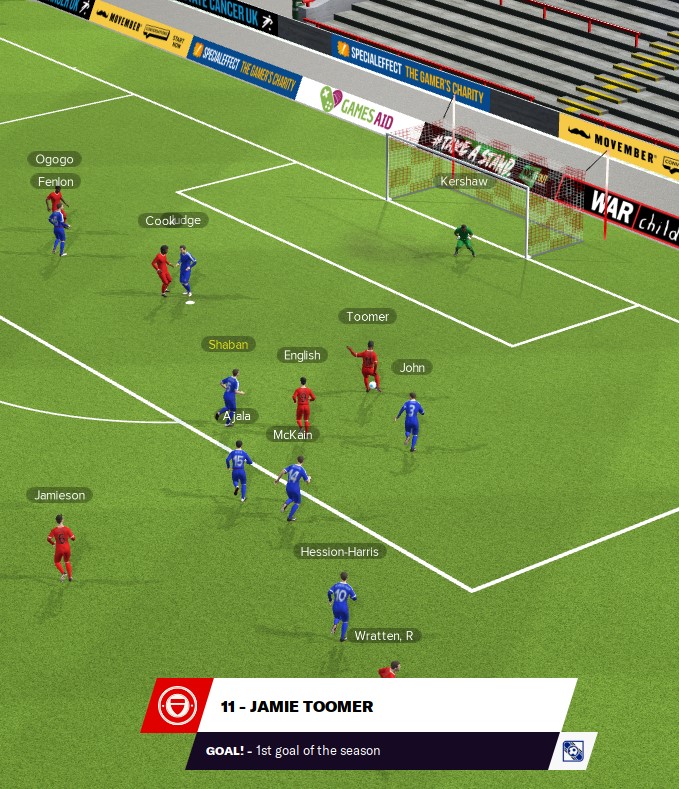 Jamieson showing there’s still something to him by sending a ball through for Toomer who scores. With twenty minutes left the team is looking absolutely destroyed. Smith is off and I’ve brought Graham Wratten, Westley and Dunk on to give whatever rest I can to those most in need of it. Dunk is obviously out of position up front after being brought on for English, hooking a shot a mile wide and heading another haplessly across the goal. I’m praying for the game to end, and give my guys a breather after running themselves into a win for 90 minutes, when a final ball is sent through to Cook who scores. It’s the last kick of the match, but it’s ruled out for offside. I don’t care one bit though, four nil is a phenomenal result and the lads put in a huge effort to achieve it. 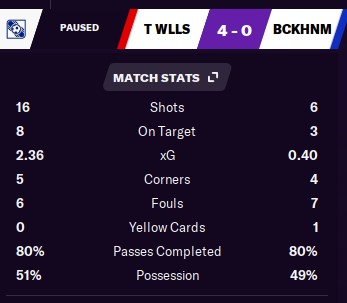 The team’s performance was nothing like I’d seen from them before, their best game for me so far. After the match I told the team how proud I was of their performance, and they all seemed delighted to have won a game cleanly and with conviction. As I looked over weary bodies, bodies that ran themselves into a ground for a win, I’m incredibly thankful that at the least I could cancel our friendly at the weekend. I was sure the whole team would be celebrating that night, at least after a good half an hour where they just sat and let their bodies recover.
|
|
|
|
The Fat Man's Golf Course - 9:03am It was the morning after our win against Beckenham Town and I was back at my regular job. I’d just cut the first four greens on the course, getting at them early so there wouldn’t be a difference hole-to-hole when we had some golfers out. I was emptying out the bucket from the few snippings of grass when Teddy came speeding up to me on his fairway cutter. Seeing that thing bearing down on you is absolutely terrifying. It goes up to 35 miles per hour, and the whole front of it is a series of blades and rotators that’d have a limb of if you happened to fall before it. Pulling up to me Teddy yelled, “Mrrrummpf ver ump fer umpf!” “I can’t hear you, Teddy,” I said, but he couldn’t hear me, so I shouted louder. “Teddy! I can’t loving hear you with the machine!” He turned it off. “I couldn’t hear you with the mower,” he said. “What’s wrong?” I asked. “Some lad is in the hut looking fierce shook. He’s asking for ‘the boss,’ but when I told him Mr. Laws wasn’t around he said, ‘the real boss.’ You.” “What does he look like?” I asked. “Like he’s been slapped with wet newspaper,” Teddy said. “Alright, I’ll head into him, probably one of the players who’s been benched.” “Good job on the win last night, by the way. I’m keeping cut outs of yer sports page articles. I’ll do last night’s at lunch.” Then he speeded off on the mower he regularly told me cost more than his car. Walking up to the hut I was thinking it’d be some lad who’d joined in on the festivities last night, in The Sheep’s Head. They’d be high on a win but when the nerves kicked in this morning with the alcohol leaving them they’d remember they hadn’t actually played, were celebrating something they weren’t part of, and their whole small and new footballing world would have collapsed. I was gearing up to tell a lad it was a squad game. That what everyone did on the training grounds contributed, it was going to be a long season and no matter who you were you had a part to play, when stepping into our hut I saw Louis Ogogo, sitting, with his hands shaking, while holding a mug of tea. “There sugar in that?” I asked him, pointing at the mug. “I don’t take sugar,” he said. “I don’t even really drink tea. That guy in here made it for me.” Teddy was not the kind to make strangers cups of tea, so Louis must have looked even worse before he had a mug to hold. “You’ll probably need a few spoons, with your hands, eh, like that. Low glucose, strains of the game, morning after and electrolytes and all that,” I said, even though I could see it was one hundred percent nerves. I poured one, then two, then a third spoon’s heaping of sugar into his tea, stirred it up and said, “Get that into you, lad.” He took a sip, and I could almost see the heat venturing down his throat, spread around his chest, and the sugar work its magic to give him a little boost of happy chemicals. “What’s bothering you?” I asked. “Too much celebration last night?” “The celebrations were fine,” Louis said. “It was just us and some of the staff. Maria has some filthy jokes, you know? I’m not even old enough to drink but Mr. Laws didn’t seem to mind me being there. It was all good until this morning.” “What happened this morning?” I asked. I was expecting him to mention the inevitable low after the highs of the match the previous night but what he said, at first, surprised. “Mum sent me to the shops to get a loaf of bread, and some kids yelled at me.”  Louis Ogogo’s big worried head, sitting in my hut on the golf course, obviously bothered. “OK...” I said, not really getting it. “And so did some builders, working on Mrs. Johnson’s cladding.” “Hmmm, terrible,” I said. His hands were still shaking. Louis took a deep breath through his nose as he spoke up again. “I didn’t know what to make of all that, Mrs. Johnson’s Susan used to babysit me.” “Right...” I said, as punctuation to his stream of consciousness. “But when I was walking into Tesco Express, some granny, with one of those Tartan shopping trolleys they pull behind them, you know the ones?” I just looked blankly at the young lad, obviously perturbed. “She must have been a hundred, ancient, you know? She yelled out at me, ‘Ogogo GOAL!’ right in my face. A granny!” I said the only thing that came to mind, which admittedly was not the most tactful of responses, with, “Welcome to football, Louis. You're a winner! And everyone wants you to know it.” He just nodded, and I knew he was still shook. “Why don’t you join me for the morning, I’m cutting the greens. But you can just walk along with me. It might be good to clear your head. Or you can head into Wayne in the pro shop and say I said to give you a set of clubs. Whack a few balls around the course. I’m sure Mr. Laws wouldn’t mind.” “Right,” he said. “I will.” He took a big drink from his tea, and I could see it settle him just that bit more. “I’ll go hit a few balls. Thanks, boss. You always know what to do.” And with that, I’d managed our first player crisis. Tunbridge Wells were, again, all systems Ogogo.
|
|
|
|
Rarity posted:Admit it, this whole update was so you could make that pun It was not. When a writer laying the groundwork and the wonder of a great spreadsheet game combine magic can happen. I just saw my opportunity and took it. In general, though, I’m trying to put in the idea of stress being something people have to deal with in all walks of life, but through the lens of a football team.
|
|
|
|
The Trials Of Trialists Our win against Beckenham Town had placed us right in the middle of the league. With four games played you could say we were distinctly average if it wasn’t for the manner we’d achieved our two wins in. For us it was a case of hot and cold, switched on or off, and it was my job to ensure the team stayed firmly in the ‘switched on’ mode; even if it meant bringing in a few new faces. 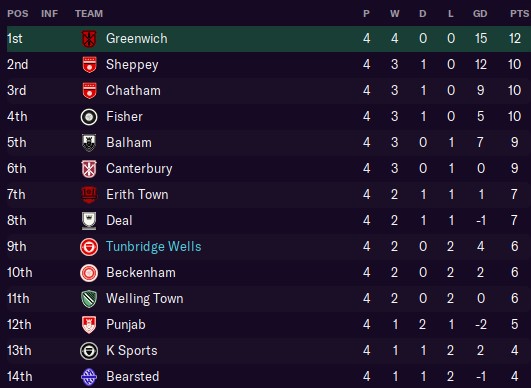 Our position in the league after four games played. Our difficult start showed no let up and with some games played it meant I could begin looking at results to gauge a team’s ability rather than relying on the media’s prediction. This seemed like a more reliable course of action, especially with Balham—our next opponents—having three wins from four despite the media predicting them to be bottom of the league.  Balham's odds didn't seem justified with four games played and them in fifth. Still, I had a bit more in my arsenal than the previous weeks with a scout signed. The first thing I had to do was set them on a plan to watch whatever opponent we had coming up. I asked Callum Batt to pour over video, even to travel, and get a view on whoever it was we were facing next. I just didn’t know if he could manage it for Balham having just come in with us. Part of the scouting could, eventually, inform my decisions. During the first four games we played I didn’t keep notes on how our opposition had set up, tactically—I was too focused on our own performance—but I did recall that Beckenham had played in a 4231 shape, with a heavy emphasis on control around our box. What a scout would mean is, at the least, I’d have some idea of how a team liked to play, and I could begin to see how Tunbridge Wells fared against particular shapes. 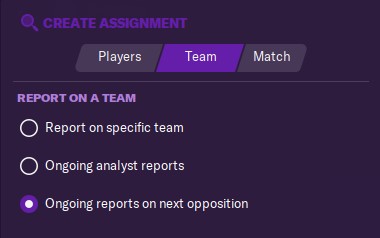 Laying down the paperwork to allow our one scout to check out our upcoming opponents. However, even with that info, we didn’t have the squad to adjust our tactics. We were stuck with 442 considering our personnel, even if we signed another two or three players immediately, but with even more potentials coming in on trial, we might, by the middle of the season, have options opened up for us. That made me realise it’d be handy if we had another scout. Performance and statistics analysts were a financial commitment I wasn’t quite ready to make—we didn’t have the spare training sessions to run match reviews even if it would help the team shore up tactical mistakes—but a second scout would mean we could begin to check out the amateur players elsewhere who could be a valuable signing for us. I had to keep in mind that Mr. Laws wanted a top four place, and I was sure his ambitions only began there, so building a bank of players for the future could only be a good move. After staff CV databases were scoured I approached Adam Dyer about becoming the second scout on our books. It was definitely where his talents lay, but he was positioning himself as a coach. I tried to convince him that at the level we were at any job was a good one—and I know that sounds dismissive—but the guy basically told me to gently caress off when I mentioned it. Still, with the limited amount of calls made by a ninth tier manager that get answered, I didn’t mind too much offering him the coaching position he wanted with us. I had already made Steve Chambers an offer in the lead up to the Beckenham match, and was waiting on a decision, but if he turned us down I’d have Dyer as a backup to come in. I thought we’d maybe still take Dyer, another coach mightn’t be a half bad idea, but it was a few days later when my decision to keep our options open with Dyer was justified; Chambers took a job as manager with an under 18s squad closer to him. 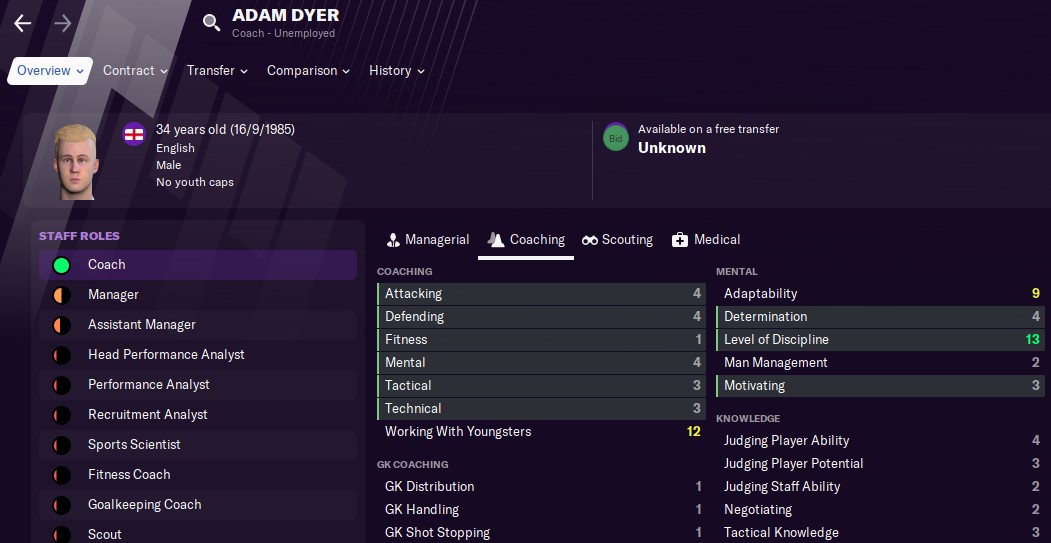 Adam Dyer could do a job for us as a scout, but he was adamant he only wanted to coach. With Dyer coming in as a coach I was still looking for our second scout. After another evening on the CV sites I eventually found a lad who was willing to be flexible when it came to what role he’d play. Tony Agnew was even delighted that I’d offered him £35 a week to find players, saying he’d be going to matches no matter what he was doing. He told me had to check things over with his family, with all the travel and evenings away from home, but I felt confident he could come in and do a job for us. That confidence was well placed because it was forty-five minutes later when he phoned me back saying he’d do it. I guess his family felt he needed a hobby. 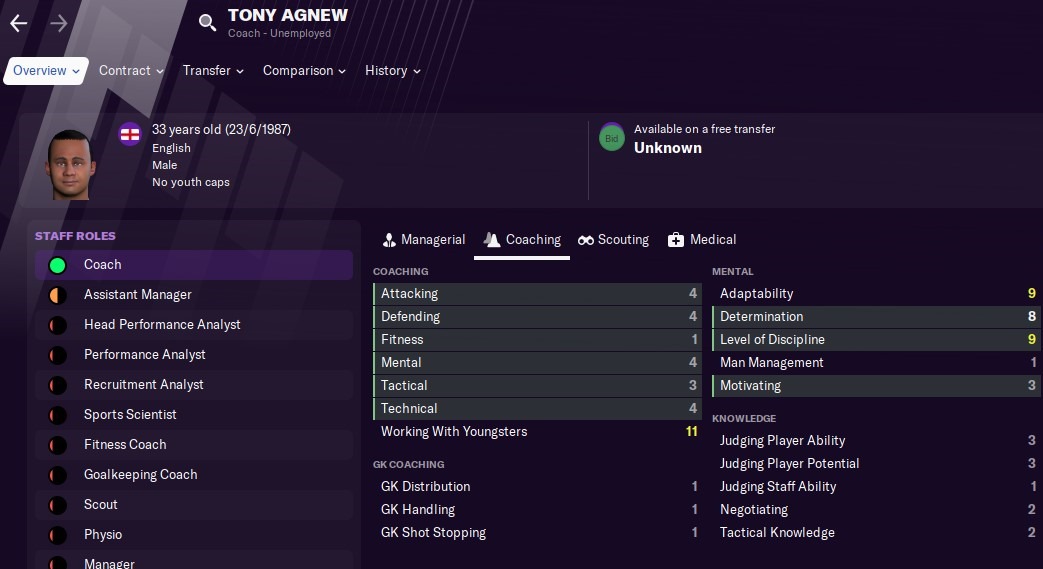 Tony Agnew who we signed as our second scout. Most interesting to me, or at least what got my hopes up most as the week progressed, was that after bringing in a load of players on trial, all almost as old as me—if not older—finally a guy in our target-signing age bracket asked to come in with us for some training. Charlie Flanagan was 23, just about within The Fat Man’s limits, and he played full back, one of the positions we were weakest at. This was true even with Smith shoring up the middle of our backline. After confirming our willingness Flanagan arrived the next day and put in one session as Alexander met him, then me, and offered an appraisal. “I’m not sure about this Flanagan guy,” he said. “What makes you think that?” I asked. “He could do a lot for us. I genuinely mean that, but he’s not the kind of superstar player we’ve had in with us before.” I thought on some of the players he’d told me were superstars, and none of them were any great shakes. “Has he anything to him?” I asked. “I still can’t tell,” Alexander said. “But he looks a little lost during training. At least at the moment.” 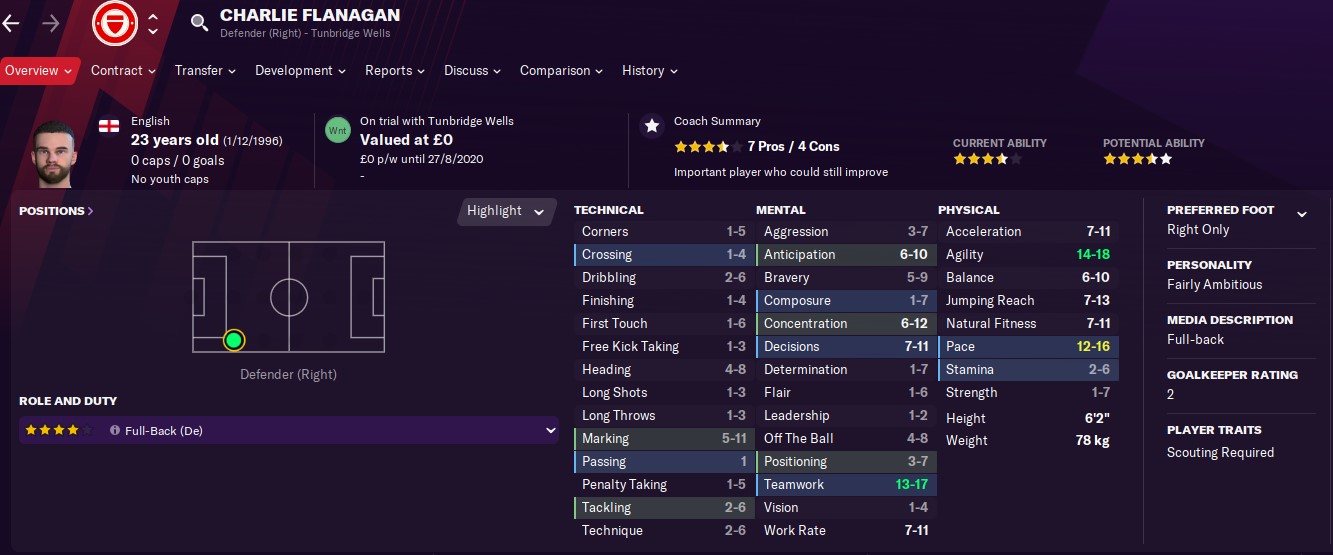 Our first glimpse at Charlie Flanagan didn’t do much to inspire. But looking at any prospects that came our way was what I had to do. My main goal, for at least the next couple of weeks, was to build out the team into a proper squad. A team with depth, where if a player went off the boil they could be threatened with benching, or at least given some rest to get their mojo back. Even more pressing was we needed to get to the point where we could have a full bench, never mind one with full cover. And should we have more injuries? Then we were on a loser. What we needed was options. And the decision on some options was coming up before our next game, with some of the trials I’d initiated coming to an end. 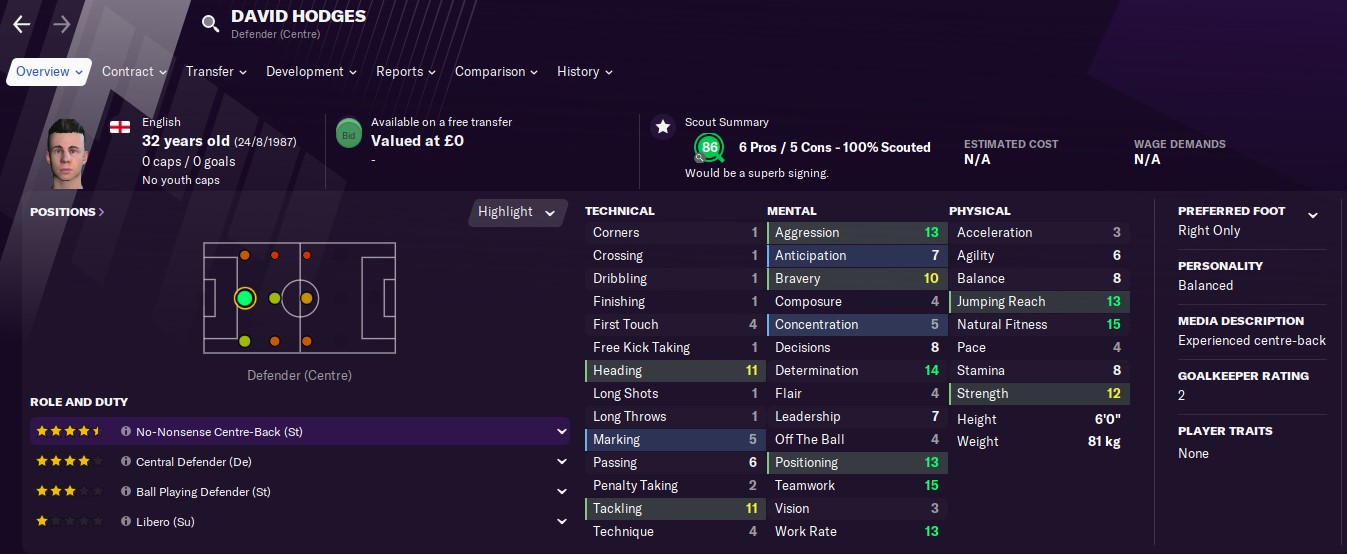 With a hole in his mind when it came to concentrating on the game, and no ability to mark, it meant I couldn’t take on a short-term 32 year old despite being a real find elsewhere in his game. Unfortunately, none of the lads we had in with us showed much of anything. The guys we already had signed up on amateur contracts for the team had no stand out abilities, while the guys training with us on trials were all stand out abilities, and then vast empty spaces of huge gaps in their skills. If we brought them in it’d be a case of playing the team on the ups and downs, hoping to get them into the right places, all the while instructing them to play in a manner that suited their peculiarities perfectly. The problem was if we had a hundred seasons to work it out I don’t think I could have built a tactic that would work with their nuances.. 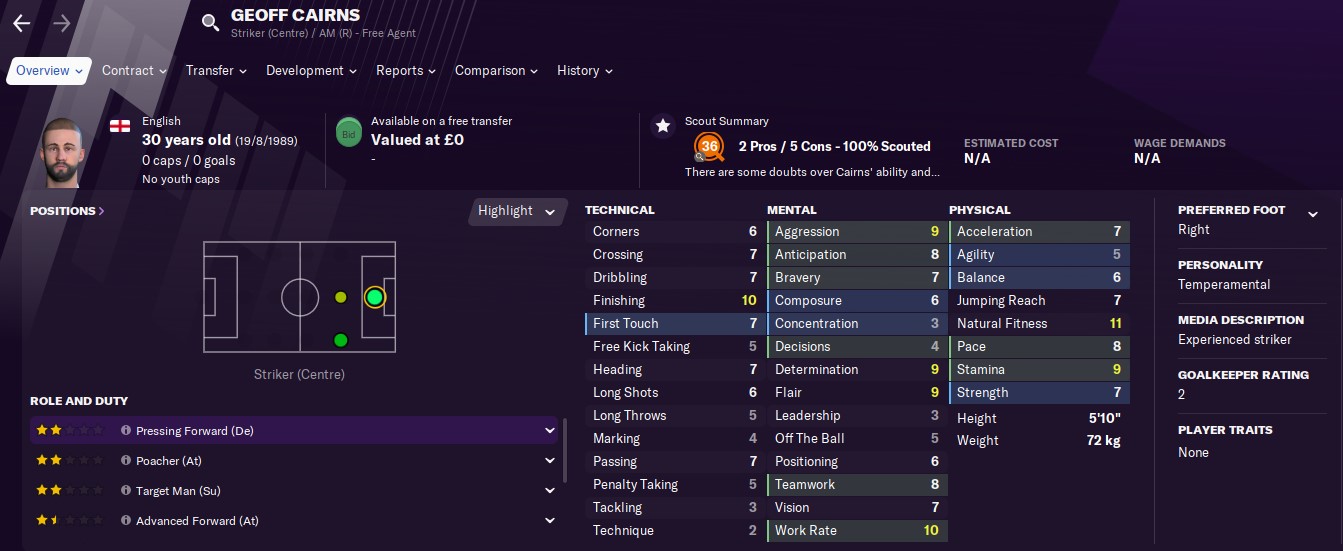 You could make an argument for bringing Geoff Cairns in, he was a little better than what we had, but with three strikers, he wasn’t unbelievably better, and like most of our trialists, he was just that bit too old. In my office, I was just about to see to ending the first round of trials when Maria came at me with a stack of papers. “What’s this?” I asked. “Performance analyst applications,” she said. I just looked at her blankly. I thought I’d decided against analysts. “The first day you were here you said put an ad out for some. These are the responses we’ve had.” She was straight to the point, and I could see on her face the idea of her hard work being wasted would not go down too well. So, I thought, I must have, at some point, felt it was worthwhile. Still, I’d guessed I’d changed my mind. “I don’t think we need one,” I said. “You can dump them, or maybe just file them away.” Maria nodded, looked at me like I’d said the stupidest thing on the planet, then pulled a thick envelope out of the stack. “You might want to look at this one,” she said. Inside was an analysis that broke down the mistakes made in our Beckenham game, where we gained an advantage, and a general appreciation of how our looseness at the back and ability to score placed us against the rest of the league. And it was all from some kid who’d done it in his bedroom.  The young fella was doing everything to get a job with us. “This is impressive,” I said. “He dropped it in himself, on his bike.” And like that I was sold; anyone with a bicycle and this attention to detail must be solid. I phoned him up straight away and offered him the position. I was expecting a young head who’d jump at the chance but he drove a hard bargain. He could put together stats, but that meant he also knew his own worth. In the end I signed Keith Williams for £50 a week, and went from saving money on no analysts, to spending more than I thought I should on some whizz kid. 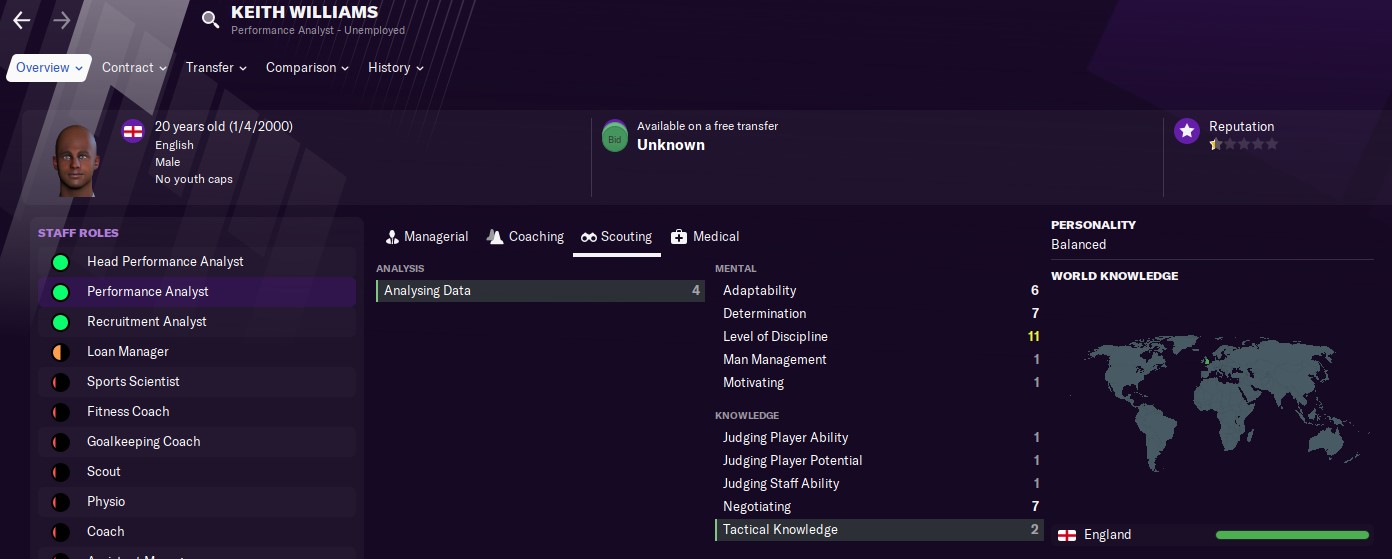 Keith Williams drove a hard bargain, but I was interested to see what stats packages he could put together for us, especially as he worked so hard to come in. Coming up on Balham I still hadn’t a squad where I could rotate or pick who was in form, and I was looking for any advantage we could get. Then came the bad news. Our scout couldn’t get any information on them, not in his short time with us. Apparently getting to see them play wasn’t something he could do, nor did we send a fourteen year old with a phone camera. I just had to hope we could improve things as time went on. I was wondering if it was all going to be a waste—having two scouts—when the whizz kid said all wasn’t lost. Both him and the Batt worked together with what little they could find and found out Balham played a direct style of game, maybe even more direct than us. 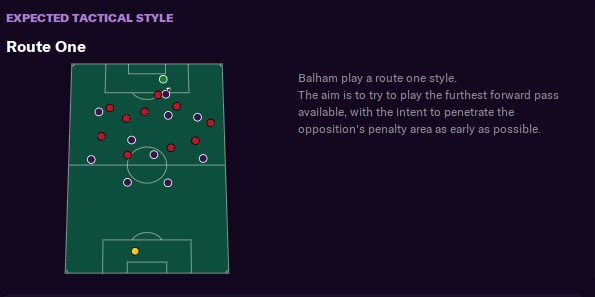 What the new guy, Williams, and our almost as new scout came up with for how Balham would play. At the least this was something to go on. We knew they were shaping up much like us, with only a day to go to the game, but with their three wins from four compared to our two wins, along with their over-perfomance and our under-perfomance it was looking like the Balham game would be a real battle. Two similar tactics coming at each other meant any slight dominance would win out so it was going to be a real test of determination and skill; and we just had Smith as an improvement on our initial squad. I knew the Balham match wouldn’t be the kind of game that won us anything immediately, but it was the kind of trial that, in the long run, could tell the story of our final position.
|
|
|
|
Long Balls for Days Our match against Balham was looking like it was going to be a real battle. They’d won three from four compared to our midline two from four, except they were performing above all expectations while we were that bit below them. I hoped our losses were just a case of the team bedding in, and tactical problems that were, by now, figured out. Swapping Cook and English in their front positions while reducing the amount of work the midfield was expected to do were reasons to latch onto for our last win. I’d also started a few players who looked eager to mark their spot in the team sheet, so, all in all, I wasn’t as worried going into the Balham game as I was in my first few games. It was, of course, all new to me at the start of the season. Maybe more new to me than it even was to some of the players, so there was a chance I'd just bedded down as a manager. I’d never been in charge of a football team, only been back office volunteer staff at a small college’s sports program, so when the players were relying on me it took a few weeks before it finally hit home it really was me in charge. Even more the case was the realisation that even though I was in charge, everything wasn’t my doing. I think I’d finally realised that while I could organise the team as best I could, giving them what I saw as the best chance, it wasn’t eleven versions of me running around the pitch (thank god.) I’d already figured out I could only do my best, but now I was coming to the realisation that even doing my best didn’t mean all the best things would happen to Tunbridge Wells. With that in mind I set to work on what I should do, or more what I shouldn’t do, against Balham. Considering we were going up against a team that were shaping up to play in a very similar way to us I made no changes to the line up. We’d won four nil against what was supposed to be a better team in our last outing, so I didn’t see the point in making changes. The added bonus was that I cancelled our weekend match, a friendly, after someone pencilled it in as a game to play before I’d even been hired. This meant the team were a bit better rested, after a couple of weeks of constant games, even if they still weren’t quite match ready when it came to their sharpness in full game scenarios. As well as not changing the team, I didn’t change anything in our playing instructions, or even our cautious approach. It seemed we did well taking our chances when they were more likely as on, not just trying to magic something out of nothing with dominance. 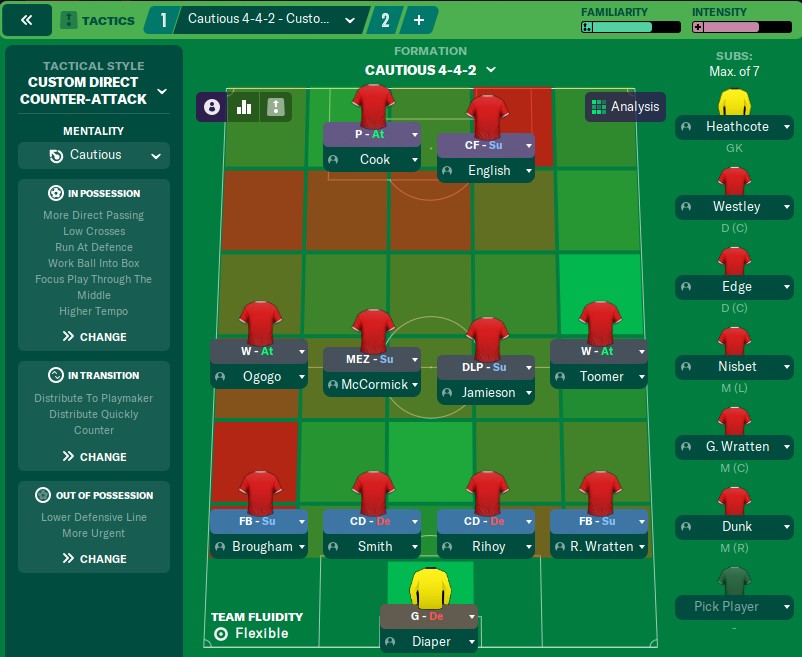 No changes anywhere with how we played in our 4-0 win over Beckenham. I thought I was going against the grain in choosing to remain with a cautious approach. With our prediction, at least at the very start of the season, to finish in fourth place, and Balham’s prediction for last place I expected the press to be talking about how we needed to go out and attack. Instead, maybe taking into account Balham’s start to the season, the press had them down as favourites despite being away from home.  The press’s prediction on match favourites. I had to see what Alexander made of all this, and instead of heading straight in to give the team talk I waited on his appraisal of how we should shape up. His opinion was much the same as when we played Beckenham, that we needed to park the bus. Considering how we fared in that game I took his advice with a grain of salt. Whether he was right or wrong could only be guessed at, at least without the match played, but I had to give our lads credit for what they pulled off against, “impossible,” odds before. 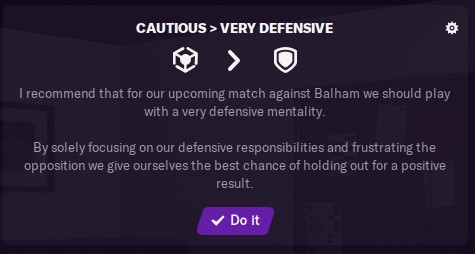 Alexander was hesitant again, looking for us to put everyone in defence. So with that in mind I headed into the dressing rooms. I ran through my standard rigmarole of, “I have faith in you,” and, “Pick up from where you left off,” but the players were mostly focused on the game they knew was going to be a battle with two very similar approaches in play coming at each other.  There was only a small reaction to my team talk before kick off. After kick off a minute passed before Balham have a throw in our final third. We win the ball and boot it up the pitch where English gets to it first. He holds it up really well, stalling, then as our players get up the pitch he takes it forward to the corner. After some passing play—not quite in the plans—the ball is crossed to Ogogo who fires off a shot. He misses, wide, but his intentions are certainly there from the outset. The fiery play from his start against Beckenham is continuing into this match. 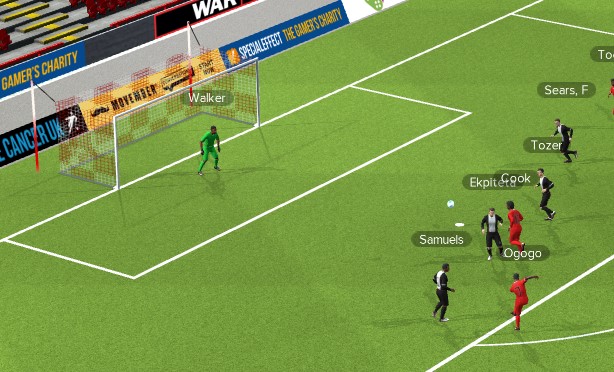 Ogogo continuing how he’d left off and firing off a shot. A kick out straight from the Balham keeper gets past our defensive line. A Balham player heads it on and sprints towards our goal but we get back to crowd him. I’m thinking if he has a shot there’s not much room to get it on target but a Balham player, Sears, is wide open on a rightward diagonal just inside the box. It’s horrific defending, to leave a player space like that, and he bangs it in. I’m thinking it’s the stupidest goal to give away, an unmarked player, when the linesman raises his flag. The reason he had room for the shot was he was offside, but if we let players go like that it won’t be long before they have one that counts. 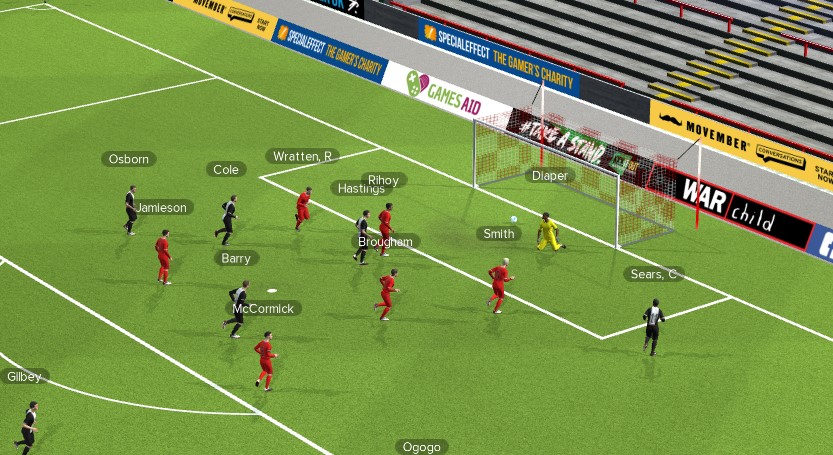 Balham’s Sears with acres of space in the box for an easy goal, but it’s disallowed for offside. My inkling about the space we’re leaving them is proven right when with eight minutes gone a through ball is put in again, this time to Barry, who has an easy knock-in for Balham’s first. The star of our defence, Smith, left him the space. Seeing how easy it is for them to get balls into our box I tell our line to push further up the pitch. I have to hope it cuts off their free chances in our box, allowing us to put the pressure back on them. 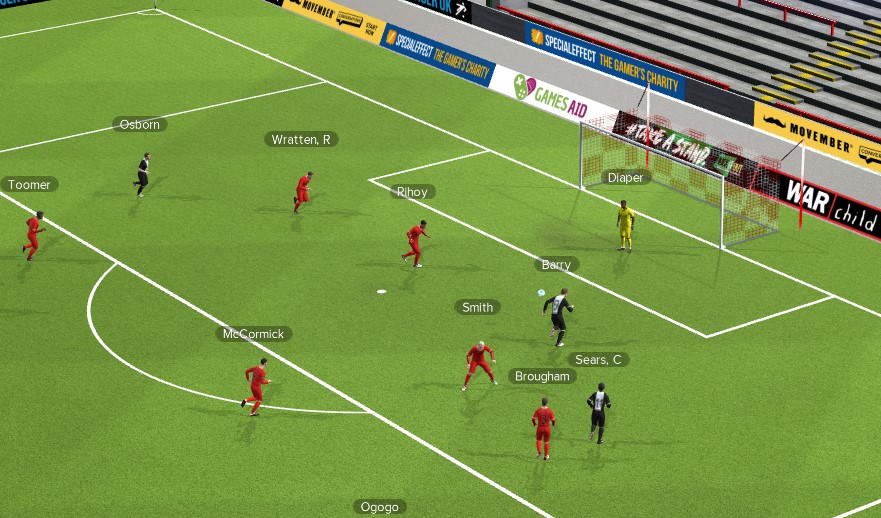 Smith losing his man and allowing Balham’s Barry to bag an easy goal with eight minutes passed. Over the next ten minutes we get a couple of chances. We’re piling up outside their box, with throw-ins, players running on, and nice play on the wings, but we just can’t work the ball towards the goal. When we do get a ball in Balham have so many men back that there’s just no clear chance available for us. All the while this is happening I’m worried that one of Balham’s players will clear the ball a mile down the field and Balham will catch a second on the break. Any other time I’d tell our players to sit back a little and hold against the long ball, but I’ve already seen what they can do when we’re deep at the back. As I’m realising all this I get a perfect example of our problems with Balham putting bodies everywhere when we attack. Toomer receives a great ball wide on the wing, and puts it right into English in the box. English snaps a quick shot, but Balham already have men back; they’re defending like demons, and if we weren’t already behind I’d be certain we’d break them down at some point for the win. 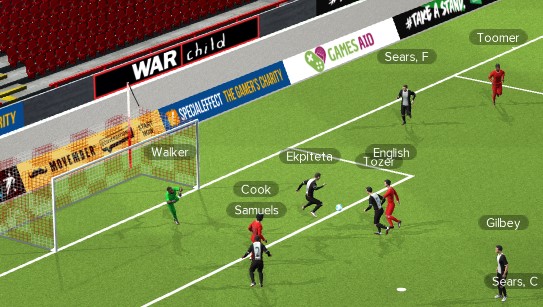 English’s shot gets blocked by Balham’s ferocious defence. We’ve yet another scenario where we’re playing around their box and just can’t break them down. After what seems like five minutes Toomer eventually gets the ball into the box, but his shot is from such a tight angle, with bodies in the way, that the goalkeeper makes the save. I’m now beginning to wonder, if another forty-five minutes of this passes, whether I’ll have to change around our tactic to put someone in as an attacking midfielder, giving us some options in the final third. The problem is a 442, and our players, just don’t provide options for this. 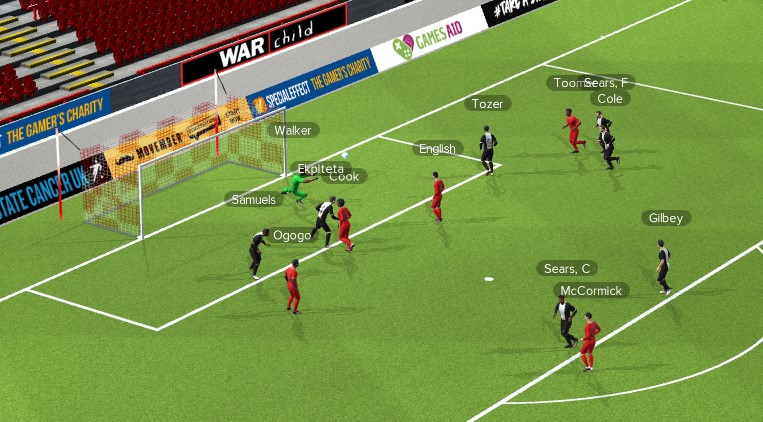 Toomer gets his difficult shot away but it’s saved. It’s from a goal kick that we finally get something. The ball is played out by Diaper to English, who holds it in midfield. Cook makes a run behind the Balham defence and English slides the ball through. For once the Balham defence haven’t had a chance to set themselves with the speed of the play. Cook runs on, and I’m hoping he can make this one break we’ve had count, and he does! He takes a fine shot to the corner of the goal, and we’re drawing one-all. 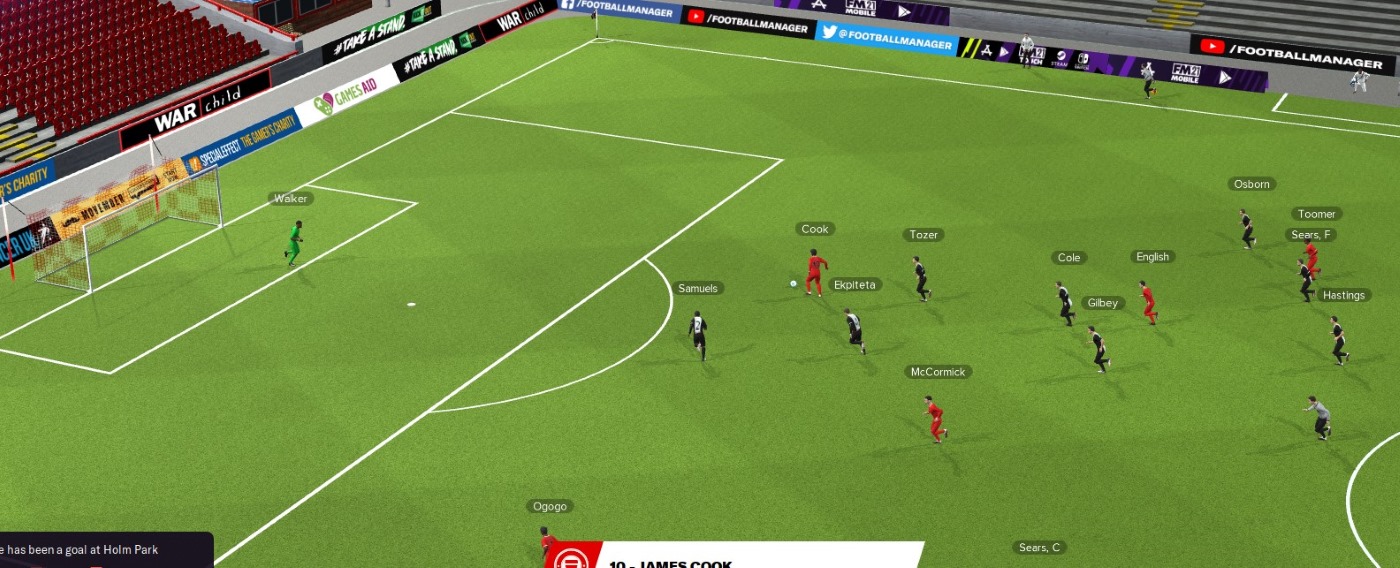 Cook with a rare quick break for us brings us back to one-all. There’s a lot of shouting and roaring from the Balham bench after the goal. They kick off, and they’re all looking fired up. I’m worried that we’ll switch off, having just got one back and with only six minutes to half time, but the shouting from the Balham staff seems to have had the opposite effect. A Balham player misjudges a header, knocking it down to Ogogo, who puts a first time ball into English who’s completely unmarked in the box. English’s composure holds this time, and he fires the ball straight past the Balham keeper. After a shakey start we’re two-one up. 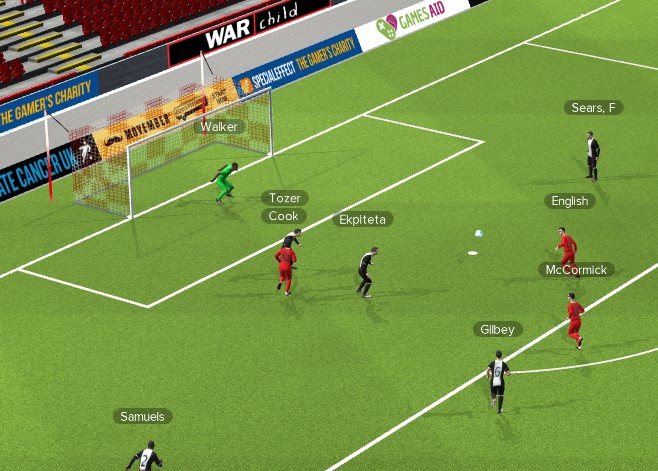 English scoring after being left completely unmarked in the box. At half time I want to warn the players against complacency. To keep their heads in the game and not to let their guard down, but I’m worried that would only cause them to play with nerves. They must be fully aware, after going down a goal at the beginning of the game, that it can all change very quickly. Instead I tell them they’re doing well, and they all seem to appreciate it. And they should know they’re doing well; despite Balham being difficult to break down, we’re still a goal up. 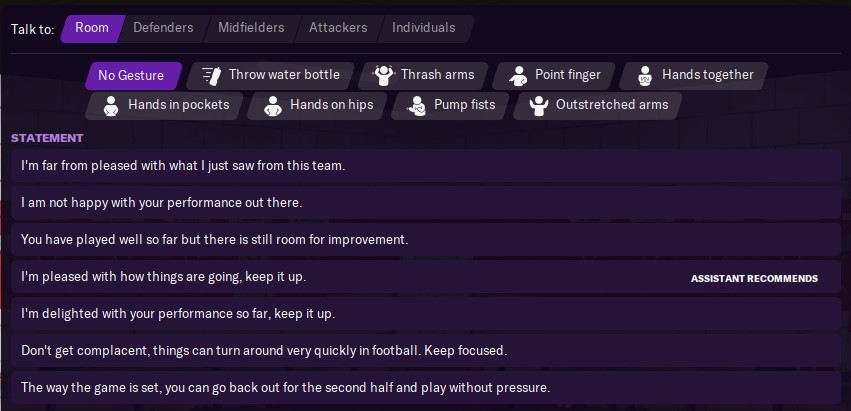 What my fear wanted me to say at half time versus what I did actually say. Eight minutes into the second half the balance to pushing my defensive line happened. While we kept them from getting balls into our box with their players free, a quick dart behind us meant they might get a free run on goal, and Barry does just that. He gets behind us and punishes us from a long ball over his head while beating out Smith, leading to an easy shot to score. Smith hasn’t played too badly, he’s mostly been solid albeit with one or two mistakes, but my big worry is that he’s already on a yellow. If we go down a player we won’t be able to keep them out, but Smith is the keystone of my defence so I worry about bringing him off. At two all after Barry's goal I just have to hope the team’s form from the first half continues, and we bag another goal or two to secure the three points I really feel we deserve. 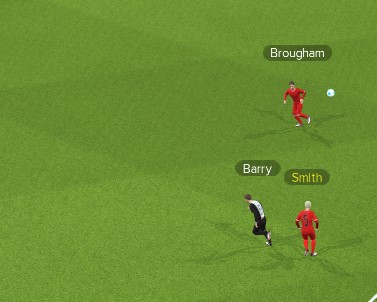 Balham’s Barry catching out Smith to run on for an easy shot and goal to make it 2-2. Not even a minute passes and we’re on the attack. A quick ball forward from the kick off is sent back at us, only to be sent right back into our attacking pair already in place. Cook receives the ball, with the keeper shaping up to block his header, but I think he’s going to loft it above him and into the net. Instead Cook sees English get behind his man and plays it down to him, and English has a free shot that he doesn’t miss. Two minutes after Balham make the game a draw we’re back in the lead again. 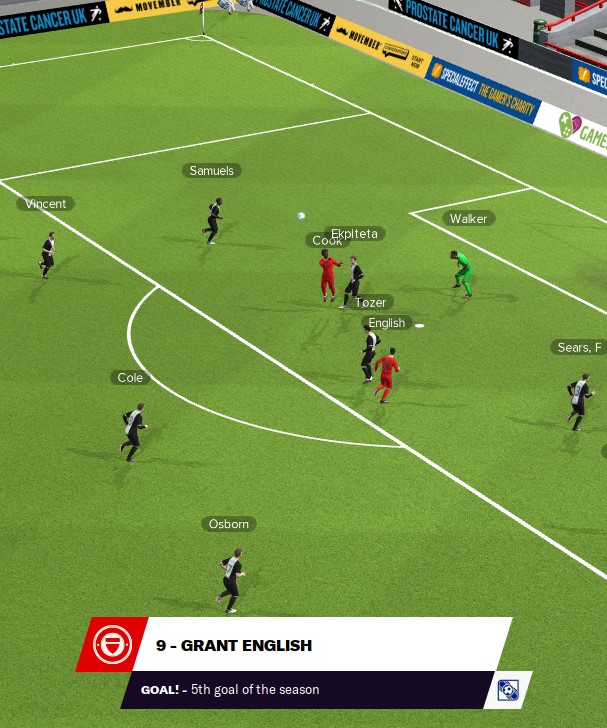 Cook being entirely unselfish and completely aware played the ball down to English who has an easy tap in for the goal. With twenty five minutes left another long ball is played behind us and I’m thinking I might get the defence to drop back just a little again, to see if we can hold out our lead, presuming Balham don’t score. Despite the long ball over I’m at ease seeing Smith react before Barry, but Barry is playing superbly—maybe the only decent performance on the Balham side—and Barry absolutely skins Smith, gets past him and runs onto the goal. I’m begging for a save from Diaper, but he doesn’t need to make one as Barry hooks the ball wide. Now I’m desperately thinking who we have on the bench, and if any of them are faster than Smith. However, Alexander confirms that in all the sprints Smith performed the best of the squad. It just seems like Barry is an absolute rocket, and so I tell the defence to give up one or two steps backwards.  Barry about to absolutely skin Smith. On seventy five minutes I’m beginning to get worried. The whole team has played well, and I’m hesitant to make changes with them performing, but Toomer is absolutely flogged, and it’s in the full backs, our weak spot, where the players are performing worst. I have no-one to bring on for our full backs, but to give Toomer I break I bring in Duncan Dunk. I just have to hope the team has the stamina and concentration to see out the match.  Bringing on Duncan Dunk for Toomer, who’s flogged. However it seems like Balham have run themselves into the ground. As the last fifteen minutes play out they slow down and don’t seem to catch us on the break any more. With the final minutes ticking away it looks like both teams have settled for the result. And on ninety-five minutes the referee blows his whistle to the appreciation of a very tired looking pitch. We played well, but made a hard graft of it all, especially considering our possession and Barry being the only stand out player for Balham. 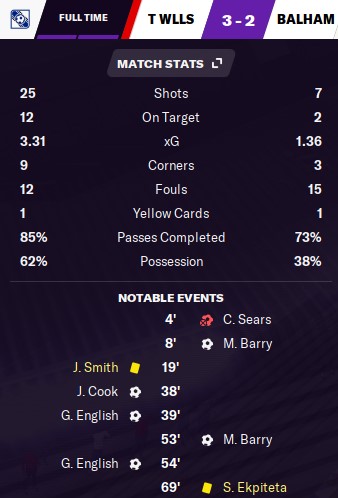 How the whole game played out. After the game I didn’t want to cast too much doubt on anything. I was happy to take our win, it was a valuable three points that saw us rise a couple of places in the league, but fullback is turning out to be a real concern. I began to think about a tactical change that could harden us up out wide in defence, but considering the tactic got us a couple of wins I realised I couldn’t change things up again. I began to think back to our trialists, and just had to hope someone would show up pretty soon. Especially as after two home games we were on the road again, and I’d have to see how the players fared in the pit of another team's ground.
|
|
|
|
Superstars Everywhere We were all standing around in the dressing room, after clocking up another win—this time against Balham—when something I didn’t expect happened. Mr Laws strode into the dressing room with a big bottle of champagne, a double size one. I was trying to go over the team performance, letting the lads know they’d really shown they can put together two games in a row, when he set the bottle down in the middle of the floor and told the lads to come gather around. 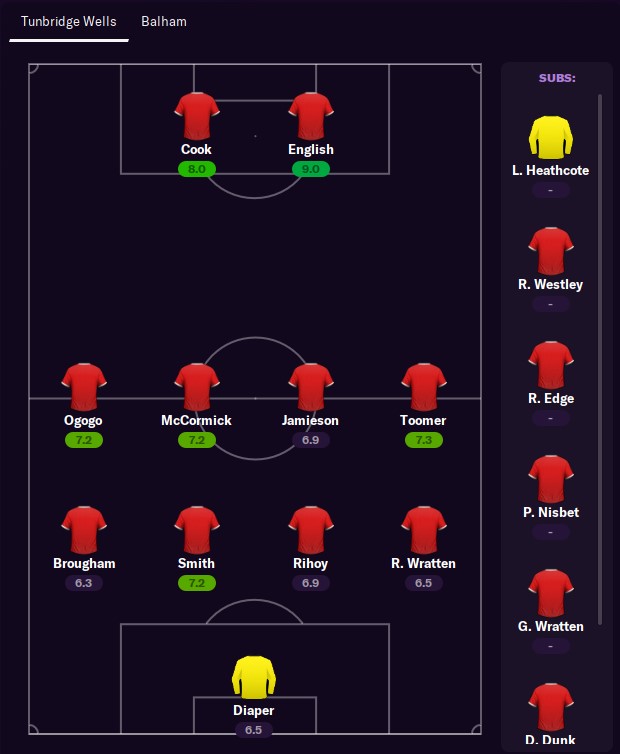 How the team performed against Balham. I was wondering if there’d be the usual shake-a-magnum-up and spray it around event, but no-one was making a grab for it. Instead The Fat Man made sure everyone calmed down, repeatedly saying, “Just wait... Just wait...” Once everyone settled he launched into a speech about how it was always his dream—ever since he ‘done his knee’—to be involved in the ownership of a football team. This was the usual self-aggrandising I was used to from him, everything was his dream, all his hard work came together, stuff of destiny, etc. etc. But it turned out he was only, as ever, using my lads as a marketing tool. “I’ve been working hard on this,” he said. “And I know you lads get it from the fans when you’re walking around Tunbridge.” I looked at Louis when he said this, thinking of sending him around The Fat Man’s course to unwind, but Ogogo was just staring at his boots. “So what I’ve done is dedicate a private room for all of you in The Sheep’s Head. The top room, in the attic, just converted. You can relax there, if you get me... And it’s all only for you.” A few smiles raised on the mouths of my team, but I didn’t buy it. “Can we use it exclusively for team bonding?” I asked. “Some display boards, tactic sheets, maybe some video sessions?” I knew we didn’t have time for video sessions, but I wanted to press him. “Team bonding, of course,” The Fat Man said, but his tone was entirely dismissive. “And community outreach. Yes, community outreach. A very glamorous room it is. It’s very important we’re a community team. So there’ll be some of the most influential Kent business men and trendsetters with access as well. No boards. Nothing like that. Very glamorous. It’s going to be a place for those who need respite from the... You know? You know... The...” And I knew exactly what he meant. It was a place for my team to get away from the pressures of ninth tier football, while also being on show for The Fat Man’s buddies as his personal pets. “Of course, Louis used the golf course the other day,” I said. “Yes, yes. He did. He did... And there’s a discount on club rental for any Tunbridge Wells player who wants to get a round in. Anyone who scor—” “Yes. A 90% discount on golf bats,” I said. “And two free rounds a week. For starters, goal scorers, and anyone in the squad,” and then I really pushed it, “Or any staff member. Just so it doesn’t feel like we’re playing favourites.” The Fat Man had already begun to slink out the door as I mentioned a 90% discount, and at two free rounds a week all he managed to say was, “We’ll sort it out in the next weeks.” He seemed to catch himself, though, and took a step back into the room saying, “Tonight is the launch of the club. Soft launch anyway. Just to bed everything down.” “The players’ room?” I asked. “Yes. The players’ room, and some, eh, others,” his voice rose and became more commanding when he said, ‘others,’ then he continued like nothing had changed. “And I expect to see you all there. And enjoying yourselves.” However, unlike me, my team were convinced, with them all cheering, and then they made a lunge for what I was sure was a Lidl bottle of champagne, not the Mumm he drank himself. Of course, I skipped his ‘Grand Opening-Soft Launch’ settling instead for a quiet night with a six pack of Imperial Stouts, but when I arrived back to my apartment and checked my computer there was an email waiting for me. Bowers and Pitsea had made on offer on Michael Jones, even though he was out with an injury. And it was a stunning offer, one that left me with only one course of action. They wanted him for the grand sum of £0 with zero clauses, and no add-ons. I immediately refused. It could be worth getting his £180 a week wages off the books, but for no money in the process? They were having a laugh. Waking the next morning the press must have gotten a hold of my rejection, because Maria had forwarded me an article. Bowers and Pitsea manager Ben Reeves had leaked the info, saying the deal wasn’t happening, but I knew it was just trying to put pressure on me and unsettle Jones making him demand a release.  The article the Bowers & Pitsea boss leaked trying to upset Michael Jones and pressure me to release him. That did get me thinking. Martyn Barry had single handedly kept Balham in the match against us. He had skill I’d not seen in any of our games, and would be a star for any team he played for. We had three strikers on the books, but if other teams were determined to get Jones, then we might need someone who could come in once his £180 a week were cleared. I got onto our chief scout, and told him to follow around Balham and Barry for three or so matches, just to get an idea of what he was like, and whether his performance was a blip. I already knew he could slot goals from anywhere, and he had a bit of pace, but what was the rest of his game like. 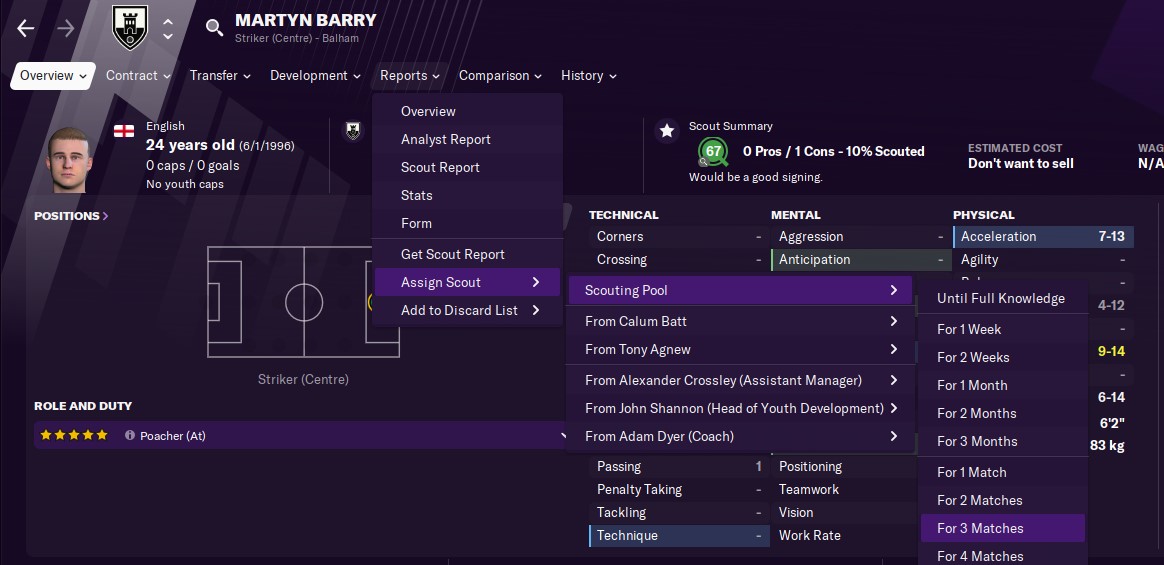 Telling my scouts to get eyes on Balham’s Martyn Barry. It wasn’t long after sending a text to Callum Batt that he was back onto me. I picked up after a few rings, luckily hearing it while I refilled the petrol on the mower. “Boss, I’m not one to question your wisdom, but there is something I do already know about that guy Barry.” “Go on,” I said. “Injury history is it?” “No, nothing like that. It’s his wages. It only took a few calls but he’s earning a fair old wedge.” I explained my plan, how if Jones was taken off us we might have room for Barry; £200 or so out meant I could stretch to spending £200 on a player who can get two goals from nothing, when Callum put a dent on my scheming. “Barry’s on £350 a week,” he said. “You’re joking!” “No. Confirmed. Tied down until next summer. £350 a week. They’d probably want a sizeable chunk of cash to get him, and then Barry’d want an increase in his wages to move.”  Barry earning a fair old wage already, and would want even more to come to us, never mind the transfer fee. “That’s a bit of a gut punch,” I said. “I just thought you’d want to know. I can still scout him, but I want you to have all the info first.” I knew Barry was pretty much beyond us at that point, but I still liked a lot of what I saw from him. What it meant was that if I signed him I’d pretty much be unable to bring anyone else in, even assuming Jones was taken off our books. “Leave it for now,” I said. “We’ll see how things shape up over the next few weeks.” “Right, boss,” Callum said. And that was that. I returned to mowing grass and considering how getting goals was our goal, but even if we kept what we had in the team at that moment, any injuries and we were screwed. We definitely needed two full backs with those positions being the poorest performing on the pitch. And, if anyone took an interest in one of our amateur players I needed the ability to offer a proper contract to them to keep the team together. It looked like Barry was beyond us, no matter how good he was. Then it was time to turn my attention to our next game; we were facing Deal, in an away tie. Callum didn’t mention it on the phone, but there was an email waiting for me once I got into the office. Our scouts were still having difficulty putting together reports on formations; there just wasn’t the info available to get a good grasp on teams. I had to hope that as the season progressed we’d be able to build our own bank of data and be able to figure out how our opposition were lining up. The whole scouting and analyst team did put there heads together, though, and managed to at least figure out that Deal were likely to play a Tiki Taka plan. It was ambitious for our level, but from what I remembered that was the system most likely to beat us; maybe they had more info on us than we had on them. 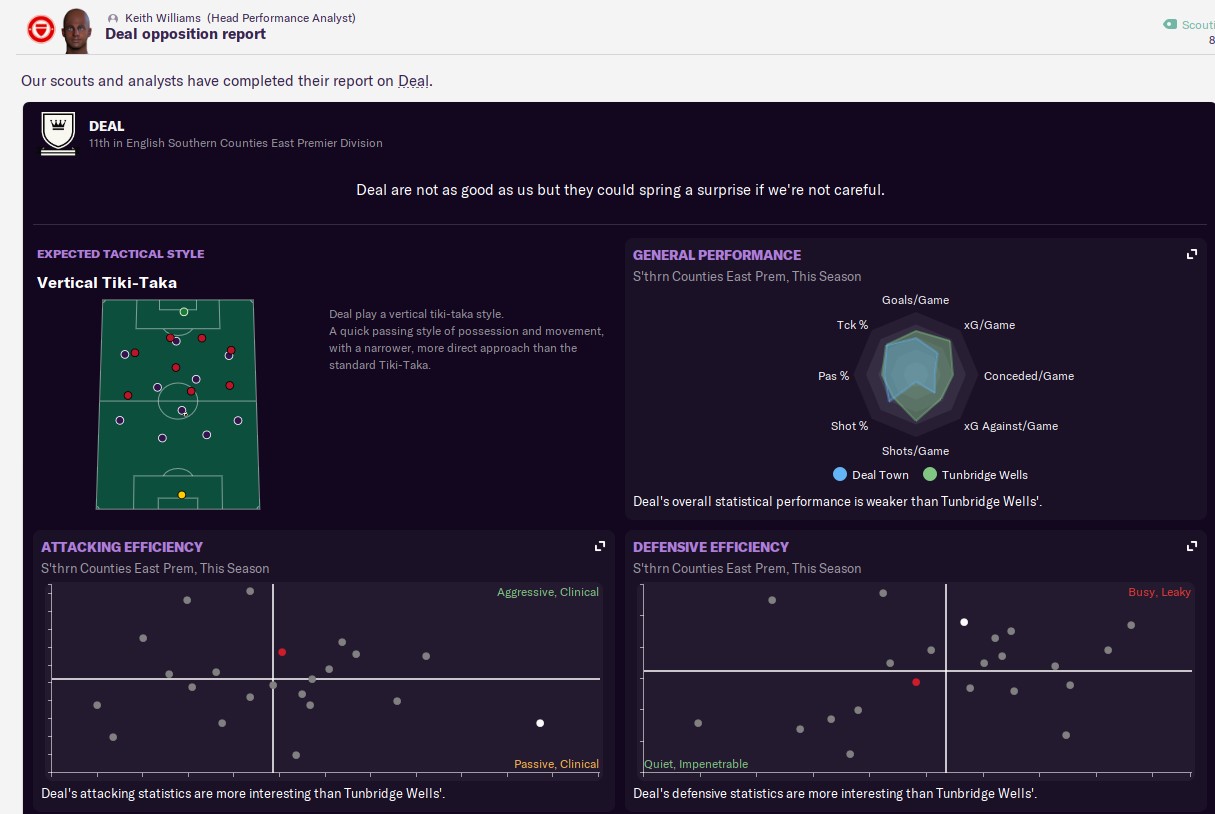 The data the scouting team did manage to put together. In the stats pack there was enough to show we were creating more and scoring more than Deal, which, at the least, was encouraging. I knew I wouldn’t be changing anything going into the game. No-one was going to be rested, there was going to be no tactical changes—except, maybe, pushing our defensive line just a little higher—and the team had to go out and prove that they could be consistent. On the evening before the game I went to the afternoon papers; I was used to seeing us, “Facing the Impossible,” but for once the journalists and bookies gave us a chance. I didn’t know if this was a good omen or not, we’d done well against the odds in our previous games, but it seemed the only thing distancing us from an even shout was the fact we were away from home. 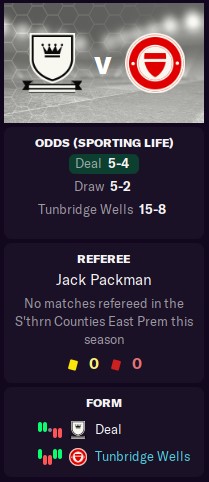 Our odds, for once, had us with a chance. What’s more, Deal had lost the last two of their games. It might mean they were on a slide, or it could mean they’d be looking to set their course straight again and take a three-in-a-row win away from us. Whatever happened, I settled into the evening really anticipating the match, the first time I’d been like that—with real eagerness to see how good we could be—all season. There was only bits and bobs for me to manage before the trip to Deal the day after.  We signed another physio, hopefully stopping our shallow player depth from getting injured. With a final note that we’d secured a second physio, hopefully meaning we’d be better prepared to prevent injuries, so sparse was our backup, I lay down to bed wondering how far we could go if the team performed as I knew they were able.
|
|
|
|

|
| # ¿ May 11, 2024 12:12 |
|
With our match against Deal I knew it was time to take a real crack at the league. We’d had some wins under our belt—proper, solid wins—and getting three points in this match, then the next, would surely see those ahead of us make a few mistakes and bring us right into contention. We might not be able to win the division, but we could hover about near the top.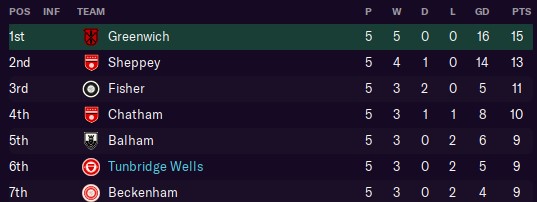 Where we were in the league after five games played. I made no changes to the squad facing Deal; hoping to continue our run. I did tell the defensive line to push a little forward, noting the effect it had against Balham, but I had no clue how this would fare against a team that liked to dominate possession, especially as we were away from home. The only other worry was Simon McCormick still couldn’t get his recovery correct and was showing some tiredness. Still, I felt the same starting eleven, with some changes during the game as needed, would see us perform at our best. You can react to circumstances and problems, but keep going when you’re winning. 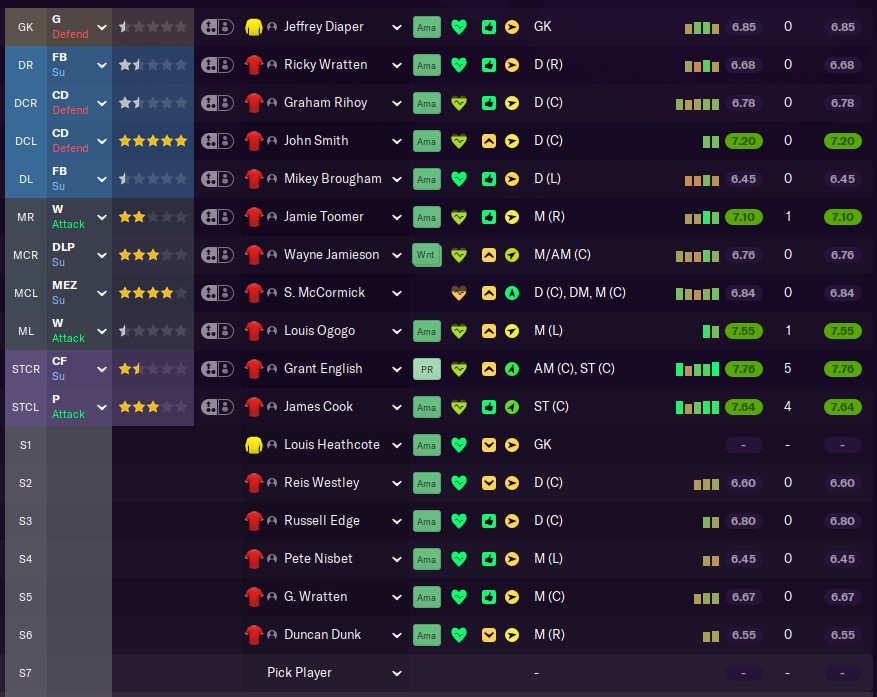 The team to face Deal. For once the bookies didn’t have us too far behind, and reflecting this Alexander encouraged me to get the team playing with a more positive mindset. I was unsure on this, our cautious approached worked well against what was supposed to be better opposition, but maybe a bit more balance in how we set up was the right course of action. Knowing I had to take some advice in what I did—that I didn’t know everything (or even anything)—I told the lads to do exactly that, play with a bit more balance. Take a few risks when they could, but not be all attack or all defence. I just knew I’d have to be quick to make adjustments depending on how the game played out. 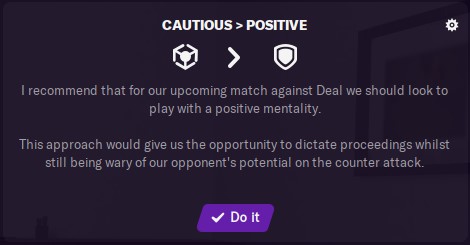 Alexander saying we should push forward a bit faster in our outlook. The players were all focused before the game, still in their own worlds in the lead up, and nothing I said had much effect on them. Then, when the game kicks off we win a throw in with just two minutes gone and Toomer carries the ball on his toes into the box. It rebounds to Ricky Wratten, who fires off a shot, but it hits the outside of the post for a goal kick. I begin to wonder if our full backs will pick themselves up in this game. If they’ll finally have a good showing against however Deal set up. Or whether it’s time to adjust the role they play in the game. I know they’re sitting very wide, and a little deeper, waiting to cross balls in. I’m just not sure how to bring them in as more active, or if doing so would expose us at the back. 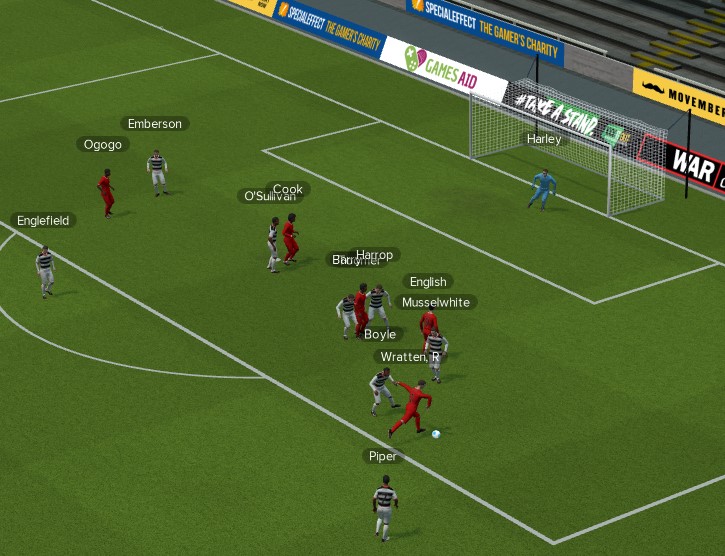 Our full back Ricky Wratten getting in a shot. Six minutes pass and I notice Deal are pushing very high up. We manage to play out from the back, with one or two medium balls forward, and it gets out wide. The ball is sent in on a cross to English and Toomer waiting for it where Toomer gets a header on goal. It’s saved, but it’s telling me a lot about the game. Deal are really trying to put us under pressure, and they’re sure to have chances, it’s just a case of who holds out, whether we deal with their press or if they can keep up with their intensity at the front and quick runs back to defend. 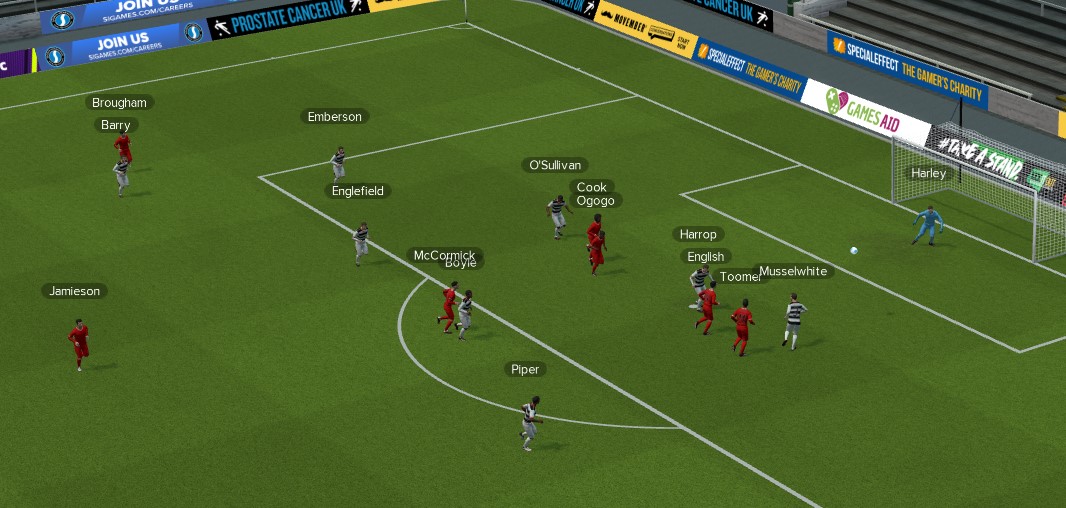 Toomer with a header on goal that’s saved. It’s another case of Deal pressing us at the back, but we manage to get past them with a long wide ball. Deal, however, manage well and get players back. They’re playing a 442, just like us, and I’m not sure it’s the best tactic for their control possession play. Still, it’s now up to us to break them down with the ball in their third. We string a few passes together before the ball is sent in to English. I feel he has no hope, the box is crowded, but he pulls the trigger on a great shot and scores. With 13 minutes gone we’re one nil up and I’m wondering if this will bring a reaction from Deal. 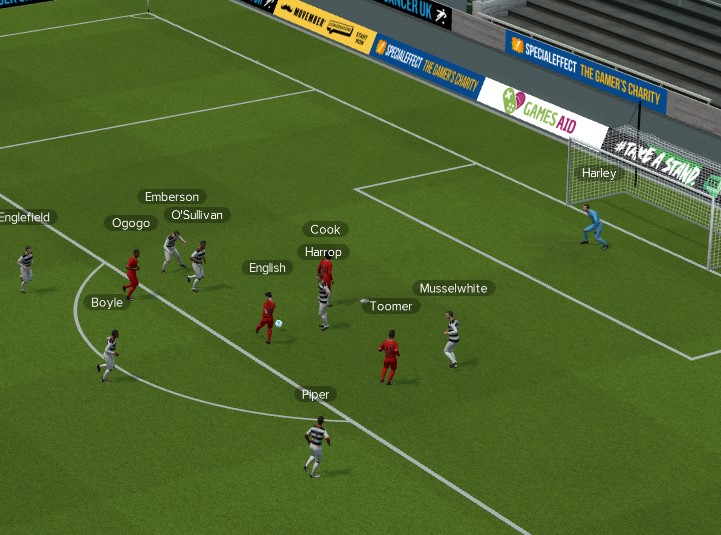 English in a packed box, but with a great goal. There’s a long way to go with just 13 minutes played, but we’re 1-0 up. We get another attack, but it comes to nothing but a goal kick for Deal. They send the ball long, knocking it on a second time, and Deal’s Bloom gets behind Smith who totally misses the header clear. Bloom is running on goal, with Rihoy desperately getting back. Bloom fires a shot, but it’s straight into Diaper’s hands. We were lucky with that one. Whatever about Smith’s talents, especially in captaining the backline, he’s still liable to make the odd few mistakes in a game. 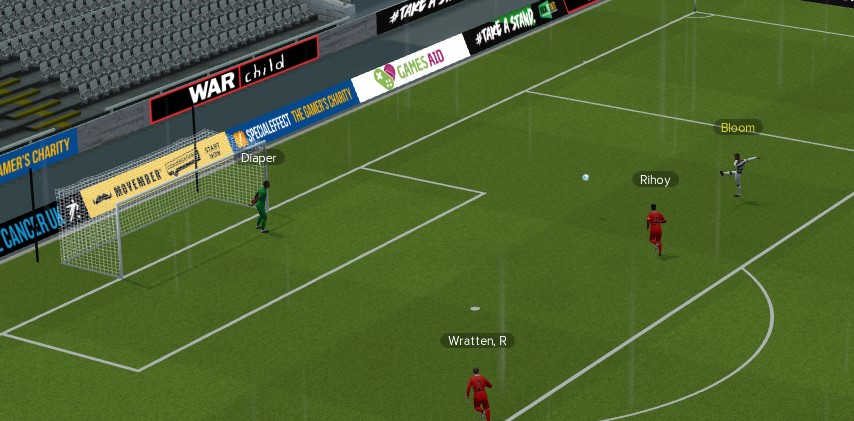 After 25 minutes I’m thankful Deal’s Bloom only manages a shot straight to Diaper’s hands. With a play involving everyone on our left wing combining with McCormick in the middle, a ball is sent straight down the centre of the park to English, who has a clear shot on goal. This seems a million times easier than his earlier goal, but he puts it too near the Deal keeper who deals with the shot’s power and parries the ball behind. I was hoping English could strike twice, but it wasn’t to be. 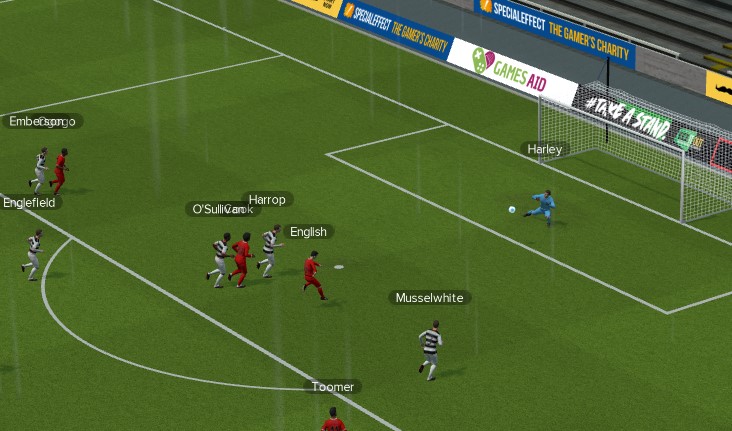 Deal’s keeper deals with English’s powerful shot. Smith wins the ball in the centre circle with a well timed sliding tackle, stopping a quick Deal attack and making up for his earlier mistake. The ball is sent forward to Cook, who lays it back to Ogogo. Ogogo takes a shot from the corner of the box but again one of our strikes hits the post. We’ve had almost all the attacking play so far, and I’m beginning to wonder if I should send the lads forward with a bit more freedom to try to bag a second goal before half time! 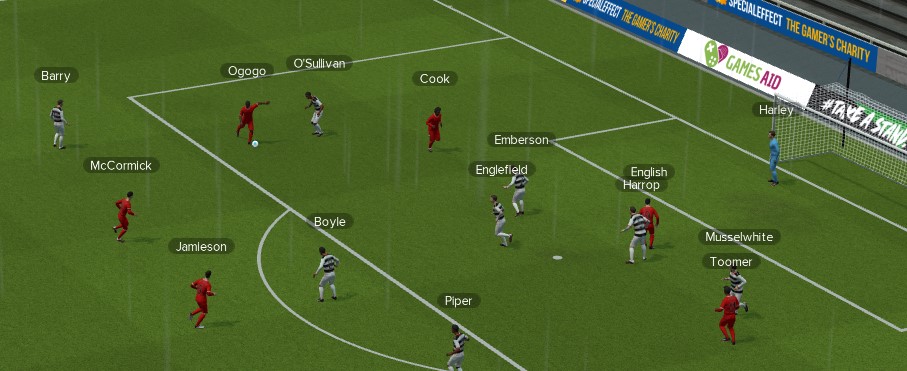 Ogogo with a tight shot from the corner of the box, but it hits the post. I send the boys forward in attack, feeling everything is all that bit too tight in the scoreline while there’s space on the pitch. Toomer gets the ball down the right wing, beats his man, and fires a great ball in to our attacking pair. English doesn’t get on it, but Cook has a perfect header just feet from the goal. He’s beaten the keeper, but somehow manages to send the ball over the crossbar when that’s the more difficult thing to do. I don’t know how he’s missed, and I wonder if this will come back to haunt us in the second half. 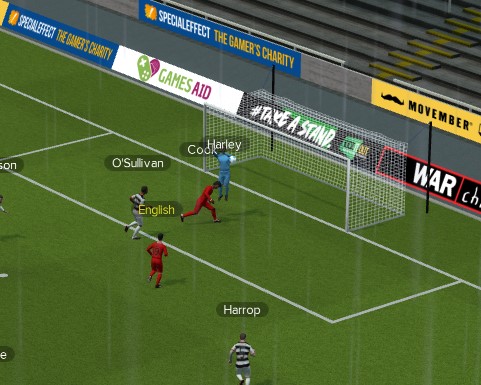 Cook somehow missing! At half time I tell the lads they’re doing well, but capable of playing even better, and they completely ignore me. The rain has been absolutely pouring down for most of the first half, and the guys are drenched. They must be looking at me, under the cover of the dugout, and thinking, “Lucky fucker!” But we’re winning, even if there’s forty five minutes to play, and they have to dig deep. And with just two minutes played in the second half English curves a ball around the defender to land it right in front of Toomer making a quick forward run. He collects it, and takes it into the box, but hooks the ball wide for a goal kick. I didn’t expect him to get the ball, or make it into the box with a defender on him, but the easiest part was the last kick. He’d managed all the difficult parts and then fluffed the last piece of the puzzle. 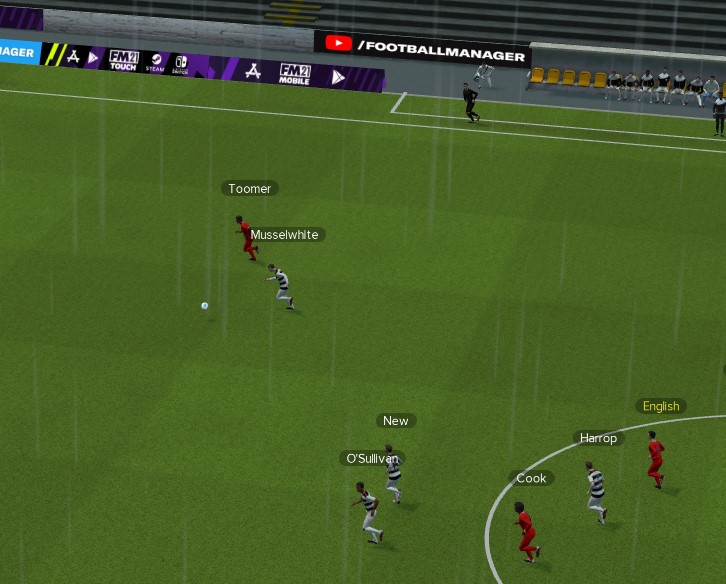 Toomer collects a great ball under pressure, but can’t manage to complete it with a goal. There’s the ball ricocheting back and forth, but a final ball from Deal puts their striker, Bloom, through. Smith makes a last ditch sliding tackle, but I already know the Deal attacker has Smith beaten. I’m yelling for our defence to get back but he doesn’t give them a chance. He takes the strike from outside the box, with the ball flying across the goal, past Diaper, and into our net. It’s one all, and it looks like our lads couldn’t handle being told to be more attacking. 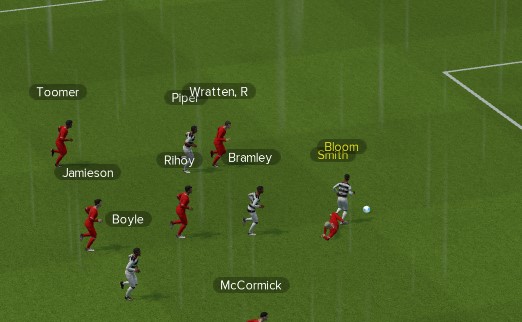 Smith with a last ditch tackle to prevent a goal, but he can’t save us. 1-1. I change us back to a more balanced approach and begin to think about substitutions. I take Smith off for Edge, and both McCormick and Ogogo are looking shagged. I’m wondering how much I can wring out of them when after some build up play outside the Deal box the ball is sent back to Jamieson who’s a little deeper. He spots English in a gap in the Deal defence and places a slider into him. English picks it up, and has his third clear chance of the game. Unlike the last time he makes it count with this opportunity, and he’s two from three, with us two one up. 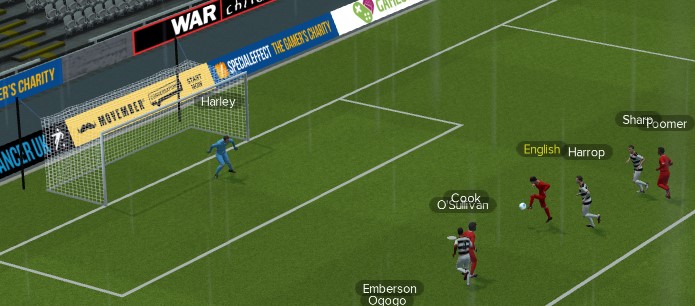 English making his chances count and putting us 2-1 up. A few minutes later I take both Ogogo and McCormick off. I’m left with no choice. The pitch is completely sodden and they’ve run their legs off. I just have to hope the shape of the team maintains itself and we see the game out, but Deal exploit our right wing, with an underperforming Wratten and an exhausted Toomer, sending the ball in for Bloom who fires the ball into the back of the net. It’s two all, or it would be if the linesman didn’t raise his flag. Deal’s Bloom was just offside, according the assistant, and the goal is disallowed. I thought it was tight, but I’ll take it. 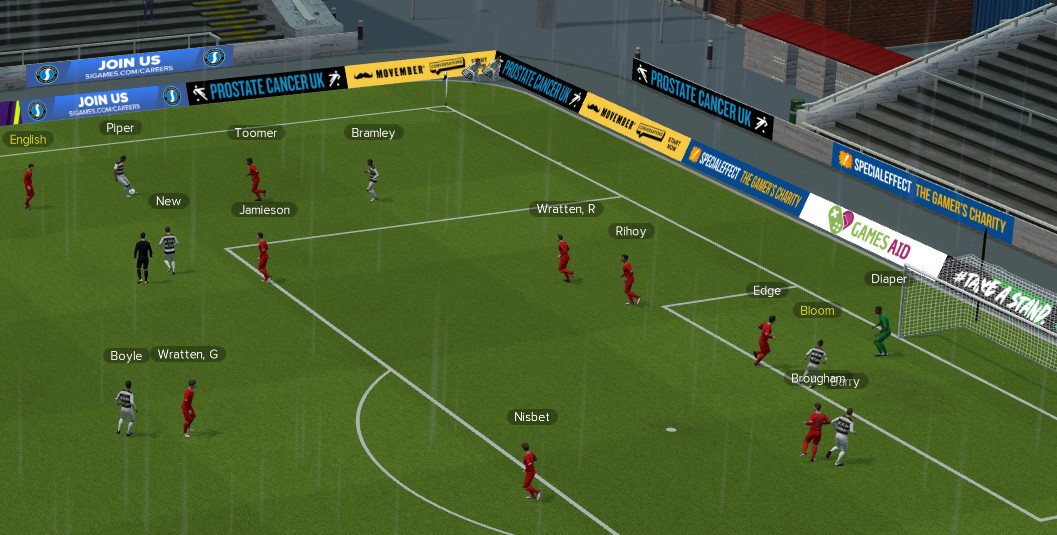 Deal get a goal just about disallowed. With just a few minutes left in the game Deal get a corner. I’m praying my players can hold it together, we’ve not practised many set pieces, and they manage to head the ball clear and up the pitch where Cook picks up on it. He takes it a few metres forward, then sees English running ahead. He sends it up to him, and English brings it to the edge of the box for a strike. They lad would absolutely deserve a hat-trick, but it’s not to be.  With a few minutes left English can’t get his hat-trick. There’s a minute left in regular time and Deal play the ball down the wing. Centring it they hold the ball up and I think it’s given us time to get our defence set, until I see Deal’s Barry peel off. The ball is lobbed over to him, and if he hits it first time it’s an easy goal. Instead he centres it to his striker, who has an even easier squared-ball shot, but Edge—who I brought on for Smith—does magnificently in getting his foot in the way. There’s one minute plus injury time left, and I’m just hoping the ref blows this up early. 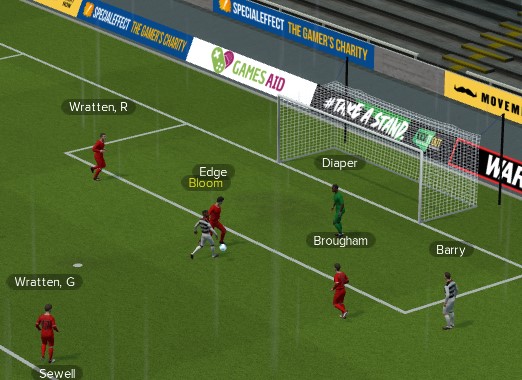 Edge showing it from the bench with a great last second block. But, I begin to doubt my desire for an early end with a minute of injury time played. We get a quick break on, and not content with scoring two goals English wants to create one as well. The ball is played into him from out wide where he runs almost 25% of the pitch with it as his feet, and there’s two men running on either side of him. Toomer is to the right, but Graham Wratten is clear on his left. English takes the easier, and better, option, laying the ball off to Wratten, and in injury time we go three-one up with Wratten’s first ever goal for us. Surely, now it’s all over. 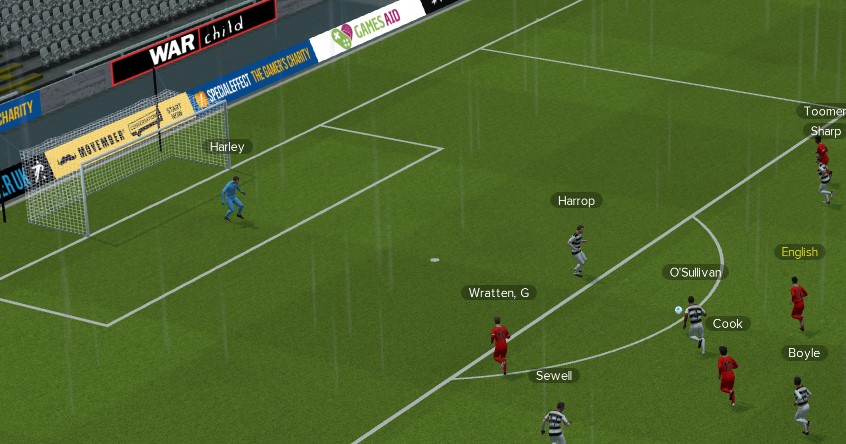 Wratten with a great run, bagging his first goal for us. And it is all over, despite Deal getting a final attack the ref blows it up. We’ve won three-one, beating out a Deal side that tried very hard. Looking at the stats I’m a little annoyed that it took so long to really wrap things up, but all I can say to the lads is they did really well. 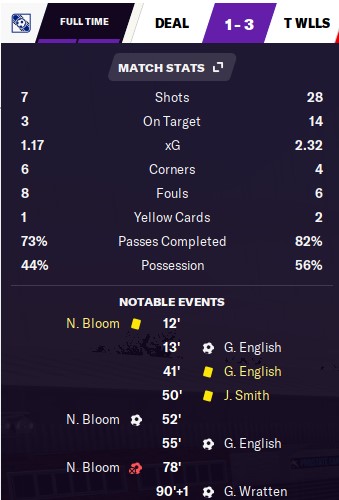 The stats would show we had a far easier time of it than we really did. Sporting Life sum up my reaction, it was an absolute masterclass from English. 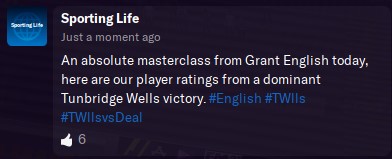 Sporting Life’s take on the game And with six games played, we’ve now won more than half. The question is will other teams get wise to us, with the season now in full swing.  Our league stats with six games played.
|
|
|




